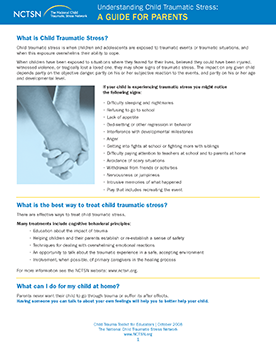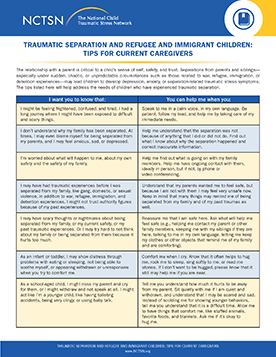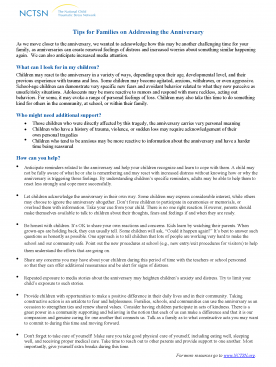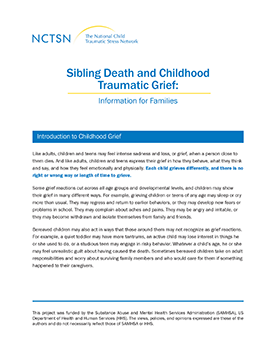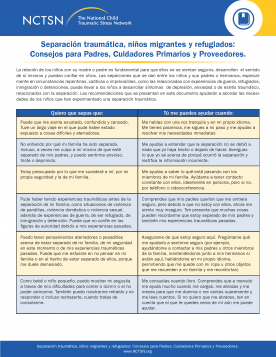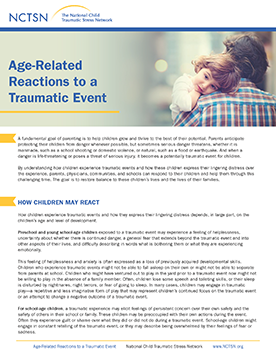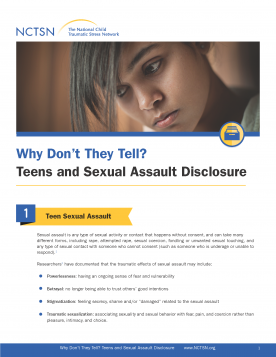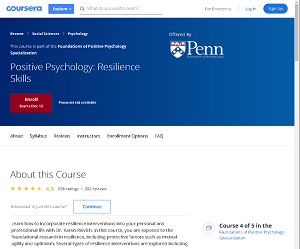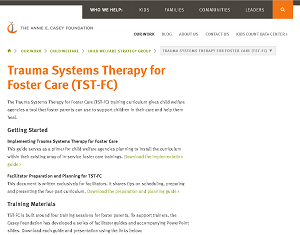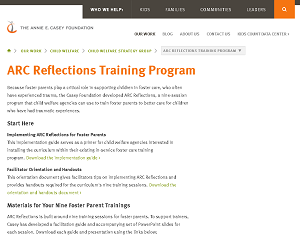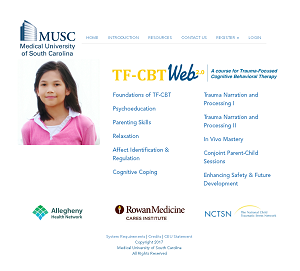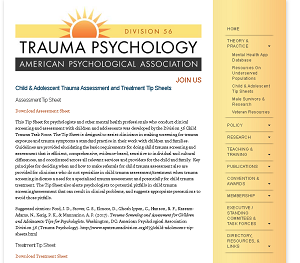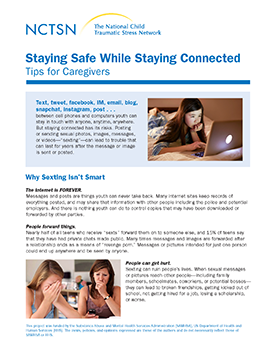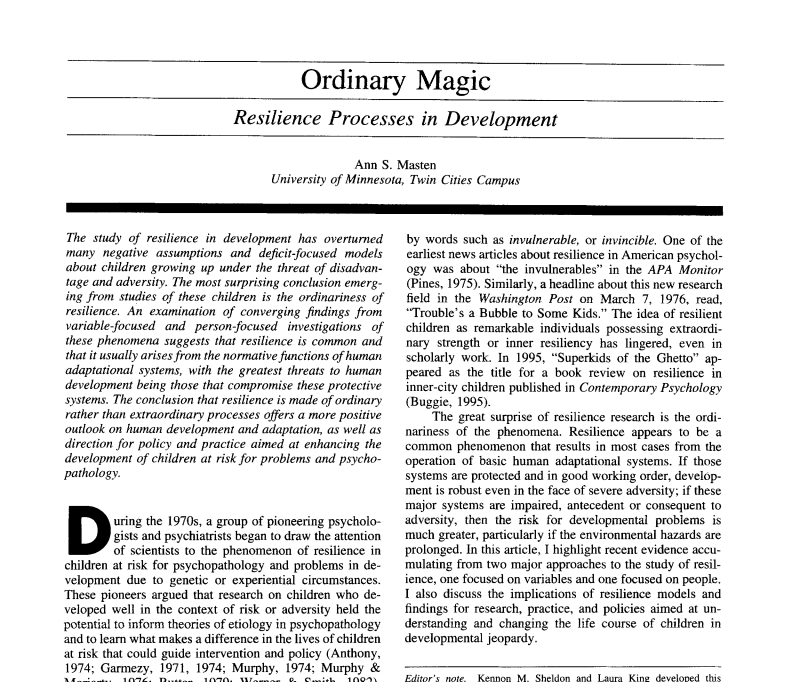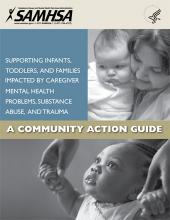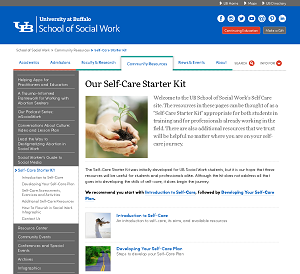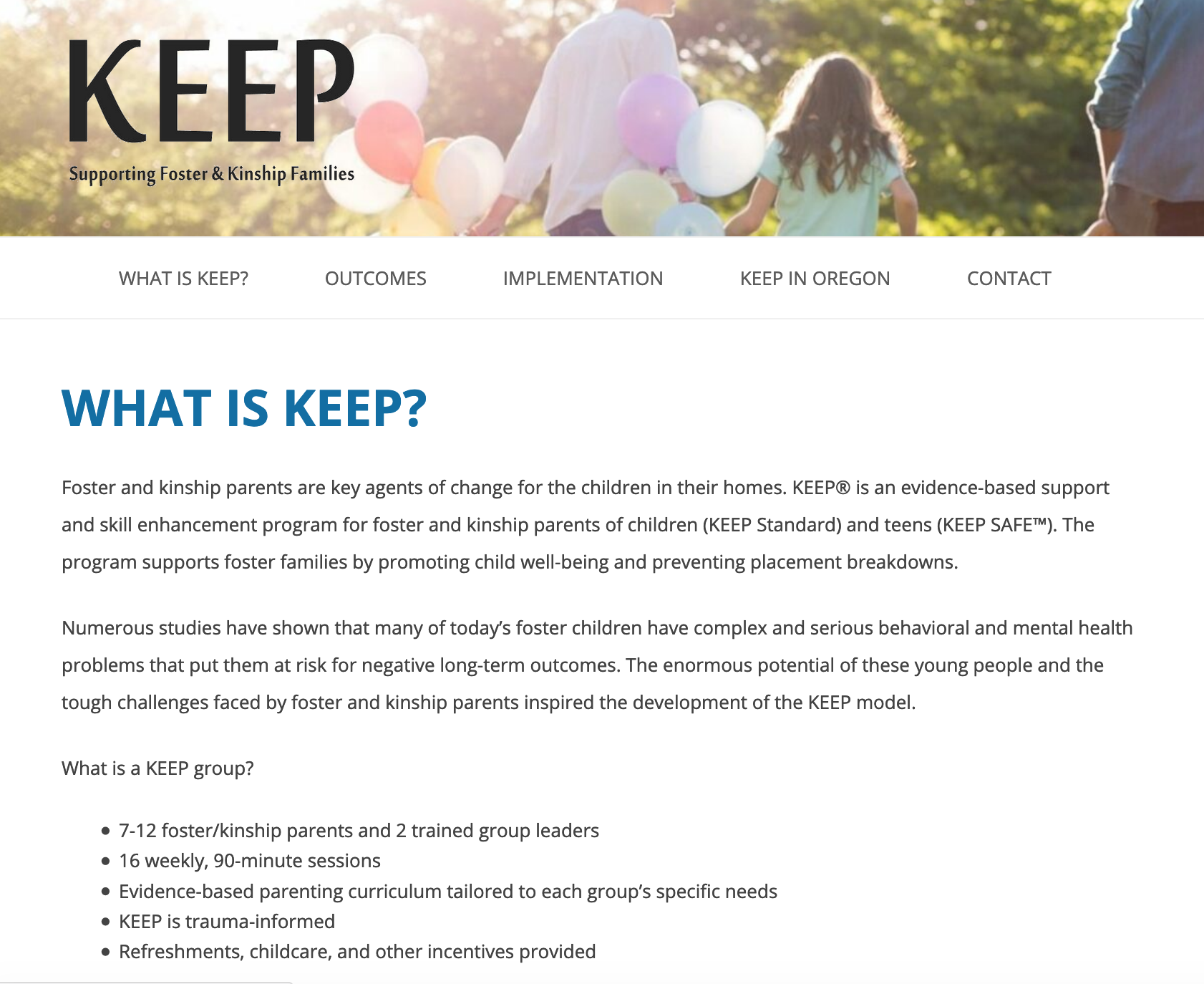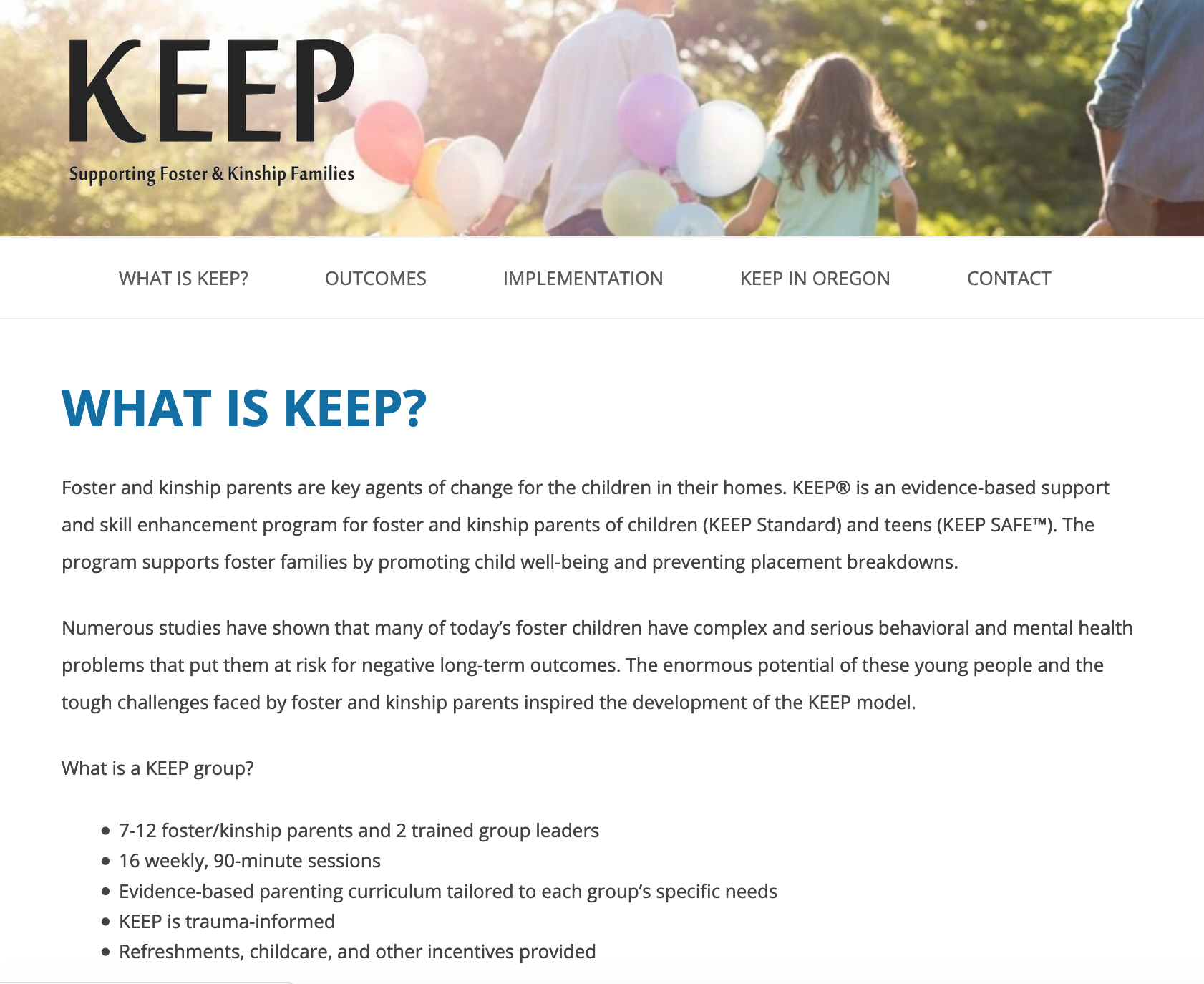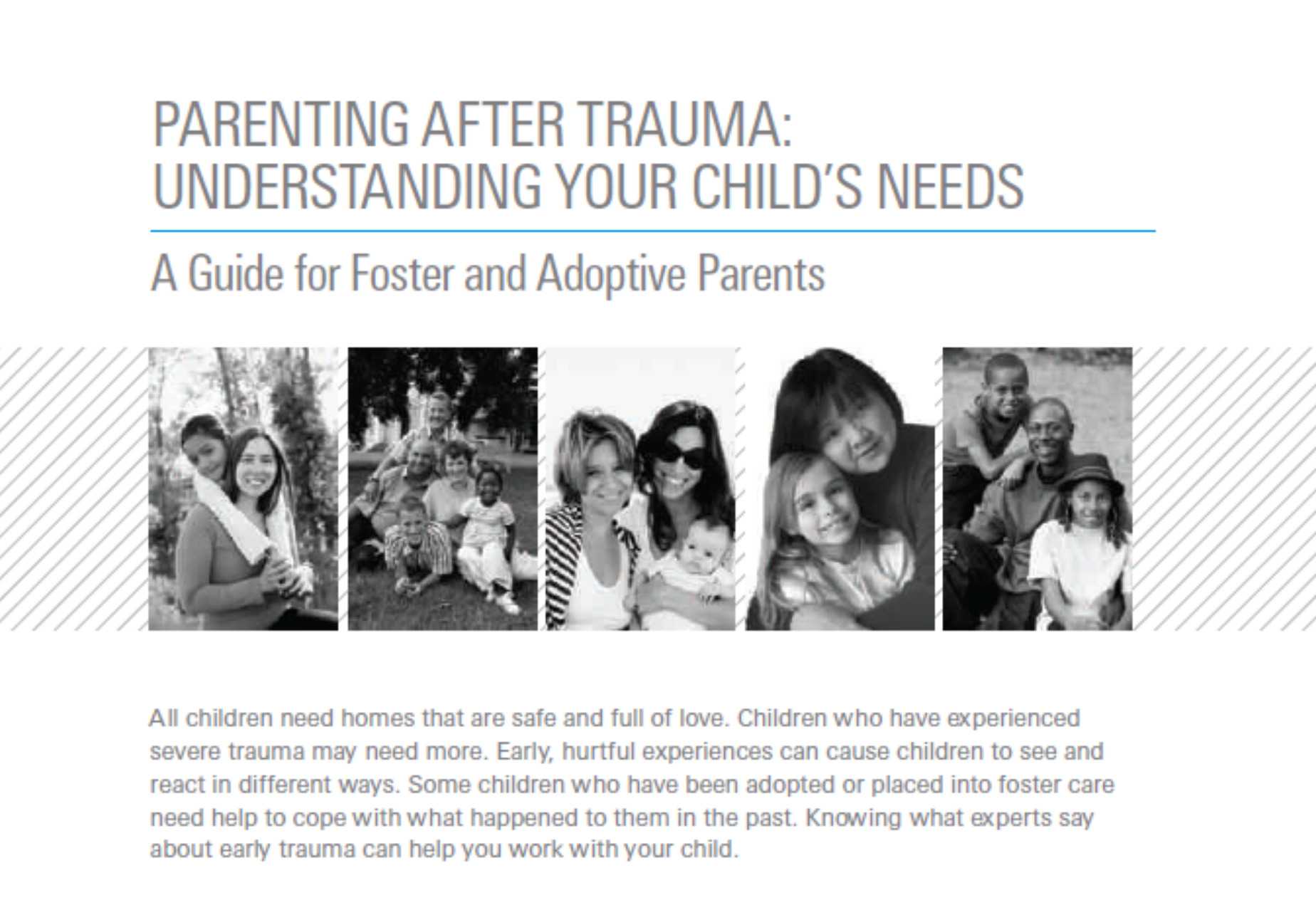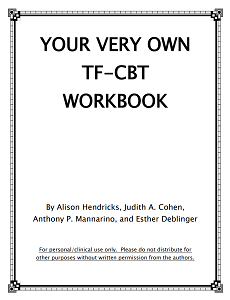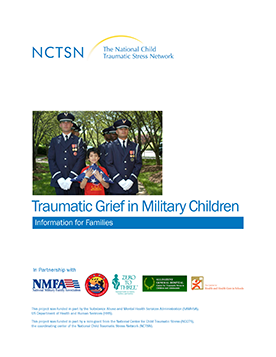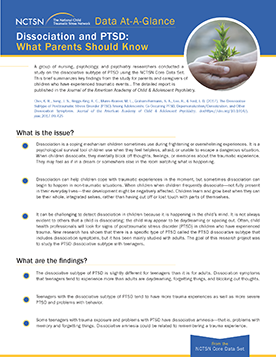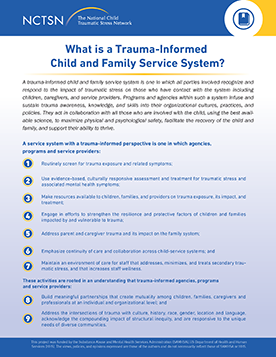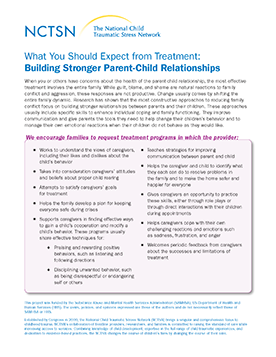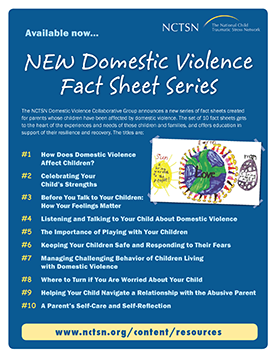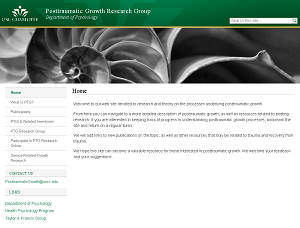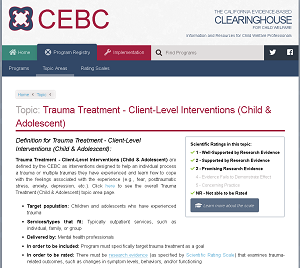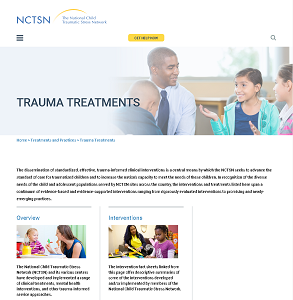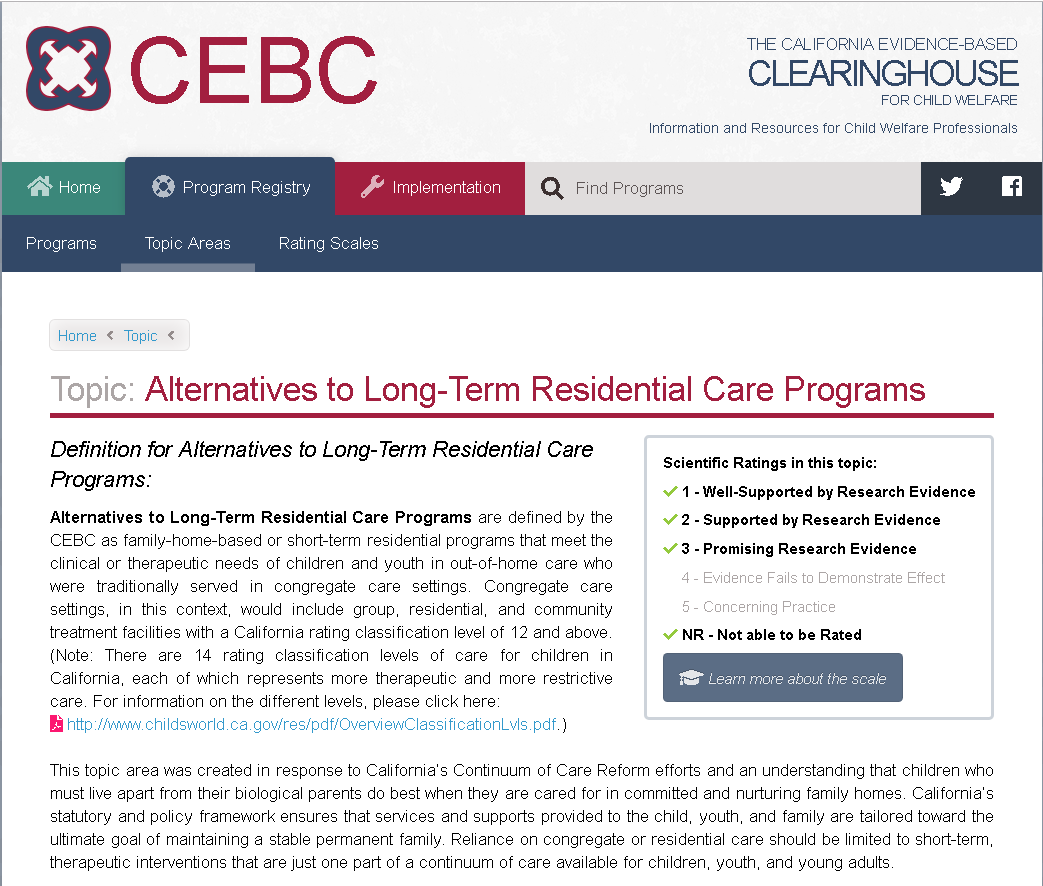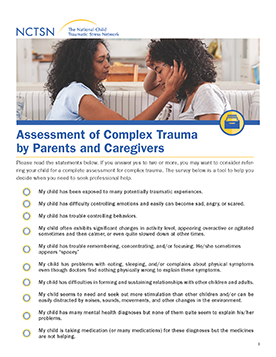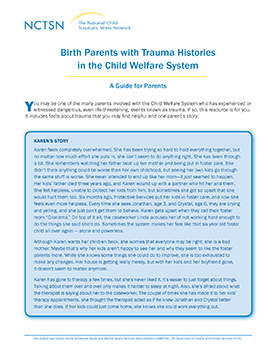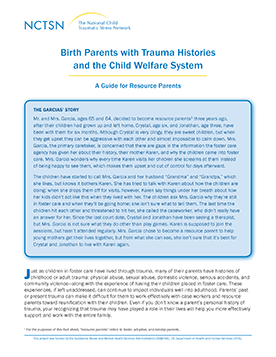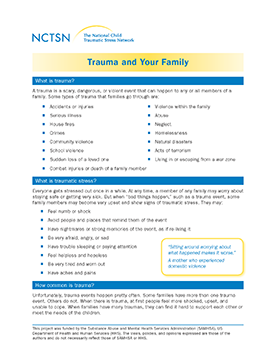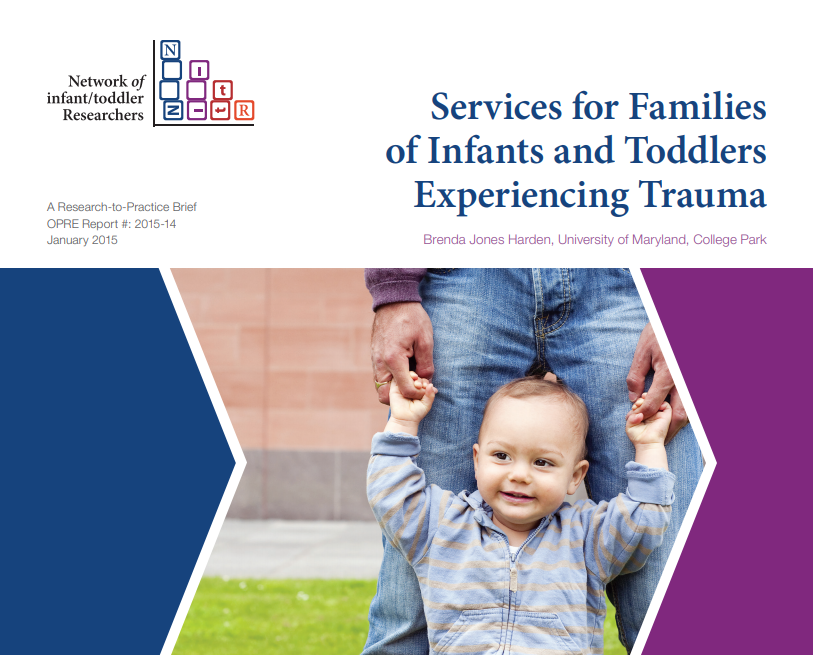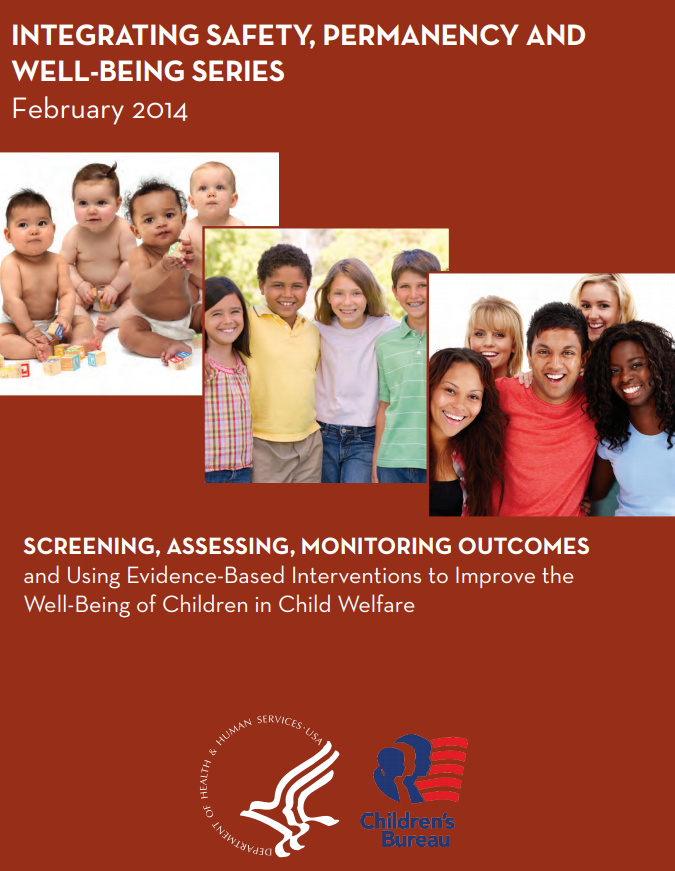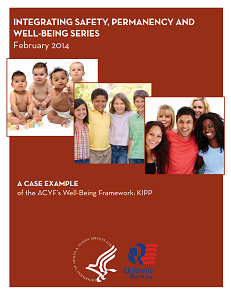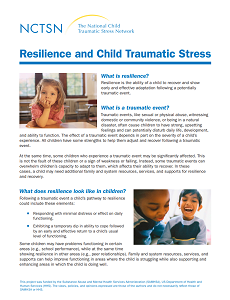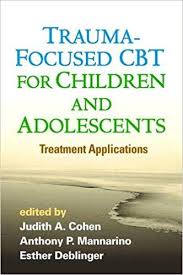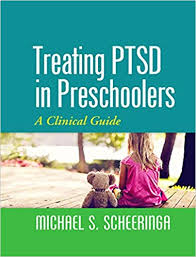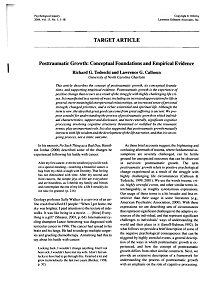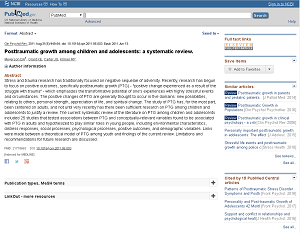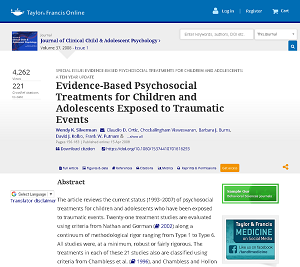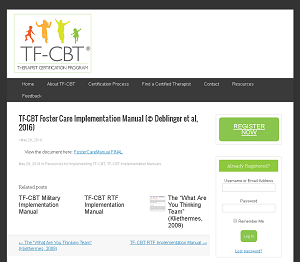-
Parenting after trauma: Supporting parents and caregivers in the treatment of children impacted by violence
Promoting Child & Youth Growth, Well-Being & Resilience
Infant Mental Health JournalBehavioral HealthThis article advocates for the critical involvement and support of caregivers in treatment for children and youth exposed to violence
-
Understanding Child Traumatic Stress: A Guide for Parents
Promoting Child & Youth Growth, Well-Being & Resilience
National Child Traumatic Stress Network (NCTSN)CaregiversThis fact sheet discusses tips for caregivers on ways to support children following traumatic stress and how to get support from the school.
-
Traumatic Separation and Refugee and Immigrant Children: Tips for Current Caregivers
Promoting Child & Youth Growth, Well-Being & Resilience
National Child Traumatic Stress Network (NCTSN)CaregiversThis tip sheet provides tips for current caregivers and others to help address the needs of immigrant and refugee children who have experienced traumatic separation. It outlines what children of different ages might be experiencing and how caregivers and others can help.
-
Tips for Families on Anticipating Anniversary Reactions to Traumatic Events
Promoting Child & Youth Growth, Well-Being & Resilience
National Child Traumatic Stress Network (NCTSN)CaregiversThis tip sheet offers parents and caregivers information about ways that children may respond to the anniversary of a traumatic event. This tip sheet tells parents about what to look for before the anniversary of an event, who might need special support, and how they can support their families.
-
Sibling Death and Childhood Traumatic Grief: Information for Families
Promoting Child & Youth Growth, Well-Being & Resilience
National Child Traumatic Stress Network (NCTSN)CaregiversThis fact sheet provides information about particular grief reactions that a child may have when a brother or sister dies, and provides tips to help the grieving child.
-
Separación Traumática, Niños Migrantes y Refugiados: Consejos para Padres, Cuidadores Primarios y Proveedores
Promoting Child & Youth Growth, Well-Being & Resilience
National Child Traumatic Stress Network (NCTSN)CaregiversThis tip sheet, offered in Spanish, provides tips for current caregivers and others to help address the needs of immigrant and refugee children who have experienced traumatic separation. It outlines what children of different ages might be experiencing and how caregivers and others can help.
-
Trauma Focused Cognitive Behavioral Therapy (TF-CBT) for Children Affected by Sexual Abuse or Trauma
Promoting Child & Youth Growth, Well-Being & Resilience
Child Information GatewayCaregiversThis document provides information on TF-CBT, an evidence based treatment for childhood trauma exposure. Describes the research base, key components of TF-CBT, information about what to look for in a therapist, and questions to ask treatment providers.
-
Age-Related Reactions to a Traumatic Event
Promoting Child & Youth Growth, Well-Being & Resilience
National Child Traumatic Stress Network (NCTSN)CaregiversThis document discusses different ways children react to trauma at different developmental periods. and provides information on how parents and caregivers can support children who have experienced trauma.
-
Parenting a Child Who Has Experienced Abuse or Neglect
Promoting Child & Youth Growth, Well-Being & Resilience
Child Welfare Information GatewayCaregiversThis fact sheet for families provides information about child abuse and neglect, the effects, and ways to help children heal.
-
Why Don't They Tell? Teens and Sexual Assault Disclosure
Promoting Child & Youth Growth, Well-Being & Resilience
National Child Traumatic Stress Network (NCTSN)CaregiversThis fact sheet outlines why teens don't disclose sexual assault and how to support teens after disclosure of a sexual assault.
-
Positive Psychology: Resilience Skills
Services to Promote Growth, Well-being & Resilience
CourseraGeneralTaught by Karen Reivich, Ph.D., this module goes over the definition of resilience and the protective factors that make one resilient.
-
Trauma Systems Therapy for Foster Care (TST-FC)
Services to Promote Growth, Well-being & Resilience
The Annie E. Casey FoundationChild WelfareTST-FC training curriculum is available online without charge. It provides child welfare agencies with a tool to help caregivers recognize and meet the needs of children and youth who have experienced trauma
-
ARC Reflections Training Program
Services to Promote Growth, Well-being & Resilience
The Annie E. Casey FoundationChild WelfareThis is a free nine session program that child welfare agencies can use to train foster parents to better care for children who have had traumatic experiences
-
Trauma-Focused Cognitive-Behavioral Therapy (TF-CBT) Web
Services to Promote Growth, Well-being & Resilience
Medical University of South CarolinaGeneralThis is a free online course that goes over the foundations of TF-CBT.
-
Parent-Child Interaction Training (PCIT) for Traumatized Children
Services to Promote Growth, Well-being & Resilience
UC David Children’s HospitalBehavioral HealthThis free web course is designed mainly for therapists interested in implementing PCIT with traumatized populations; however, it is also applicable to the general public interested in learning about and sharing information about PCIT.
-
International Society for Traumatic Stress Studies (ISTSS) Online Learning Library
Services to Promote Growth, Well-being & Resilience
International Society for Traumatic Stress Studies (ISTSS)GeneralThis online learning library contains a variety of courses from experts in the field of traumatic stress.
-
Child and Adolescent Trauma Treatment Tip Sheet
Services to Promote Growth, Well-being & Resilience
Division 56 Trauma Psychology American Psychological AssociationBehavioral HealthThis tip sheet offers information and recommendations on implementing trauma treatment for mental health professionals.
-
Trauma Informed Parenting: How to Talk Trauma with an MD
Promoting Child & Youth Growth, Well-Being & Resilience
National Child Traumatic Stress Network (NCTSN)CaregiversThis 30 minute webinar offered through the Learning Center of the NCTSN offers suggestions for resource parents and pediatricians to see child behaviors through a trauma lens.
-
Staying Safe While Staying Connected- Tips for Caregivers
Promoting Child & Youth Growth, Well-Being & Resilience
National Child Traumatic Stress Network (NCTSN)CaregiversThis tip sheet provides information for caregivers on safe internet behavior for youth.
-
Ordinary magic: Resilience processes in development
Promoting Child & Youth Growth, Well-Being & Resilience
American PsychologistGeneralThis website is devoted to research and theory on the processes underlying posttraumatic growth.
-
Supporting Infants, Toddlers, and Families Impacted By Caregiver Mental Health
Promoting Child & Youth Growth, Well-Being & Resilience
Substance Abuse and Mental Health Services Administration (SAMHSA)GeneralThis action guide discusses the importance of early development and ways to build and foster resilience among young children through a community approach. The guide provides a six-step road map for implementing changes within your community.
-
Self-Care Starter Kit
Promoting Child & Youth Growth, Well-Being & Resilience
University at Buffalo School of Social WorkGeneralThis website offers self-care resources for students and professionals engaged in the helping field to enhance well-being across domains of life.
-
KEEP
Promoting Child & Youth Growth, Well-Being & Resilience
KEEPChild WelfareKEEP is an evidence-based support and skill enhancement education program for foster and kinship parents of children’s and adolescents. The goal of KEEP is to reduce placement breakdowns by offering training on research-based parenting techniques.
-
Keeping Foster and Kin Parents Supported and Trained (KEEP)
Promoting Child & Youth Growth, Well-Being & Resilience
KEEPChild WelfareKEEP is an evidence-based support and skill enhancement education program for foster and kinship parents of children’s and adolescents. The goal of KEEP is to reduce placement breakdowns by offering training on research-based parenting techniques.
-
Trauma-Informed Parenting: Supplemental Resources
Promoting Child & Youth Growth, Well-Being & Resilience
National Child Traumatic Stress Network (NCTSN)CaregiversThis document offered through the Learning Center of the NCTSN brings together concise tip sheets for parents on trauma-informed parenting. Accessing this resource requires a free registration at https://learn.nctsn.org/. Once you have a registration and are signed on you can either use the link on this page or search the name of the resource on the NCTSN Learning Center website to access this resource.
-
Parenting After a Trauma: Understanding Your Child’s Needs. A Guide for Foster and Adoptive Parents
Promoting Child & Youth Growth, Well-Being & Resilience
American Academy of Pediatrics and Dave Thomas Foundation for AdoptionCaregiversThis guide provides recommendations to foster and adoptive parents in responding to children exposed to trauma in safe and healing ways.
-
Your Very Own TF-CBT Workbook
Services to Promote Growth, Well-being & Resilience
Alison Hendricks, Judith Cohen, Anthony Mannarino, & Esther DeblingerBehavioral HealthThis workbook was designed for master’s level or higher practitioners with training in Trauma-Focused Cognitive Behavioral Therapy (TF-CBT). The workbook is intended for use with children ages six to fourteen who have been exposed to traumatic event(s)
-
Building Trauma-Informed Services for Children, Youth, and Parents Impacted by Domestic Violence
Promoting Child & Youth Growth, Well-Being & Resilience
The National Center on Domestic Violence, Trauma, & Mental HealthBehavioral HealthThis is a 10 part webinar series is designed for domestic violence advocates and mental health clinicians. The series goes over practical strategies for supporting survivors and their children.
-
Traumatic Grief in Military Children: Information for Families
Promoting Child & Youth Growth, Well-Being & Resilience
National Child Traumatic Stress Network (NCTSN)CaregiversThis fact sheet provides parents and caregivers with information about traumatic grief in military children, and what a parent can do to help their child as well as themselves.
-
Caring for Kids- What Parents Need to Know About Sexual Abuse
Promoting Child & Youth Growth, Well-Being & Resilience
National Child Traumatic Stress Network (NCTSN)CaregiversThis document is designed to provide information to caregivers to help them support children who have experienced sexual abuse.
-
Dissociation and PTSD: What Parents Should Know
Promoting Child & Youth Growth, Well-Being & Resilience
National Child Traumatic Stress Network (NCTSN)CaregiversThis Data At-A-Glance document outlines research on dissociation and what parents and caregivers can do.
-
Teen Sexual Assault: Information for Parents
Promoting Child & Youth Growth, Well-Being & Resilience
National Child Traumatic Stress Network (NCTSN)CaregiversThis document, designed for caregivers, discusses terminology, frequently asked questions, safety methods, and ways to help teens heal from sexual assault.
-
Helping Teens with Traumatic Grief: Tips for Caregivers
Promoting Child & Youth Growth, Well-Being & Resilience
National Child Traumatic Stress Network (NCTSN)CaregiversThis tip sheet, designed for caregivers, discusses ways to recognize and help teens with traumatic grief.
-
Complex Trauma: Facts for Caregivers
Promoting Child & Youth Growth, Well-Being & Resilience
National Child Traumatic Stress Network (NCTSN)CaregiversThis fact sheet provides information to help caregivers recognize signs and symptoms of complex trauma in children, and provides recommendations on ways to respond and help children heal.
-
What is a Trauma-Informed Child and Family Service System?
Promoting Child & Youth Growth, Well-Being & Resilience
National Child Traumatic Stress Network (NCTSN)GeneralThis fact sheet details the components of a trauma-informed child and family service system.
-
Finding a Therapist for Evidence Based Treatment
Promoting Child & Youth Growth, Well-Being & Resilience
UW Medicine Harborview Medical CenterCaregiversThis handout is intended for individuals and family members looking for evidence-based treatments. While it is intended for adults, the handout provides helpful questions caregivers can ask therapists when looking for evidence-based treatment.
-
What You Should Expect from Treatment: Building Stronger Parent-Child Relationships
Promoting Child & Youth Growth, Well-Being & Resilience
National Child Traumatic Stress NetworkCaregiversThis tip sheet provides information about what parents can expect from treatment.
-
Getting Help After a Trauma: Is My Family Ready?
Promoting Child & Youth Growth, Well-Being & Resilience
University of MinnesotaCaregiversThis worksheet is designed for families to assist them in making decisions about their readiness to start trauma counseling.
-
Giving Immigrant Children a Voice: Understanding Traumatic Separation
Promoting Child & Youth Growth, Well-Being & Resilience
National Child Traumatic Stress Network (NCTSN)General, CaregiversThis webinar focuses on helping providers, current caregivers, and others understand and recognize the effects of Traumatic Separation in immigrant children and provides practical suggestions for how to support immigrant children who have been separated from parents and siblings.
-
In-session caregiver behavior predicts symptom change in youth receiving trauma-focused cognitive behavioral therapy (TF-CBT).
Promoting Child & Youth Growth, Well-Being & Resilience
Journal of Consulting and Clinical PsychologyBehavioral HealthThis study examined different in-session caregiver behaviors and their relationship to youths internalizing and externalizing symptoms during trauma-focused treatment.
-
How Trauma Impacts the Brain
Promoting Child & Youth Growth, Well-Being & Resilience
TF-CBT.orgCaregiversThis handout provides a practical explanation on how trauma impacts the brain, and tips for caregivers on supporting trauma exposed youth.
-
The National Center on Sexual Behavior of Youth (NCSBY)
Promoting Family Growth, Well-Being & Resilience
--General, CaregiversThis website provides a wealth of evidence-informed educational material and resources for caregivers. Resources include information on normative and problematic sexual behavior in children and adolescents, safety planning, advocacy, and treatment options.
-
Center for Child Trauma Assessment Services and Interventions: Parents and Caregivers
Promoting Child & Youth Growth, Well-Being & Resilience
Center for Child Trauma Assessment Services and InterventionsCaregiversThis website provides information and resources on child trauma for caregivers and youth.
-
Supporting, Retaining & Recruiting Resource Families
Promoting Child & Youth Growth, Well-Being & Resilience
Public Child Welfare Training AcademyChild WelfareThis research summary outlines evidence-based practices around support models for resource families, best practices for developing retention programs, and promising practices around recruitment.
-
Families and Caregivers
Promoting Child & Youth Growth, Well-Being & Resilience
National Child Traumatic Stress Network (NCTSN)CaregiversThis section of the NCTSN website provides a wealth of resources for families and caregivers covering a range of topics on child trauma.
-
Children and Domestic Violence for Parents Fact Sheet Series
Promoting Child & Youth Growth, Well-Being & Resilience
National Child Traumatic Stress Network (NCTSN)CaregiversThis series of fact sheets offers support and information on resilience and recovery to parents whose children have been affected by domestic violence.
-
Treatment for PTSD and Comorbid Conditions
Services to Promote Growth, Well-being & Resilience
International Society for Traumatic Stress Studies (ISTSS)GeneralThis webpage provides access to revised treatment guidelines for children and adults with PTSD.
-
Posttraumatic Growth Research Group
Services to Promote Growth, Well-being & Resilience
UNC CharlotteGeneralThis website is devoted to research and theory on the processes underlying posttraumatic growth.
-
Trauma Treatment-Client-Level Interventions (Child & Adolescent)
Services to Promote Growth, Well-being & Resilience
The California Evidence-Based Clearinghouse for Child Welfare (CEBC)GeneralThis section of the CEBC website provides a list of treatments for childhood PTSD structured by well-supported, supported, or promising research evidence.
-
National Child Traumatic Stress Network Empirically Supported Treatments and Promising Practices
Services to Promote Growth, Well-being & Resilience
National Child Traumatic Stress Network (NCTSN)GeneralThis webpage provides information on a variety of evidence-based trauma treatments and practices, which take into account the diverse needs of children and adolescents across the country.
-
Alternatives to Long-Term Residential Care Programs
Services to Promote Growth, Well-being & Resilience
California Evidence Based Clearinghouse (CEBC)GeneralThis webpage of the CEBC website highlights alternatives to long-term residential care programs that are evidence-based. These are defined as family-home-based or short-term residential programs that meet the clinical or therapeutic needs of children who were traditionally served in congregate care settings.
-
TST-FC: A Trauma-Focused Curriculum for Caregivers
Services to Promote Growth, Well-being & Resilience
The Annie E Casey FoundationCaregiversTrauma Systems Therapy for Foster Care (TST-FC) is a powerful new training curriculum designed to enhance foster parents’ understanding of how trauma affects children’s behavior
-
Assessment of Complex Trauma by Parents and Caregivers
Promoting Child & Youth Growth, Well-Being & Resilience
National Child Traumatic Stress Network (NCTSN)CaregiversThis fact sheet provides suggestions that resource parents can use to recognize how trauma may have impacted the way birth parents parent. This fact sheet helps resource parents to more effectively support and work with a foster child's birth parent(s).
-
Birth Parents with Trauma Histories in the Child Welfare System: A Guide for Parents
Promoting Child & Youth Growth, Well-Being & Resilience
National Child Traumatic Stress Network (NCTSN)CaregiversThis fact sheet highlights the importance of birth parents understanding the serious consequences their trauma histories can have on them and the subsequent potential impact on their parenting.
-
Birth Parents with Trauma Histories and the Child Welfare System: A Guide for Resource Parents
Promoting Child & Youth Growth, Well-Being & Resilience
National Child Traumatic Stress Network (NCTSN)CaregiversThis fact sheet provides suggestions that resource parents can use to recognize how trauma may have impacted the way birth parents parent. This fact sheet helps resource parents to more effectively support and work with a foster child's birth parent(s).
-
Trauma and Your Family
Promoting Child & Youth Growth, Well-Being & Resilience
National Child Traumatic Stress Network (NCTSN)CaregiversThis fact sheet offers parents and caregivers information about trauma, defines traumatic stress, describes how common it is, how it can impact a family, and things a family can do to cope with traumatic stress.
-
Empowering Families Through Evidence-Based Interventions 2: Family and Community Strategies
Promoting Child & Youth Growth, Well-Being & Resilience
National Child Traumatic Stress Network (NCTSN)CaregiversThis webinar offers practical information about two family interventions commonly delivered for families who are at risk for or who have experienced physical abuse (CPC-CBT and MST-CAN).
-
Services for Families of Infants and Toddlers Experiencing Trauma
Promoting Child & Youth Growth, Well-Being & Resilience
Network of Infant/toddler ResearchersGeneralThis research to practice brief provides information about evidence-based interventions for infants and toddlers exposed to trauma
-
Screening, assessing, monitoring outcomes and using evidence-based interventions to improve the well-being of children in child welfare.
Promoting Child & Youth Growth, Well-Being & Resilience
Network of Infant/toddler ResearchersGeneralThis paper describes a process for delivering trauma screening, functional and clinical assessment, evidence-based interventions, and the use of progress monitoring in order to better achieve well-being outcomes.
-
A case example of the Administration on Children, Youth and Families’ well-being framework
Promoting Child & Youth Growth, Well-Being & Resilience
Network of Infant/toddler ResearchersGeneralThis paper presents a case example of how one jurisdiction selected an evidence-based intervention to promote the social and emotional well-being of children.
-
Resilience and Child Traumatic Stress
Promoting Child & Youth Growth, Well-Being & Resilience
National Child Traumatic Stress Network (NCTSN)GeneralThis article defines resilience and factors that enhance resilience in children following a potentially traumatic event, and outlines steps providers can take to build on individual, family, and communal strengths to address children’s needs and foster growth and development.
-
Trauma-Focused CBT For Children and Adolescents- Treatment Applications
Services to Promote Growth, Well-being & Resilience
Judith Cohen, Anthony Mannarino, & Esther DeblingerBehavioral HealthThis book is designed to facilitate the implementation of TF-CBT in a variety of settings and with a variety of trauma-exposed clients.
-
Treating PTSD in Preschoolers: A Clinical Guide
Services to Promote Growth, Well-being & Resilience
Michael SheeringaBehavioral HealthThis book provides and evidence-based framework for assessing and treating young children exposed to traumatic events.
-
Posttraumatic Growth: Conceptual Foundations and Empirical Evidence
Promoting Child & Youth Growth, Well-Being & Resilience
Psychological InquiryGeneralThis article illustrates the concepts and foundations of posttraumatic growth and proposes a model of PTG.
-
Posttraumatic growth among children and adolescents: A systematic review
Promoting Child & Youth Growth, Well-Being & Resilience
American PsychologistGeneralThis systematic review of posttraumatic growth (PTG) in children and adolescents examines PTG and conceptually-relevant variables from the adult PTG literature.
-
Evidence-Based Psychosocial Treatments for Children and Adolescents Exposed to Traumatic Events
Promoting Child & Youth Growth, Well-Being & Resilience
Journal of Clinical Child & Adolescent PsychologyGeneralThis article reviews the current status of psychosocial treatment for children and youth exposed to trauma.
-
Trauma-Focused Cognitive Behavioral Therapy for Children in Foster Care: An Implementation Manual
Services to Promote Growth, Well-being & Resilience
DeblingerBehavioral HealthThis implementation manual is intended for mental health professionals trained in delivering TF-CBT. The manual discusses the clinical application of TF-CBT with children in foster care.
-
Parenting a Child Who Has Experienced Abuse or Neglect
Promoting Child & Youth Growth, Well-Being & Resilience
Child Welfare Information GatewayCaregiversThis fact sheet for families provides information about child abuse and neglect, the effects, and ways to help children heal.
-
Why Don't They Tell? Teens and Sexual Assault Disclosure
Promoting Child & Youth Growth, Well-Being & Resilience
National Child Traumatic Stress Network (NCTSN)CaregiversThis fact sheet outlines why teens don't disclose sexual assault and how to support teens after disclosure of a sexual assault.
-
Understanding Child Traumatic Stress: A Guide for Parents
Promoting Child & Youth Growth, Well-Being & Resilience
National Child Traumatic Stress Network (NCTSN)CaregiversThis fact sheet discusses tips for caregivers on ways to support children following traumatic stress and how to get support from the school.
-
Traumatic Separation and Refugee and Immigrant Children: Tips for Current Caregivers
Promoting Child & Youth Growth, Well-Being & Resilience
National Child Traumatic Stress Network (NCTSN)CaregiversThis tip sheet provides tips for current caregivers and others to help address the needs of immigrant and refugee children who have experienced traumatic separation. It outlines what children of different ages might be experiencing and how caregivers and others can help.
-
Tips for Families on Anticipating Anniversary Reactions to Traumatic Events
Promoting Child & Youth Growth, Well-Being & Resilience
National Child Traumatic Stress Network (NCTSN)CaregiversThis tip sheet offers parents and caregivers information about ways that children may respond to the anniversary of a traumatic event. This tip sheet tells parents about what to look for before the anniversary of an event, who might need special support, and how they can support their families.
-
Sibling Death and Childhood Traumatic Grief: Information for Families
Promoting Child & Youth Growth, Well-Being & Resilience
National Child Traumatic Stress Network (NCTSN)CaregiversThis fact sheet provides information about particular grief reactions that a child may have when a brother or sister dies, and provides tips to help the grieving child.
-
Separación Traumática, Niños Migrantes y Refugiados: Consejos para Padres, Cuidadores Primarios y Proveedores
Promoting Child & Youth Growth, Well-Being & Resilience
National Child Traumatic Stress Network (NCTSN)CaregiversThis tip sheet, offered in Spanish, provides tips for current caregivers and others to help address the needs of immigrant and refugee children who have experienced traumatic separation. It outlines what children of different ages might be experiencing and how caregivers and others can help.
-
Trauma Focused Cognitive Behavioral Therapy (TF-CBT) for Children Affected by Sexual Abuse or Trauma
Promoting Child & Youth Growth, Well-Being & Resilience
Child Information GatewayCaregiversThis document provides information on TF-CBT, an evidence based treatment for childhood trauma exposure. Describes the research base, key components of TF-CBT, information about what to look for in a therapist, and questions to ask treatment providers.
-
Age-Related Reactions to a Traumatic Event
Promoting Child & Youth Growth, Well-Being & Resilience
National Child Traumatic Stress Network (NCTSN)CaregiversThis document discusses different ways children react to trauma at different developmental periods. and provides information on how parents and caregivers can support children who have experienced trauma.
-
Complex Trauma: Facts for Caregivers
Promoting Child & Youth Growth, Well-Being & Resilience
National Child Traumatic Stress Network (NCTSN)CaregiversThis fact sheet provides information to help caregivers recognize signs and symptoms of complex trauma in children, and provides recommendations on ways to respond and help children heal.
-
Parenting after trauma: Supporting parents and caregivers in the treatment of children impacted by violence
Promoting Child & Youth Growth, Well-Being & Resilience
Infant Mental Health JournalBehavioral HealthThis article advocates for the critical involvement and support of caregivers in treatment for children and youth exposed to violence
-
Positive Psychology: Resilience Skills
Services to Promote Growth, Well-being & Resilience
CourseraGeneralTaught by Karen Reivich, Ph.D., this module goes over the definition of resilience and the protective factors that make one resilient.
-
Trauma Systems Therapy for Foster Care (TST-FC)
Services to Promote Growth, Well-being & Resilience
The Annie E. Casey FoundationChild WelfareTST-FC training curriculum is available online without charge. It provides child welfare agencies with a tool to help caregivers recognize and meet the needs of children and youth who have experienced trauma
-
ARC Reflections Training Program
Services to Promote Growth, Well-being & Resilience
The Annie E. Casey FoundationChild WelfareThis is a free nine session program that child welfare agencies can use to train foster parents to better care for children who have had traumatic experiences
-
Trauma-Focused Cognitive-Behavioral Therapy (TF-CBT) Web
Services to Promote Growth, Well-being & Resilience
Medical University of South CarolinaGeneralThis is a free online course that goes over the foundations of TF-CBT.
-
Parent-Child Interaction Training (PCIT) for Traumatized Children
Services to Promote Growth, Well-being & Resilience
UC David Children’s HospitalBehavioral HealthThis free web course is designed mainly for therapists interested in implementing PCIT with traumatized populations; however, it is also applicable to the general public interested in learning about and sharing information about PCIT.
-
International Society for Traumatic Stress Studies (ISTSS) Online Learning Library
Services to Promote Growth, Well-being & Resilience
International Society for Traumatic Stress Studies (ISTSS)GeneralThis online learning library contains a variety of courses from experts in the field of traumatic stress.
-
Child and Adolescent Trauma Treatment Tip Sheet
Services to Promote Growth, Well-being & Resilience
Division 56 Trauma Psychology American Psychological AssociationBehavioral HealthThis tip sheet offers information and recommendations on implementing trauma treatment for mental health professionals.
-
Helping Teens with Traumatic Grief: Tips for Caregivers
Promoting Child & Youth Growth, Well-Being & Resilience
National Child Traumatic Stress Network (NCTSN)CaregiversThis tip sheet, designed for caregivers, discusses ways to recognize and help teens with traumatic grief.
-
Teen Sexual Assault: Information for Parents
Promoting Child & Youth Growth, Well-Being & Resilience
National Child Traumatic Stress Network (NCTSN)CaregiversThis document, designed for caregivers, discusses terminology, frequently asked questions, safety methods, and ways to help teens heal from sexual assault.
-
Dissociation and PTSD: What Parents Should Know
Promoting Child & Youth Growth, Well-Being & Resilience
National Child Traumatic Stress Network (NCTSN)CaregiversThis Data At-A-Glance document outlines research on dissociation and what parents and caregivers can do.
-
Caring for Kids- What Parents Need to Know About Sexual Abuse
Promoting Child & Youth Growth, Well-Being & Resilience
National Child Traumatic Stress Network (NCTSN)CaregiversThis document is designed to provide information to caregivers to help them support children who have experienced sexual abuse.
-
Traumatic Grief in Military Children: Information for Families
Promoting Child & Youth Growth, Well-Being & Resilience
National Child Traumatic Stress Network (NCTSN)CaregiversThis fact sheet provides parents and caregivers with information about traumatic grief in military children, and what a parent can do to help their child as well as themselves.
-
Building Trauma-Informed Services for Children, Youth, and Parents Impacted by Domestic Violence
Promoting Child & Youth Growth, Well-Being & Resilience
The National Center on Domestic Violence, Trauma, & Mental HealthBehavioral HealthThis is a 10 part webinar series is designed for domestic violence advocates and mental health clinicians. The series goes over practical strategies for supporting survivors and their children.
-
Trauma Informed Parenting: How to Talk Trauma with an MD
Promoting Child & Youth Growth, Well-Being & Resilience
National Child Traumatic Stress Network (NCTSN)CaregiversThis 30 minute webinar offered through the Learning Center of the NCTSN offers suggestions for resource parents and pediatricians to see child behaviors through a trauma lens.
-
Parenting After a Trauma: Understanding Your Child’s Needs. A Guide for Foster and Adoptive Parents
Promoting Child & Youth Growth, Well-Being & Resilience
American Academy of Pediatrics and Dave Thomas Foundation for AdoptionCaregiversThis guide provides recommendations to foster and adoptive parents in responding to children exposed to trauma in safe and healing ways.
-
Trauma-Informed Parenting: Supplemental Resources
Promoting Child & Youth Growth, Well-Being & Resilience
National Child Traumatic Stress Network (NCTSN)CaregiversThis document offered through the Learning Center of the NCTSN brings together concise tip sheets for parents on trauma-informed parenting. Accessing this resource requires a free registration at https://learn.nctsn.org/. Once you have a registration and are signed on you can either use the link on this page or search the name of the resource on the NCTSN Learning Center website to access this resource.
-
Keeping Foster and Kin Parents Supported and Trained (KEEP)
Promoting Child & Youth Growth, Well-Being & Resilience
KEEPChild WelfareKEEP is an evidence-based support and skill enhancement education program for foster and kinship parents of children’s and adolescents. The goal of KEEP is to reduce placement breakdowns by offering training on research-based parenting techniques.
-
KEEP
Promoting Child & Youth Growth, Well-Being & Resilience
KEEPChild WelfareKEEP is an evidence-based support and skill enhancement education program for foster and kinship parents of children’s and adolescents. The goal of KEEP is to reduce placement breakdowns by offering training on research-based parenting techniques.
-
Self-Care Starter Kit
Promoting Child & Youth Growth, Well-Being & Resilience
University at Buffalo School of Social WorkGeneralThis website offers self-care resources for students and professionals engaged in the helping field to enhance well-being across domains of life.
-
Supporting Infants, Toddlers, and Families Impacted By Caregiver Mental Health
Promoting Child & Youth Growth, Well-Being & Resilience
Substance Abuse and Mental Health Services Administration (SAMHSA)GeneralThis action guide discusses the importance of early development and ways to build and foster resilience among young children through a community approach. The guide provides a six-step road map for implementing changes within your community.
-
Ordinary magic: Resilience processes in development
Promoting Child & Youth Growth, Well-Being & Resilience
American PsychologistGeneralThis website is devoted to research and theory on the processes underlying posttraumatic growth.
-
Staying Safe While Staying Connected- Tips for Caregivers
Promoting Child & Youth Growth, Well-Being & Resilience
National Child Traumatic Stress Network (NCTSN)CaregiversThis tip sheet provides information for caregivers on safe internet behavior for youth.
-
What is a Trauma-Informed Child and Family Service System?
Promoting Child & Youth Growth, Well-Being & Resilience
National Child Traumatic Stress Network (NCTSN)GeneralThis fact sheet details the components of a trauma-informed child and family service system.
-
Supporting, Retaining & Recruiting Resource Families
Promoting Child & Youth Growth, Well-Being & Resilience
Public Child Welfare Training AcademyChild WelfareThis research summary outlines evidence-based practices around support models for resource families, best practices for developing retention programs, and promising practices around recruitment.
-
Finding a Therapist for Evidence Based Treatment
Promoting Child & Youth Growth, Well-Being & Resilience
UW Medicine Harborview Medical CenterCaregiversThis handout is intended for individuals and family members looking for evidence-based treatments. While it is intended for adults, the handout provides helpful questions caregivers can ask therapists when looking for evidence-based treatment.
-
What You Should Expect from Treatment: Building Stronger Parent-Child Relationships
Promoting Child & Youth Growth, Well-Being & Resilience
National Child Traumatic Stress NetworkCaregiversThis tip sheet provides information about what parents can expect from treatment.
-
Getting Help After a Trauma: Is My Family Ready?
Promoting Child & Youth Growth, Well-Being & Resilience
University of MinnesotaCaregiversThis worksheet is designed for families to assist them in making decisions about their readiness to start trauma counseling.
-
Giving Immigrant Children a Voice: Understanding Traumatic Separation
Promoting Child & Youth Growth, Well-Being & Resilience
National Child Traumatic Stress Network (NCTSN)General, CaregiversThis webinar focuses on helping providers, current caregivers, and others understand and recognize the effects of Traumatic Separation in immigrant children and provides practical suggestions for how to support immigrant children who have been separated from parents and siblings.
-
In-session caregiver behavior predicts symptom change in youth receiving trauma-focused cognitive behavioral therapy (TF-CBT).
Promoting Child & Youth Growth, Well-Being & Resilience
Journal of Consulting and Clinical PsychologyBehavioral HealthThis study examined different in-session caregiver behaviors and their relationship to youths internalizing and externalizing symptoms during trauma-focused treatment.
-
How Trauma Impacts the Brain
Promoting Child & Youth Growth, Well-Being & Resilience
TF-CBT.orgCaregiversThis handout provides a practical explanation on how trauma impacts the brain, and tips for caregivers on supporting trauma exposed youth.
-
Center for Child Trauma Assessment Services and Interventions: Parents and Caregivers
Promoting Child & Youth Growth, Well-Being & Resilience
Center for Child Trauma Assessment Services and InterventionsCaregiversThis website provides information and resources on child trauma for caregivers and youth.
-
Assessment of Complex Trauma by Parents and Caregivers
Promoting Child & Youth Growth, Well-Being & Resilience
National Child Traumatic Stress Network (NCTSN)CaregiversThis fact sheet provides suggestions that resource parents can use to recognize how trauma may have impacted the way birth parents parent. This fact sheet helps resource parents to more effectively support and work with a foster child's birth parent(s).
-
Families and Caregivers
Promoting Child & Youth Growth, Well-Being & Resilience
National Child Traumatic Stress Network (NCTSN)CaregiversThis section of the NCTSN website provides a wealth of resources for families and caregivers covering a range of topics on child trauma.
-
Children and Domestic Violence for Parents Fact Sheet Series
Promoting Child & Youth Growth, Well-Being & Resilience
National Child Traumatic Stress Network (NCTSN)CaregiversThis series of fact sheets offers support and information on resilience and recovery to parents whose children have been affected by domestic violence.
-
Treatment for PTSD and Comorbid Conditions
Services to Promote Growth, Well-being & Resilience
International Society for Traumatic Stress Studies (ISTSS)GeneralThis webpage provides access to revised treatment guidelines for children and adults with PTSD.
-
Posttraumatic Growth Research Group
Services to Promote Growth, Well-being & Resilience
UNC CharlotteGeneralThis website is devoted to research and theory on the processes underlying posttraumatic growth.
-
Trauma Treatment-Client-Level Interventions (Child & Adolescent)
Services to Promote Growth, Well-being & Resilience
The California Evidence-Based Clearinghouse for Child Welfare (CEBC)GeneralThis section of the CEBC website provides a list of treatments for childhood PTSD structured by well-supported, supported, or promising research evidence.
-
National Child Traumatic Stress Network Empirically Supported Treatments and Promising Practices
Services to Promote Growth, Well-being & Resilience
National Child Traumatic Stress Network (NCTSN)GeneralThis webpage provides information on a variety of evidence-based trauma treatments and practices, which take into account the diverse needs of children and adolescents across the country.
-
Alternatives to Long-Term Residential Care Programs
Services to Promote Growth, Well-being & Resilience
California Evidence Based Clearinghouse (CEBC)GeneralThis webpage of the CEBC website highlights alternatives to long-term residential care programs that are evidence-based. These are defined as family-home-based or short-term residential programs that meet the clinical or therapeutic needs of children who were traditionally served in congregate care settings.
-
TST-FC: A Trauma-Focused Curriculum for Caregivers
Services to Promote Growth, Well-being & Resilience
The Annie E Casey FoundationCaregiversTrauma Systems Therapy for Foster Care (TST-FC) is a powerful new training curriculum designed to enhance foster parents’ understanding of how trauma affects children’s behavior
-
Birth Parents with Trauma Histories in the Child Welfare System: A Guide for Parents
Promoting Child & Youth Growth, Well-Being & Resilience
National Child Traumatic Stress Network (NCTSN)CaregiversThis fact sheet highlights the importance of birth parents understanding the serious consequences their trauma histories can have on them and the subsequent potential impact on their parenting.
-
Birth Parents with Trauma Histories and the Child Welfare System: A Guide for Resource Parents
Promoting Child & Youth Growth, Well-Being & Resilience
National Child Traumatic Stress Network (NCTSN)CaregiversThis fact sheet provides suggestions that resource parents can use to recognize how trauma may have impacted the way birth parents parent. This fact sheet helps resource parents to more effectively support and work with a foster child's birth parent(s).
-
Trauma and Your Family
Promoting Child & Youth Growth, Well-Being & Resilience
National Child Traumatic Stress Network (NCTSN)CaregiversThis fact sheet offers parents and caregivers information about trauma, defines traumatic stress, describes how common it is, how it can impact a family, and things a family can do to cope with traumatic stress.
-
Empowering Families Through Evidence-Based Interventions 2: Family and Community Strategies
Promoting Child & Youth Growth, Well-Being & Resilience
National Child Traumatic Stress Network (NCTSN)CaregiversThis webinar offers practical information about two family interventions commonly delivered for families who are at risk for or who have experienced physical abuse (CPC-CBT and MST-CAN).
-
Services for Families of Infants and Toddlers Experiencing Trauma
Promoting Child & Youth Growth, Well-Being & Resilience
Network of Infant/toddler ResearchersGeneralThis research to practice brief provides information about evidence-based interventions for infants and toddlers exposed to trauma
-
Screening, assessing, monitoring outcomes and using evidence-based interventions to improve the well-being of children in child welfare.
Promoting Child & Youth Growth, Well-Being & Resilience
Network of Infant/toddler ResearchersGeneralThis paper describes a process for delivering trauma screening, functional and clinical assessment, evidence-based interventions, and the use of progress monitoring in order to better achieve well-being outcomes.
-
A case example of the Administration on Children, Youth and Families’ well-being framework
Promoting Child & Youth Growth, Well-Being & Resilience
Network of Infant/toddler ResearchersGeneralThis paper presents a case example of how one jurisdiction selected an evidence-based intervention to promote the social and emotional well-being of children.
-
Resilience and Child Traumatic Stress
Promoting Child & Youth Growth, Well-Being & Resilience
National Child Traumatic Stress Network (NCTSN)GeneralThis article defines resilience and factors that enhance resilience in children following a potentially traumatic event, and outlines steps providers can take to build on individual, family, and communal strengths to address children’s needs and foster growth and development.
-
Trauma-Focused CBT For Children and Adolescents- Treatment Applications
Services to Promote Growth, Well-being & Resilience
Judith Cohen, Anthony Mannarino, & Esther DeblingerBehavioral HealthThis book is designed to facilitate the implementation of TF-CBT in a variety of settings and with a variety of trauma-exposed clients.
-
Treating PTSD in Preschoolers: A Clinical Guide
Services to Promote Growth, Well-being & Resilience
Michael SheeringaBehavioral HealthThis book provides and evidence-based framework for assessing and treating young children exposed to traumatic events.
-
Posttraumatic Growth: Conceptual Foundations and Empirical Evidence
Promoting Child & Youth Growth, Well-Being & Resilience
Psychological InquiryGeneralThis article illustrates the concepts and foundations of posttraumatic growth and proposes a model of PTG.
-
Posttraumatic growth among children and adolescents: A systematic review
Promoting Child & Youth Growth, Well-Being & Resilience
American PsychologistGeneralThis systematic review of posttraumatic growth (PTG) in children and adolescents examines PTG and conceptually-relevant variables from the adult PTG literature.
-
Evidence-Based Psychosocial Treatments for Children and Adolescents Exposed to Traumatic Events
Promoting Child & Youth Growth, Well-Being & Resilience
Journal of Clinical Child & Adolescent PsychologyGeneralThis article reviews the current status of psychosocial treatment for children and youth exposed to trauma.
-
Trauma-Focused Cognitive Behavioral Therapy for Children in Foster Care: An Implementation Manual
Services to Promote Growth, Well-being & Resilience
DeblingerBehavioral HealthThis implementation manual is intended for mental health professionals trained in delivering TF-CBT. The manual discusses the clinical application of TF-CBT with children in foster care.
-
Your Very Own TF-CBT Workbook
Services to Promote Growth, Well-being & Resilience
Alison Hendricks, Judith Cohen, Anthony Mannarino, & Esther DeblingerBehavioral HealthThis workbook was designed for master’s level or higher practitioners with training in Trauma-Focused Cognitive Behavioral Therapy (TF-CBT). The workbook is intended for use with children ages six to fourteen who have been exposed to traumatic event(s)
-
ARC Reflections Training Program
Services to Promote Growth, Well-being & Resilience
The Annie E. Casey FoundationChild WelfareThis is a free nine session program that child welfare agencies can use to train foster parents to better care for children who have had traumatic experiences
-
Understanding Child Traumatic Stress: A Guide for Parents
Promoting Child & Youth Growth, Well-Being & Resilience
National Child Traumatic Stress Network (NCTSN)CaregiversThis fact sheet discusses tips for caregivers on ways to support children following traumatic stress and how to get support from the school.
-
Traumatic Separation and Refugee and Immigrant Children: Tips for Current Caregivers
Promoting Child & Youth Growth, Well-Being & Resilience
National Child Traumatic Stress Network (NCTSN)CaregiversThis tip sheet provides tips for current caregivers and others to help address the needs of immigrant and refugee children who have experienced traumatic separation. It outlines what children of different ages might be experiencing and how caregivers and others can help.
-
Tips for Families on Anticipating Anniversary Reactions to Traumatic Events
Promoting Child & Youth Growth, Well-Being & Resilience
National Child Traumatic Stress Network (NCTSN)CaregiversThis tip sheet offers parents and caregivers information about ways that children may respond to the anniversary of a traumatic event. This tip sheet tells parents about what to look for before the anniversary of an event, who might need special support, and how they can support their families.
-
Sibling Death and Childhood Traumatic Grief: Information for Families
Promoting Child & Youth Growth, Well-Being & Resilience
National Child Traumatic Stress Network (NCTSN)CaregiversThis fact sheet provides information about particular grief reactions that a child may have when a brother or sister dies, and provides tips to help the grieving child.
-
Separación Traumática, Niños Migrantes y Refugiados: Consejos para Padres, Cuidadores Primarios y Proveedores
Promoting Child & Youth Growth, Well-Being & Resilience
National Child Traumatic Stress Network (NCTSN)CaregiversThis tip sheet, offered in Spanish, provides tips for current caregivers and others to help address the needs of immigrant and refugee children who have experienced traumatic separation. It outlines what children of different ages might be experiencing and how caregivers and others can help.
-
Trauma Focused Cognitive Behavioral Therapy (TF-CBT) for Children Affected by Sexual Abuse or Trauma
Promoting Child & Youth Growth, Well-Being & Resilience
Child Information GatewayCaregiversThis document provides information on TF-CBT, an evidence based treatment for childhood trauma exposure. Describes the research base, key components of TF-CBT, information about what to look for in a therapist, and questions to ask treatment providers.
-
Age-Related Reactions to a Traumatic Event
Promoting Child & Youth Growth, Well-Being & Resilience
National Child Traumatic Stress Network (NCTSN)CaregiversThis document discusses different ways children react to trauma at different developmental periods. and provides information on how parents and caregivers can support children who have experienced trauma.
-
Parenting a Child Who Has Experienced Abuse or Neglect
Promoting Child & Youth Growth, Well-Being & Resilience
Child Welfare Information GatewayCaregiversThis fact sheet for families provides information about child abuse and neglect, the effects, and ways to help children heal.
-
Parenting after trauma: Supporting parents and caregivers in the treatment of children impacted by violence
Promoting Child & Youth Growth, Well-Being & Resilience
Infant Mental Health JournalBehavioral HealthThis article advocates for the critical involvement and support of caregivers in treatment for children and youth exposed to violence
-
Positive Psychology: Resilience Skills
Services to Promote Growth, Well-being & Resilience
CourseraGeneralTaught by Karen Reivich, Ph.D., this module goes over the definition of resilience and the protective factors that make one resilient.
-
Trauma Systems Therapy for Foster Care (TST-FC)
Services to Promote Growth, Well-being & Resilience
The Annie E. Casey FoundationChild WelfareTST-FC training curriculum is available online without charge. It provides child welfare agencies with a tool to help caregivers recognize and meet the needs of children and youth who have experienced trauma
-
Why Don't They Tell? Teens and Sexual Assault Disclosure
Promoting Child & Youth Growth, Well-Being & Resilience
National Child Traumatic Stress Network (NCTSN)CaregiversThis fact sheet outlines why teens don't disclose sexual assault and how to support teens after disclosure of a sexual assault.
-
Trauma-Focused Cognitive-Behavioral Therapy (TF-CBT) Web
Services to Promote Growth, Well-being & Resilience
Medical University of South CarolinaGeneralThis is a free online course that goes over the foundations of TF-CBT.
-
Parent-Child Interaction Training (PCIT) for Traumatized Children
Services to Promote Growth, Well-being & Resilience
UC David Children’s HospitalBehavioral HealthThis free web course is designed mainly for therapists interested in implementing PCIT with traumatized populations; however, it is also applicable to the general public interested in learning about and sharing information about PCIT.
-
International Society for Traumatic Stress Studies (ISTSS) Online Learning Library
Services to Promote Growth, Well-being & Resilience
International Society for Traumatic Stress Studies (ISTSS)GeneralThis online learning library contains a variety of courses from experts in the field of traumatic stress.
-
Child and Adolescent Trauma Treatment Tip Sheet
Services to Promote Growth, Well-being & Resilience
Division 56 Trauma Psychology American Psychological AssociationBehavioral HealthThis tip sheet offers information and recommendations on implementing trauma treatment for mental health professionals.
-
Your Very Own TF-CBT Workbook
Services to Promote Growth, Well-being & Resilience
Alison Hendricks, Judith Cohen, Anthony Mannarino, & Esther DeblingerBehavioral HealthThis workbook was designed for master’s level or higher practitioners with training in Trauma-Focused Cognitive Behavioral Therapy (TF-CBT). The workbook is intended for use with children ages six to fourteen who have been exposed to traumatic event(s)
-
Trauma-Focused Cognitive Behavioral Therapy for Children in Foster Care: An Implementation Manual
Services to Promote Growth, Well-being & Resilience
DeblingerBehavioral HealthThis implementation manual is intended for mental health professionals trained in delivering TF-CBT. The manual discusses the clinical application of TF-CBT with children in foster care.
-
Evidence-Based Psychosocial Treatments for Children and Adolescents Exposed to Traumatic Events
Promoting Child & Youth Growth, Well-Being & Resilience
Journal of Clinical Child & Adolescent PsychologyGeneralThis article reviews the current status of psychosocial treatment for children and youth exposed to trauma.
-
Evidence-Based Psychosocial Treatments for Children and Adolescents Exposed to Traumatic Events
Promoting Child & Youth Growth, Well-Being & Resilience
Journal of Clinical Child & Adolescent PsychologyGeneralThis article reviews the current status of psychosocial treatment for children and youth exposed to trauma.
-
Posttraumatic growth among children and adolescents: A systematic review
Promoting Child & Youth Growth, Well-Being & Resilience
American PsychologistGeneralThis systematic review of posttraumatic growth (PTG) in children and adolescents examines PTG and conceptually-relevant variables from the adult PTG literature.
-
Posttraumatic growth among children and adolescents: A systematic review
Promoting Child & Youth Growth, Well-Being & Resilience
American PsychologistGeneralThis systematic review of posttraumatic growth (PTG) in children and adolescents examines PTG and conceptually-relevant variables from the adult PTG literature.
-
Posttraumatic Growth: Conceptual Foundations and Empirical Evidence
Promoting Child & Youth Growth, Well-Being & Resilience
Psychological InquiryGeneralThis article illustrates the concepts and foundations of posttraumatic growth and proposes a model of PTG.
-
Parenting After a Trauma: Understanding Your Child’s Needs. A Guide for Foster and Adoptive Parents
Promoting Child & Youth Growth, Well-Being & Resilience
American Academy of Pediatrics and Dave Thomas Foundation for AdoptionCaregiversThis guide provides recommendations to foster and adoptive parents in responding to children exposed to trauma in safe and healing ways.
-
Staying Safe While Staying Connected- Tips for Caregivers
Promoting Child & Youth Growth, Well-Being & Resilience
National Child Traumatic Stress Network (NCTSN)CaregiversThis tip sheet provides information for caregivers on safe internet behavior for youth.
-
Staying Safe While Staying Connected- Tips for Caregivers
Promoting Child & Youth Growth, Well-Being & Resilience
National Child Traumatic Stress Network (NCTSN)CaregiversThis tip sheet provides information for caregivers on safe internet behavior for youth.
-
Ordinary magic: Resilience processes in development
Promoting Child & Youth Growth, Well-Being & Resilience
American PsychologistGeneralThis website is devoted to research and theory on the processes underlying posttraumatic growth.
-
Ordinary magic: Resilience processes in development
Promoting Child & Youth Growth, Well-Being & Resilience
American PsychologistGeneralThis website is devoted to research and theory on the processes underlying posttraumatic growth.
-
Supporting Infants, Toddlers, and Families Impacted By Caregiver Mental Health
Promoting Child & Youth Growth, Well-Being & Resilience
Substance Abuse and Mental Health Services Administration (SAMHSA)GeneralThis action guide discusses the importance of early development and ways to build and foster resilience among young children through a community approach. The guide provides a six-step road map for implementing changes within your community.
-
Self-Care Starter Kit
Promoting Child & Youth Growth, Well-Being & Resilience
University at Buffalo School of Social WorkGeneralThis website offers self-care resources for students and professionals engaged in the helping field to enhance well-being across domains of life.
-
Self-Care Starter Kit
Promoting Child & Youth Growth, Well-Being & Resilience
University at Buffalo School of Social WorkGeneralThis website offers self-care resources for students and professionals engaged in the helping field to enhance well-being across domains of life.
-
KEEP
Promoting Child & Youth Growth, Well-Being & Resilience
KEEPChild WelfareKEEP is an evidence-based support and skill enhancement education program for foster and kinship parents of children’s and adolescents. The goal of KEEP is to reduce placement breakdowns by offering training on research-based parenting techniques.
-
KEEP
Promoting Child & Youth Growth, Well-Being & Resilience
KEEPChild WelfareKEEP is an evidence-based support and skill enhancement education program for foster and kinship parents of children’s and adolescents. The goal of KEEP is to reduce placement breakdowns by offering training on research-based parenting techniques.
-
Keeping Foster and Kin Parents Supported and Trained (KEEP)
Promoting Child & Youth Growth, Well-Being & Resilience
KEEPChild WelfareKEEP is an evidence-based support and skill enhancement education program for foster and kinship parents of children’s and adolescents. The goal of KEEP is to reduce placement breakdowns by offering training on research-based parenting techniques.
-
Trauma-Informed Parenting: Supplemental Resources
Promoting Child & Youth Growth, Well-Being & Resilience
National Child Traumatic Stress Network (NCTSN)CaregiversThis document offered through the Learning Center of the NCTSN brings together concise tip sheets for parents on trauma-informed parenting. Accessing this resource requires a free registration at https://learn.nctsn.org/. Once you have a registration and are signed on you can either use the link on this page or search the name of the resource on the NCTSN Learning Center website to access this resource.
-
Posttraumatic Growth: Conceptual Foundations and Empirical Evidence
Promoting Child & Youth Growth, Well-Being & Resilience
Psychological InquiryGeneralThis article illustrates the concepts and foundations of posttraumatic growth and proposes a model of PTG.
-
Trauma Informed Parenting: How to Talk Trauma with an MD
Promoting Child & Youth Growth, Well-Being & Resilience
National Child Traumatic Stress Network (NCTSN)CaregiversThis 30 minute webinar offered through the Learning Center of the NCTSN offers suggestions for resource parents and pediatricians to see child behaviors through a trauma lens.
-
Trauma Informed Parenting: How to Talk Trauma with an MD
Promoting Child & Youth Growth, Well-Being & Resilience
National Child Traumatic Stress Network (NCTSN)CaregiversThis 30 minute webinar offered through the Learning Center of the NCTSN offers suggestions for resource parents and pediatricians to see child behaviors through a trauma lens.
-
Building Trauma-Informed Services for Children, Youth, and Parents Impacted by Domestic Violence
Promoting Child & Youth Growth, Well-Being & Resilience
The National Center on Domestic Violence, Trauma, & Mental HealthBehavioral HealthThis is a 10 part webinar series is designed for domestic violence advocates and mental health clinicians. The series goes over practical strategies for supporting survivors and their children.
-
Building Trauma-Informed Services for Children, Youth, and Parents Impacted by Domestic Violence
Promoting Child & Youth Growth, Well-Being & Resilience
The National Center on Domestic Violence, Trauma, & Mental HealthBehavioral HealthThis is a 10 part webinar series is designed for domestic violence advocates and mental health clinicians. The series goes over practical strategies for supporting survivors and their children.
-
Traumatic Grief in Military Children: Information for Families
Promoting Child & Youth Growth, Well-Being & Resilience
National Child Traumatic Stress Network (NCTSN)CaregiversThis fact sheet provides parents and caregivers with information about traumatic grief in military children, and what a parent can do to help their child as well as themselves.
-
Traumatic Grief in Military Children: Information for Families
Promoting Child & Youth Growth, Well-Being & Resilience
National Child Traumatic Stress Network (NCTSN)CaregiversThis fact sheet provides parents and caregivers with information about traumatic grief in military children, and what a parent can do to help their child as well as themselves.
-
Caring for Kids- What Parents Need to Know About Sexual Abuse
Promoting Child & Youth Growth, Well-Being & Resilience
National Child Traumatic Stress Network (NCTSN)CaregiversThis document is designed to provide information to caregivers to help them support children who have experienced sexual abuse.
-
Dissociation and PTSD: What Parents Should Know
Promoting Child & Youth Growth, Well-Being & Resilience
National Child Traumatic Stress Network (NCTSN)CaregiversThis Data At-A-Glance document outlines research on dissociation and what parents and caregivers can do.
-
Teen Sexual Assault: Information for Parents
Promoting Child & Youth Growth, Well-Being & Resilience
National Child Traumatic Stress Network (NCTSN)CaregiversThis document, designed for caregivers, discusses terminology, frequently asked questions, safety methods, and ways to help teens heal from sexual assault.
-
Helping Teens with Traumatic Grief: Tips for Caregivers
Promoting Child & Youth Growth, Well-Being & Resilience
National Child Traumatic Stress Network (NCTSN)CaregiversThis tip sheet, designed for caregivers, discusses ways to recognize and help teens with traumatic grief.
-
Complex Trauma: Facts for Caregivers
Promoting Child & Youth Growth, Well-Being & Resilience
National Child Traumatic Stress Network (NCTSN)CaregiversThis fact sheet provides information to help caregivers recognize signs and symptoms of complex trauma in children, and provides recommendations on ways to respond and help children heal.
-
Center for Child Trauma Assessment Services and Interventions: Parents and Caregivers
Promoting Child & Youth Growth, Well-Being & Resilience
Center for Child Trauma Assessment Services and InterventionsCaregiversThis website provides information and resources on child trauma for caregivers and youth.
-
What You Should Expect from Treatment: Building Stronger Parent-Child Relationships
Promoting Child & Youth Growth, Well-Being & Resilience
National Child Traumatic Stress NetworkCaregiversThis tip sheet provides information about what parents can expect from treatment.
-
What You Should Expect from Treatment: Building Stronger Parent-Child Relationships
Promoting Child & Youth Growth, Well-Being & Resilience
National Child Traumatic Stress NetworkCaregiversThis tip sheet provides information about what parents can expect from treatment.
-
Getting Help After a Trauma: Is My Family Ready?
Promoting Child & Youth Growth, Well-Being & Resilience
University of MinnesotaCaregiversThis worksheet is designed for families to assist them in making decisions about their readiness to start trauma counseling.
-
Getting Help After a Trauma: Is My Family Ready?
Promoting Child & Youth Growth, Well-Being & Resilience
University of MinnesotaCaregiversThis worksheet is designed for families to assist them in making decisions about their readiness to start trauma counseling.
-
Giving Immigrant Children a Voice: Understanding Traumatic Separation
Promoting Child & Youth Growth, Well-Being & Resilience
National Child Traumatic Stress Network (NCTSN)General, CaregiversThis webinar focuses on helping providers, current caregivers, and others understand and recognize the effects of Traumatic Separation in immigrant children and provides practical suggestions for how to support immigrant children who have been separated from parents and siblings.
-
Giving Immigrant Children a Voice: Understanding Traumatic Separation
Promoting Child & Youth Growth, Well-Being & Resilience
National Child Traumatic Stress Network (NCTSN)General, CaregiversThis webinar focuses on helping providers, current caregivers, and others understand and recognize the effects of Traumatic Separation in immigrant children and provides practical suggestions for how to support immigrant children who have been separated from parents and siblings.
-
In-session caregiver behavior predicts symptom change in youth receiving trauma-focused cognitive behavioral therapy (TF-CBT).
Promoting Child & Youth Growth, Well-Being & Resilience
Journal of Consulting and Clinical PsychologyBehavioral HealthThis study examined different in-session caregiver behaviors and their relationship to youths internalizing and externalizing symptoms during trauma-focused treatment.
-
In-session caregiver behavior predicts symptom change in youth receiving trauma-focused cognitive behavioral therapy (TF-CBT).
Promoting Child & Youth Growth, Well-Being & Resilience
Journal of Consulting and Clinical PsychologyBehavioral HealthThis study examined different in-session caregiver behaviors and their relationship to youths internalizing and externalizing symptoms during trauma-focused treatment.
-
How Trauma Impacts the Brain
Promoting Child & Youth Growth, Well-Being & Resilience
TF-CBT.orgCaregiversThis handout provides a practical explanation on how trauma impacts the brain, and tips for caregivers on supporting trauma exposed youth.
-
How Trauma Impacts the Brain
Promoting Child & Youth Growth, Well-Being & Resilience
TF-CBT.orgCaregiversThis handout provides a practical explanation on how trauma impacts the brain, and tips for caregivers on supporting trauma exposed youth.
-
Center for Child Trauma Assessment Services and Interventions: Parents and Caregivers
Promoting Child & Youth Growth, Well-Being & Resilience
Center for Child Trauma Assessment Services and InterventionsCaregiversThis website provides information and resources on child trauma for caregivers and youth.
-
Finding a Therapist for Evidence Based Treatment
Promoting Child & Youth Growth, Well-Being & Resilience
UW Medicine Harborview Medical CenterCaregiversThis handout is intended for individuals and family members looking for evidence-based treatments. While it is intended for adults, the handout provides helpful questions caregivers can ask therapists when looking for evidence-based treatment.
-
What is a Trauma-Informed Child and Family Service System?
Promoting Child & Youth Growth, Well-Being & Resilience
National Child Traumatic Stress Network (NCTSN)GeneralThis fact sheet details the components of a trauma-informed child and family service system.
-
What is a Trauma-Informed Child and Family Service System?
Promoting Child & Youth Growth, Well-Being & Resilience
National Child Traumatic Stress Network (NCTSN)GeneralThis fact sheet details the components of a trauma-informed child and family service system.
-
Families and Caregivers
Promoting Child & Youth Growth, Well-Being & Resilience
National Child Traumatic Stress Network (NCTSN)CaregiversThis section of the NCTSN website provides a wealth of resources for families and caregivers covering a range of topics on child trauma.
-
Families and Caregivers
Promoting Child & Youth Growth, Well-Being & Resilience
National Child Traumatic Stress Network (NCTSN)CaregiversThis section of the NCTSN website provides a wealth of resources for families and caregivers covering a range of topics on child trauma.
-
Children and Domestic Violence for Parents Fact Sheet Series
Promoting Child & Youth Growth, Well-Being & Resilience
National Child Traumatic Stress Network (NCTSN)CaregiversThis series of fact sheets offers support and information on resilience and recovery to parents whose children have been affected by domestic violence.
-
Children and Domestic Violence for Parents Fact Sheet Series
Promoting Child & Youth Growth, Well-Being & Resilience
National Child Traumatic Stress Network (NCTSN)CaregiversThis series of fact sheets offers support and information on resilience and recovery to parents whose children have been affected by domestic violence.
-
Treatment for PTSD and Comorbid Conditions
Services to Promote Growth, Well-being & Resilience
International Society for Traumatic Stress Studies (ISTSS)GeneralThis webpage provides access to revised treatment guidelines for children and adults with PTSD.
-
Posttraumatic Growth Research Group
Services to Promote Growth, Well-being & Resilience
UNC CharlotteGeneralThis website is devoted to research and theory on the processes underlying posttraumatic growth.
-
Trauma Treatment-Client-Level Interventions (Child & Adolescent)
Services to Promote Growth, Well-being & Resilience
The California Evidence-Based Clearinghouse for Child Welfare (CEBC)GeneralThis section of the CEBC website provides a list of treatments for childhood PTSD structured by well-supported, supported, or promising research evidence.
-
National Child Traumatic Stress Network Empirically Supported Treatments and Promising Practices
Services to Promote Growth, Well-being & Resilience
National Child Traumatic Stress Network (NCTSN)GeneralThis webpage provides information on a variety of evidence-based trauma treatments and practices, which take into account the diverse needs of children and adolescents across the country.
-
Alternatives to Long-Term Residential Care Programs
Services to Promote Growth, Well-being & Resilience
California Evidence Based Clearinghouse (CEBC)GeneralThis webpage of the CEBC website highlights alternatives to long-term residential care programs that are evidence-based. These are defined as family-home-based or short-term residential programs that meet the clinical or therapeutic needs of children who were traditionally served in congregate care settings.
-
Empowering Families Through Evidence-Based Interventions 2: Family and Community Strategies
Promoting Child & Youth Growth, Well-Being & Resilience
National Child Traumatic Stress Network (NCTSN)CaregiversThis webinar offers practical information about two family interventions commonly delivered for families who are at risk for or who have experienced physical abuse (CPC-CBT and MST-CAN).
-
Treating PTSD in Preschoolers: A Clinical Guide
Services to Promote Growth, Well-being & Resilience
Michael SheeringaBehavioral HealthThis book provides and evidence-based framework for assessing and treating young children exposed to traumatic events.
-
Trauma-Focused CBT For Children and Adolescents- Treatment Applications
Services to Promote Growth, Well-being & Resilience
Judith Cohen, Anthony Mannarino, & Esther DeblingerBehavioral HealthThis book is designed to facilitate the implementation of TF-CBT in a variety of settings and with a variety of trauma-exposed clients.
-
Resilience and Child Traumatic Stress
Promoting Child & Youth Growth, Well-Being & Resilience
National Child Traumatic Stress Network (NCTSN)GeneralThis article defines resilience and factors that enhance resilience in children following a potentially traumatic event, and outlines steps providers can take to build on individual, family, and communal strengths to address children’s needs and foster growth and development.
-
Resilience and Child Traumatic Stress
Promoting Child & Youth Growth, Well-Being & Resilience
National Child Traumatic Stress Network (NCTSN)GeneralThis article defines resilience and factors that enhance resilience in children following a potentially traumatic event, and outlines steps providers can take to build on individual, family, and communal strengths to address children’s needs and foster growth and development.
-
A case example of the Administration on Children, Youth and Families’ well-being framework
Promoting Child & Youth Growth, Well-Being & Resilience
Network of Infant/toddler ResearchersGeneralThis paper presents a case example of how one jurisdiction selected an evidence-based intervention to promote the social and emotional well-being of children.
-
A case example of the Administration on Children, Youth and Families’ well-being framework
Promoting Child & Youth Growth, Well-Being & Resilience
Network of Infant/toddler ResearchersGeneralThis paper presents a case example of how one jurisdiction selected an evidence-based intervention to promote the social and emotional well-being of children.
-
Screening, assessing, monitoring outcomes and using evidence-based interventions to improve the well-being of children in child welfare.
Promoting Child & Youth Growth, Well-Being & Resilience
Network of Infant/toddler ResearchersGeneralThis paper describes a process for delivering trauma screening, functional and clinical assessment, evidence-based interventions, and the use of progress monitoring in order to better achieve well-being outcomes.
-
Screening, assessing, monitoring outcomes and using evidence-based interventions to improve the well-being of children in child welfare.
Promoting Child & Youth Growth, Well-Being & Resilience
Network of Infant/toddler ResearchersGeneralThis paper describes a process for delivering trauma screening, functional and clinical assessment, evidence-based interventions, and the use of progress monitoring in order to better achieve well-being outcomes.
-
Services for Families of Infants and Toddlers Experiencing Trauma
Promoting Child & Youth Growth, Well-Being & Resilience
Network of Infant/toddler ResearchersGeneralThis research to practice brief provides information about evidence-based interventions for infants and toddlers exposed to trauma
-
Services for Families of Infants and Toddlers Experiencing Trauma
Promoting Child & Youth Growth, Well-Being & Resilience
Network of Infant/toddler ResearchersGeneralThis research to practice brief provides information about evidence-based interventions for infants and toddlers exposed to trauma
-
Empowering Families Through Evidence-Based Interventions 2: Family and Community Strategies
Promoting Child & Youth Growth, Well-Being & Resilience
National Child Traumatic Stress Network (NCTSN)CaregiversThis webinar offers practical information about two family interventions commonly delivered for families who are at risk for or who have experienced physical abuse (CPC-CBT and MST-CAN).
-
TST-FC: A Trauma-Focused Curriculum for Caregivers
Services to Promote Growth, Well-being & Resilience
The Annie E Casey FoundationCaregiversTrauma Systems Therapy for Foster Care (TST-FC) is a powerful new training curriculum designed to enhance foster parents’ understanding of how trauma affects children’s behavior
-
Trauma and Your Family
Promoting Child & Youth Growth, Well-Being & Resilience
National Child Traumatic Stress Network (NCTSN)CaregiversThis fact sheet offers parents and caregivers information about trauma, defines traumatic stress, describes how common it is, how it can impact a family, and things a family can do to cope with traumatic stress.
-
Trauma and Your Family
Promoting Child & Youth Growth, Well-Being & Resilience
National Child Traumatic Stress Network (NCTSN)CaregiversThis fact sheet offers parents and caregivers information about trauma, defines traumatic stress, describes how common it is, how it can impact a family, and things a family can do to cope with traumatic stress.
-
Birth Parents with Trauma Histories and the Child Welfare System: A Guide for Resource Parents
Promoting Child & Youth Growth, Well-Being & Resilience
National Child Traumatic Stress Network (NCTSN)CaregiversThis fact sheet provides suggestions that resource parents can use to recognize how trauma may have impacted the way birth parents parent. This fact sheet helps resource parents to more effectively support and work with a foster child's birth parent(s).
-
Birth Parents with Trauma Histories and the Child Welfare System: A Guide for Resource Parents
Promoting Child & Youth Growth, Well-Being & Resilience
National Child Traumatic Stress Network (NCTSN)CaregiversThis fact sheet provides suggestions that resource parents can use to recognize how trauma may have impacted the way birth parents parent. This fact sheet helps resource parents to more effectively support and work with a foster child's birth parent(s).
-
Birth Parents with Trauma Histories in the Child Welfare System: A Guide for Parents
Promoting Child & Youth Growth, Well-Being & Resilience
National Child Traumatic Stress Network (NCTSN)CaregiversThis fact sheet highlights the importance of birth parents understanding the serious consequences their trauma histories can have on them and the subsequent potential impact on their parenting.
-
Birth Parents with Trauma Histories in the Child Welfare System: A Guide for Parents
Promoting Child & Youth Growth, Well-Being & Resilience
National Child Traumatic Stress Network (NCTSN)CaregiversThis fact sheet highlights the importance of birth parents understanding the serious consequences their trauma histories can have on them and the subsequent potential impact on their parenting.
-
Assessment of Complex Trauma by Parents and Caregivers
Promoting Child & Youth Growth, Well-Being & Resilience
National Child Traumatic Stress Network (NCTSN)CaregiversThis fact sheet provides suggestions that resource parents can use to recognize how trauma may have impacted the way birth parents parent. This fact sheet helps resource parents to more effectively support and work with a foster child's birth parent(s).
-
Assessment of Complex Trauma by Parents and Caregivers
Promoting Child & Youth Growth, Well-Being & Resilience
National Child Traumatic Stress Network (NCTSN)CaregiversThis fact sheet provides suggestions that resource parents can use to recognize how trauma may have impacted the way birth parents parent. This fact sheet helps resource parents to more effectively support and work with a foster child's birth parent(s).
-
Supporting, Retaining & Recruiting Resource Families
Promoting Child & Youth Growth, Well-Being & Resilience
Public Child Welfare Training AcademyChild WelfareThis research summary outlines evidence-based practices around support models for resource families, best practices for developing retention programs, and promising practices around recruitment.
-
Supporting, Retaining & Recruiting Resource Families
Promoting Child & Youth Growth, Well-Being & Resilience
Public Child Welfare Training AcademyChild WelfareThis research summary outlines evidence-based practices around support models for resource families, best practices for developing retention programs, and promising practices around recruitment.
-
Finding a Therapist for Evidence Based Treatment
Promoting Child & Youth Growth, Well-Being & Resilience
UW Medicine Harborview Medical CenterCaregiversThis handout is intended for individuals and family members looking for evidence-based treatments. While it is intended for adults, the handout provides helpful questions caregivers can ask therapists when looking for evidence-based treatment.
-
Parenting a Child Who Has Experienced Abuse or Neglect
Promoting Child & Youth Growth, Well-Being & Resilience
Child Welfare Information GatewayCaregiversThis fact sheet for families provides information about child abuse and neglect, the effects, and ways to help children heal.
-
Why Don't They Tell? Teens and Sexual Assault Disclosure
Promoting Child & Youth Growth, Well-Being & Resilience
National Child Traumatic Stress Network (NCTSN)CaregiversThis fact sheet outlines why teens don't disclose sexual assault and how to support teens after disclosure of a sexual assault.
-
Understanding Child Traumatic Stress: A Guide for Parents
Promoting Child & Youth Growth, Well-Being & Resilience
National Child Traumatic Stress Network (NCTSN)CaregiversThis fact sheet discusses tips for caregivers on ways to support children following traumatic stress and how to get support from the school.
-
Traumatic Separation and Refugee and Immigrant Children: Tips for Current Caregivers
Promoting Child & Youth Growth, Well-Being & Resilience
National Child Traumatic Stress Network (NCTSN)CaregiversThis tip sheet provides tips for current caregivers and others to help address the needs of immigrant and refugee children who have experienced traumatic separation. It outlines what children of different ages might be experiencing and how caregivers and others can help.
-
Tips for Families on Anticipating Anniversary Reactions to Traumatic Events
Promoting Child & Youth Growth, Well-Being & Resilience
National Child Traumatic Stress Network (NCTSN)CaregiversThis tip sheet offers parents and caregivers information about ways that children may respond to the anniversary of a traumatic event. This tip sheet tells parents about what to look for before the anniversary of an event, who might need special support, and how they can support their families.
-
Sibling Death and Childhood Traumatic Grief: Information for Families
Promoting Child & Youth Growth, Well-Being & Resilience
National Child Traumatic Stress Network (NCTSN)CaregiversThis fact sheet provides information about particular grief reactions that a child may have when a brother or sister dies, and provides tips to help the grieving child.
-
Separación Traumática, Niños Migrantes y Refugiados: Consejos para Padres, Cuidadores Primarios y Proveedores
Promoting Child & Youth Growth, Well-Being & Resilience
National Child Traumatic Stress Network (NCTSN)CaregiversThis tip sheet, offered in Spanish, provides tips for current caregivers and others to help address the needs of immigrant and refugee children who have experienced traumatic separation. It outlines what children of different ages might be experiencing and how caregivers and others can help.
-
Trauma Focused Cognitive Behavioral Therapy (TF-CBT) for Children Affected by Sexual Abuse or Trauma
Promoting Child & Youth Growth, Well-Being & Resilience
Child Information GatewayCaregiversThis document provides information on TF-CBT, an evidence based treatment for childhood trauma exposure. Describes the research base, key components of TF-CBT, information about what to look for in a therapist, and questions to ask treatment providers.
-
Age-Related Reactions to a Traumatic Event
Promoting Child & Youth Growth, Well-Being & Resilience
National Child Traumatic Stress Network (NCTSN)CaregiversThis document discusses different ways children react to trauma at different developmental periods. and provides information on how parents and caregivers can support children who have experienced trauma.
-
Complex Trauma: Facts for Caregivers
Promoting Child & Youth Growth, Well-Being & Resilience
National Child Traumatic Stress Network (NCTSN)CaregiversThis fact sheet provides information to help caregivers recognize signs and symptoms of complex trauma in children, and provides recommendations on ways to respond and help children heal.
-
Parenting after trauma: Supporting parents and caregivers in the treatment of children impacted by violence
Promoting Child & Youth Growth, Well-Being & Resilience
Infant Mental Health JournalBehavioral HealthThis article advocates for the critical involvement and support of caregivers in treatment for children and youth exposed to violence
-
Positive Psychology: Resilience Skills
Services to Promote Growth, Well-being & Resilience
CourseraGeneralTaught by Karen Reivich, Ph.D., this module goes over the definition of resilience and the protective factors that make one resilient.
-
Trauma Systems Therapy for Foster Care (TST-FC)
Services to Promote Growth, Well-being & Resilience
The Annie E. Casey FoundationChild WelfareTST-FC training curriculum is available online without charge. It provides child welfare agencies with a tool to help caregivers recognize and meet the needs of children and youth who have experienced trauma
-
ARC Reflections Training Program
Services to Promote Growth, Well-being & Resilience
The Annie E. Casey FoundationChild WelfareThis is a free nine session program that child welfare agencies can use to train foster parents to better care for children who have had traumatic experiences
-
Trauma-Focused Cognitive-Behavioral Therapy (TF-CBT) Web
Services to Promote Growth, Well-being & Resilience
Medical University of South CarolinaGeneralThis is a free online course that goes over the foundations of TF-CBT.
-
Parent-Child Interaction Training (PCIT) for Traumatized Children
Services to Promote Growth, Well-being & Resilience
UC David Children’s HospitalBehavioral HealthThis free web course is designed mainly for therapists interested in implementing PCIT with traumatized populations; however, it is also applicable to the general public interested in learning about and sharing information about PCIT.
-
International Society for Traumatic Stress Studies (ISTSS) Online Learning Library
Services to Promote Growth, Well-being & Resilience
International Society for Traumatic Stress Studies (ISTSS)GeneralThis online learning library contains a variety of courses from experts in the field of traumatic stress.
-
Child and Adolescent Trauma Treatment Tip Sheet
Services to Promote Growth, Well-being & Resilience
Division 56 Trauma Psychology American Psychological AssociationBehavioral HealthThis tip sheet offers information and recommendations on implementing trauma treatment for mental health professionals.
-
Helping Teens with Traumatic Grief: Tips for Caregivers
Promoting Child & Youth Growth, Well-Being & Resilience
National Child Traumatic Stress Network (NCTSN)CaregiversThis tip sheet, designed for caregivers, discusses ways to recognize and help teens with traumatic grief.
-
Teen Sexual Assault: Information for Parents
Promoting Child & Youth Growth, Well-Being & Resilience
National Child Traumatic Stress Network (NCTSN)CaregiversThis document, designed for caregivers, discusses terminology, frequently asked questions, safety methods, and ways to help teens heal from sexual assault.
-
Dissociation and PTSD: What Parents Should Know
Promoting Child & Youth Growth, Well-Being & Resilience
National Child Traumatic Stress Network (NCTSN)CaregiversThis Data At-A-Glance document outlines research on dissociation and what parents and caregivers can do.
-
Caring for Kids- What Parents Need to Know About Sexual Abuse
Promoting Child & Youth Growth, Well-Being & Resilience
National Child Traumatic Stress Network (NCTSN)CaregiversThis document is designed to provide information to caregivers to help them support children who have experienced sexual abuse.
-
Traumatic Grief in Military Children: Information for Families
Promoting Child & Youth Growth, Well-Being & Resilience
National Child Traumatic Stress Network (NCTSN)CaregiversThis fact sheet provides parents and caregivers with information about traumatic grief in military children, and what a parent can do to help their child as well as themselves.
-
Building Trauma-Informed Services for Children, Youth, and Parents Impacted by Domestic Violence
Promoting Child & Youth Growth, Well-Being & Resilience
The National Center on Domestic Violence, Trauma, & Mental HealthBehavioral HealthThis is a 10 part webinar series is designed for domestic violence advocates and mental health clinicians. The series goes over practical strategies for supporting survivors and their children.
-
Trauma Informed Parenting: How to Talk Trauma with an MD
Promoting Child & Youth Growth, Well-Being & Resilience
National Child Traumatic Stress Network (NCTSN)CaregiversThis 30 minute webinar offered through the Learning Center of the NCTSN offers suggestions for resource parents and pediatricians to see child behaviors through a trauma lens.
-
Parenting After a Trauma: Understanding Your Child’s Needs. A Guide for Foster and Adoptive Parents
Promoting Child & Youth Growth, Well-Being & Resilience
American Academy of Pediatrics and Dave Thomas Foundation for AdoptionCaregiversThis guide provides recommendations to foster and adoptive parents in responding to children exposed to trauma in safe and healing ways.
-
Trauma-Informed Parenting: Supplemental Resources
Promoting Child & Youth Growth, Well-Being & Resilience
National Child Traumatic Stress Network (NCTSN)CaregiversThis document offered through the Learning Center of the NCTSN brings together concise tip sheets for parents on trauma-informed parenting. Accessing this resource requires a free registration at https://learn.nctsn.org/. Once you have a registration and are signed on you can either use the link on this page or search the name of the resource on the NCTSN Learning Center website to access this resource.
-
Keeping Foster and Kin Parents Supported and Trained (KEEP)
Promoting Child & Youth Growth, Well-Being & Resilience
KEEPChild WelfareKEEP is an evidence-based support and skill enhancement education program for foster and kinship parents of children’s and adolescents. The goal of KEEP is to reduce placement breakdowns by offering training on research-based parenting techniques.
-
KEEP
Promoting Child & Youth Growth, Well-Being & Resilience
KEEPChild WelfareKEEP is an evidence-based support and skill enhancement education program for foster and kinship parents of children’s and adolescents. The goal of KEEP is to reduce placement breakdowns by offering training on research-based parenting techniques.
-
Self-Care Starter Kit
Promoting Child & Youth Growth, Well-Being & Resilience
University at Buffalo School of Social WorkGeneralThis website offers self-care resources for students and professionals engaged in the helping field to enhance well-being across domains of life.
-
Supporting Infants, Toddlers, and Families Impacted By Caregiver Mental Health
Promoting Child & Youth Growth, Well-Being & Resilience
Substance Abuse and Mental Health Services Administration (SAMHSA)GeneralThis action guide discusses the importance of early development and ways to build and foster resilience among young children through a community approach. The guide provides a six-step road map for implementing changes within your community.
-
Ordinary magic: Resilience processes in development
Promoting Child & Youth Growth, Well-Being & Resilience
American PsychologistGeneralThis website is devoted to research and theory on the processes underlying posttraumatic growth.
-
Staying Safe While Staying Connected- Tips for Caregivers
Promoting Child & Youth Growth, Well-Being & Resilience
National Child Traumatic Stress Network (NCTSN)CaregiversThis tip sheet provides information for caregivers on safe internet behavior for youth.
-
What is a Trauma-Informed Child and Family Service System?
Promoting Child & Youth Growth, Well-Being & Resilience
National Child Traumatic Stress Network (NCTSN)GeneralThis fact sheet details the components of a trauma-informed child and family service system.
-
Supporting, Retaining & Recruiting Resource Families
Promoting Child & Youth Growth, Well-Being & Resilience
Public Child Welfare Training AcademyChild WelfareThis research summary outlines evidence-based practices around support models for resource families, best practices for developing retention programs, and promising practices around recruitment.
-
Finding a Therapist for Evidence Based Treatment
Promoting Child & Youth Growth, Well-Being & Resilience
UW Medicine Harborview Medical CenterCaregiversThis handout is intended for individuals and family members looking for evidence-based treatments. While it is intended for adults, the handout provides helpful questions caregivers can ask therapists when looking for evidence-based treatment.
-
What You Should Expect from Treatment: Building Stronger Parent-Child Relationships
Promoting Child & Youth Growth, Well-Being & Resilience
National Child Traumatic Stress NetworkCaregiversThis tip sheet provides information about what parents can expect from treatment.
-
Getting Help After a Trauma: Is My Family Ready?
Promoting Child & Youth Growth, Well-Being & Resilience
University of MinnesotaCaregiversThis worksheet is designed for families to assist them in making decisions about their readiness to start trauma counseling.
-
Giving Immigrant Children a Voice: Understanding Traumatic Separation
Promoting Child & Youth Growth, Well-Being & Resilience
National Child Traumatic Stress Network (NCTSN)General, CaregiversThis webinar focuses on helping providers, current caregivers, and others understand and recognize the effects of Traumatic Separation in immigrant children and provides practical suggestions for how to support immigrant children who have been separated from parents and siblings.
-
In-session caregiver behavior predicts symptom change in youth receiving trauma-focused cognitive behavioral therapy (TF-CBT).
Promoting Child & Youth Growth, Well-Being & Resilience
Journal of Consulting and Clinical PsychologyBehavioral HealthThis study examined different in-session caregiver behaviors and their relationship to youths internalizing and externalizing symptoms during trauma-focused treatment.
-
How Trauma Impacts the Brain
Promoting Child & Youth Growth, Well-Being & Resilience
TF-CBT.orgCaregiversThis handout provides a practical explanation on how trauma impacts the brain, and tips for caregivers on supporting trauma exposed youth.
-
Center for Child Trauma Assessment Services and Interventions: Parents and Caregivers
Promoting Child & Youth Growth, Well-Being & Resilience
Center for Child Trauma Assessment Services and InterventionsCaregiversThis website provides information and resources on child trauma for caregivers and youth.
-
Assessment of Complex Trauma by Parents and Caregivers
Promoting Child & Youth Growth, Well-Being & Resilience
National Child Traumatic Stress Network (NCTSN)CaregiversThis fact sheet provides suggestions that resource parents can use to recognize how trauma may have impacted the way birth parents parent. This fact sheet helps resource parents to more effectively support and work with a foster child's birth parent(s).
-
Families and Caregivers
Promoting Child & Youth Growth, Well-Being & Resilience
National Child Traumatic Stress Network (NCTSN)CaregiversThis section of the NCTSN website provides a wealth of resources for families and caregivers covering a range of topics on child trauma.
-
Children and Domestic Violence for Parents Fact Sheet Series
Promoting Child & Youth Growth, Well-Being & Resilience
National Child Traumatic Stress Network (NCTSN)CaregiversThis series of fact sheets offers support and information on resilience and recovery to parents whose children have been affected by domestic violence.
-
Treatment for PTSD and Comorbid Conditions
Services to Promote Growth, Well-being & Resilience
International Society for Traumatic Stress Studies (ISTSS)GeneralThis webpage provides access to revised treatment guidelines for children and adults with PTSD.
-
Posttraumatic Growth Research Group
Services to Promote Growth, Well-being & Resilience
UNC CharlotteGeneralThis website is devoted to research and theory on the processes underlying posttraumatic growth.
-
Trauma Treatment-Client-Level Interventions (Child & Adolescent)
Services to Promote Growth, Well-being & Resilience
The California Evidence-Based Clearinghouse for Child Welfare (CEBC)GeneralThis section of the CEBC website provides a list of treatments for childhood PTSD structured by well-supported, supported, or promising research evidence.
-
National Child Traumatic Stress Network Empirically Supported Treatments and Promising Practices
Services to Promote Growth, Well-being & Resilience
National Child Traumatic Stress Network (NCTSN)GeneralThis webpage provides information on a variety of evidence-based trauma treatments and practices, which take into account the diverse needs of children and adolescents across the country.
-
Alternatives to Long-Term Residential Care Programs
Services to Promote Growth, Well-being & Resilience
California Evidence Based Clearinghouse (CEBC)GeneralThis webpage of the CEBC website highlights alternatives to long-term residential care programs that are evidence-based. These are defined as family-home-based or short-term residential programs that meet the clinical or therapeutic needs of children who were traditionally served in congregate care settings.
-
TST-FC: A Trauma-Focused Curriculum for Caregivers
Services to Promote Growth, Well-being & Resilience
The Annie E Casey FoundationCaregiversTrauma Systems Therapy for Foster Care (TST-FC) is a powerful new training curriculum designed to enhance foster parents’ understanding of how trauma affects children’s behavior
-
Birth Parents with Trauma Histories in the Child Welfare System: A Guide for Parents
Promoting Child & Youth Growth, Well-Being & Resilience
National Child Traumatic Stress Network (NCTSN)CaregiversThis fact sheet highlights the importance of birth parents understanding the serious consequences their trauma histories can have on them and the subsequent potential impact on their parenting.
-
Birth Parents with Trauma Histories and the Child Welfare System: A Guide for Resource Parents
Promoting Child & Youth Growth, Well-Being & Resilience
National Child Traumatic Stress Network (NCTSN)CaregiversThis fact sheet provides suggestions that resource parents can use to recognize how trauma may have impacted the way birth parents parent. This fact sheet helps resource parents to more effectively support and work with a foster child's birth parent(s).
-
Trauma and Your Family
Promoting Child & Youth Growth, Well-Being & Resilience
National Child Traumatic Stress Network (NCTSN)CaregiversThis fact sheet offers parents and caregivers information about trauma, defines traumatic stress, describes how common it is, how it can impact a family, and things a family can do to cope with traumatic stress.
-
Empowering Families Through Evidence-Based Interventions 2: Family and Community Strategies
Promoting Child & Youth Growth, Well-Being & Resilience
National Child Traumatic Stress Network (NCTSN)CaregiversThis webinar offers practical information about two family interventions commonly delivered for families who are at risk for or who have experienced physical abuse (CPC-CBT and MST-CAN).
-
Services for Families of Infants and Toddlers Experiencing Trauma
Promoting Child & Youth Growth, Well-Being & Resilience
Network of Infant/toddler ResearchersGeneralThis research to practice brief provides information about evidence-based interventions for infants and toddlers exposed to trauma
-
Screening, assessing, monitoring outcomes and using evidence-based interventions to improve the well-being of children in child welfare.
Promoting Child & Youth Growth, Well-Being & Resilience
Network of Infant/toddler ResearchersGeneralThis paper describes a process for delivering trauma screening, functional and clinical assessment, evidence-based interventions, and the use of progress monitoring in order to better achieve well-being outcomes.
-
A case example of the Administration on Children, Youth and Families’ well-being framework
Promoting Child & Youth Growth, Well-Being & Resilience
Network of Infant/toddler ResearchersGeneralThis paper presents a case example of how one jurisdiction selected an evidence-based intervention to promote the social and emotional well-being of children.
-
Resilience and Child Traumatic Stress
Promoting Child & Youth Growth, Well-Being & Resilience
National Child Traumatic Stress Network (NCTSN)GeneralThis article defines resilience and factors that enhance resilience in children following a potentially traumatic event, and outlines steps providers can take to build on individual, family, and communal strengths to address children’s needs and foster growth and development.
-
Trauma-Focused CBT For Children and Adolescents- Treatment Applications
Services to Promote Growth, Well-being & Resilience
Judith Cohen, Anthony Mannarino, & Esther DeblingerBehavioral HealthThis book is designed to facilitate the implementation of TF-CBT in a variety of settings and with a variety of trauma-exposed clients.
-
Treating PTSD in Preschoolers: A Clinical Guide
Services to Promote Growth, Well-being & Resilience
Michael SheeringaBehavioral HealthThis book provides and evidence-based framework for assessing and treating young children exposed to traumatic events.
-
Posttraumatic Growth: Conceptual Foundations and Empirical Evidence
Promoting Child & Youth Growth, Well-Being & Resilience
Psychological InquiryGeneralThis article illustrates the concepts and foundations of posttraumatic growth and proposes a model of PTG.
-
Posttraumatic growth among children and adolescents: A systematic review
Promoting Child & Youth Growth, Well-Being & Resilience
American PsychologistGeneralThis systematic review of posttraumatic growth (PTG) in children and adolescents examines PTG and conceptually-relevant variables from the adult PTG literature.
-
Evidence-Based Psychosocial Treatments for Children and Adolescents Exposed to Traumatic Events
Promoting Child & Youth Growth, Well-Being & Resilience
Journal of Clinical Child & Adolescent PsychologyGeneralThis article reviews the current status of psychosocial treatment for children and youth exposed to trauma.
-
Trauma-Focused Cognitive Behavioral Therapy for Children in Foster Care: An Implementation Manual
Services to Promote Growth, Well-being & Resilience
DeblingerBehavioral HealthThis implementation manual is intended for mental health professionals trained in delivering TF-CBT. The manual discusses the clinical application of TF-CBT with children in foster care.
-
Your Very Own TF-CBT Workbook
Services to Promote Growth, Well-being & Resilience
Alison Hendricks, Judith Cohen, Anthony Mannarino, & Esther DeblingerBehavioral HealthThis workbook was designed for master’s level or higher practitioners with training in Trauma-Focused Cognitive Behavioral Therapy (TF-CBT). The workbook is intended for use with children ages six to fourteen who have been exposed to traumatic event(s)
-
TST-FC: A Trauma-Focused Curriculum for Caregivers
Services to Promote Growth, Well-being & Resilience
The Annie E Casey FoundationCaregiversTrauma Systems Therapy for Foster Care (TST-FC) is a powerful new training curriculum designed to enhance foster parents’ understanding of how trauma affects children’s behavior
-
Alternatives to Long-Term Residential Care Programs
Services to Promote Growth, Well-being & Resilience
California Evidence Based Clearinghouse (CEBC)GeneralThis webpage of the CEBC website highlights alternatives to long-term residential care programs that are evidence-based. These are defined as family-home-based or short-term residential programs that meet the clinical or therapeutic needs of children who were traditionally served in congregate care settings.
-
National Child Traumatic Stress Network Empirically Supported Treatments and Promising Practices
Services to Promote Growth, Well-being & Resilience
National Child Traumatic Stress Network (NCTSN)GeneralThis webpage provides information on a variety of evidence-based trauma treatments and practices, which take into account the diverse needs of children and adolescents across the country.
-
Trauma Treatment-Client-Level Interventions (Child & Adolescent)
Services to Promote Growth, Well-being & Resilience
The California Evidence-Based Clearinghouse for Child Welfare (CEBC)GeneralThis section of the CEBC website provides a list of treatments for childhood PTSD structured by well-supported, supported, or promising research evidence.
-
Posttraumatic Growth Research Group
Services to Promote Growth, Well-being & Resilience
UNC CharlotteGeneralThis website is devoted to research and theory on the processes underlying posttraumatic growth.
-
Treatment for PTSD and Comorbid Conditions
Services to Promote Growth, Well-being & Resilience
International Society for Traumatic Stress Studies (ISTSS)GeneralThis webpage provides access to revised treatment guidelines for children and adults with PTSD.
-
Children and Domestic Violence for Parents Fact Sheet Series
Promoting Child & Youth Growth, Well-Being & Resilience
National Child Traumatic Stress Network (NCTSN)CaregiversThis series of fact sheets offers support and information on resilience and recovery to parents whose children have been affected by domestic violence.
-
Children and Domestic Violence for Parents Fact Sheet Series
Promoting Child & Youth Growth, Well-Being & Resilience
National Child Traumatic Stress Network (NCTSN)CaregiversThis series of fact sheets offers support and information on resilience and recovery to parents whose children have been affected by domestic violence.
-
Children and Domestic Violence for Parents Fact Sheet Series
Promoting Child & Youth Growth, Well-Being & Resilience
National Child Traumatic Stress Network (NCTSN)CaregiversThis series of fact sheets offers support and information on resilience and recovery to parents whose children have been affected by domestic violence.
-
Children and Domestic Violence for Parents Fact Sheet Series
Promoting Child & Youth Growth, Well-Being & Resilience
National Child Traumatic Stress Network (NCTSN)CaregiversThis series of fact sheets offers support and information on resilience and recovery to parents whose children have been affected by domestic violence.
-
Children and Domestic Violence for Parents Fact Sheet Series
Promoting Child & Youth Growth, Well-Being & Resilience
National Child Traumatic Stress Network (NCTSN)CaregiversThis series of fact sheets offers support and information on resilience and recovery to parents whose children have been affected by domestic violence.
-
Families and Caregivers
Promoting Child & Youth Growth, Well-Being & Resilience
National Child Traumatic Stress Network (NCTSN)CaregiversThis section of the NCTSN website provides a wealth of resources for families and caregivers covering a range of topics on child trauma.
-
Families and Caregivers
Promoting Child & Youth Growth, Well-Being & Resilience
National Child Traumatic Stress Network (NCTSN)CaregiversThis section of the NCTSN website provides a wealth of resources for families and caregivers covering a range of topics on child trauma.
-
Families and Caregivers
Promoting Child & Youth Growth, Well-Being & Resilience
National Child Traumatic Stress Network (NCTSN)CaregiversThis section of the NCTSN website provides a wealth of resources for families and caregivers covering a range of topics on child trauma.
-
Families and Caregivers
Promoting Child & Youth Growth, Well-Being & Resilience
National Child Traumatic Stress Network (NCTSN)CaregiversThis section of the NCTSN website provides a wealth of resources for families and caregivers covering a range of topics on child trauma.
-
Families and Caregivers
Promoting Child & Youth Growth, Well-Being & Resilience
National Child Traumatic Stress Network (NCTSN)CaregiversThis section of the NCTSN website provides a wealth of resources for families and caregivers covering a range of topics on child trauma.
-
What is a Trauma-Informed Child and Family Service System?
Promoting Child & Youth Growth, Well-Being & Resilience
National Child Traumatic Stress Network (NCTSN)GeneralThis fact sheet details the components of a trauma-informed child and family service system.
-
What is a Trauma-Informed Child and Family Service System?
Promoting Child & Youth Growth, Well-Being & Resilience
National Child Traumatic Stress Network (NCTSN)GeneralThis fact sheet details the components of a trauma-informed child and family service system.
-
What is a Trauma-Informed Child and Family Service System?
Promoting Child & Youth Growth, Well-Being & Resilience
National Child Traumatic Stress Network (NCTSN)GeneralThis fact sheet details the components of a trauma-informed child and family service system.
-
What is a Trauma-Informed Child and Family Service System?
Promoting Child & Youth Growth, Well-Being & Resilience
National Child Traumatic Stress Network (NCTSN)GeneralThis fact sheet details the components of a trauma-informed child and family service system.
-
What is a Trauma-Informed Child and Family Service System?
Promoting Child & Youth Growth, Well-Being & Resilience
National Child Traumatic Stress Network (NCTSN)GeneralThis fact sheet details the components of a trauma-informed child and family service system.
-
Center for Child Trauma Assessment Services and Interventions: Parents and Caregivers
Promoting Child & Youth Growth, Well-Being & Resilience
Center for Child Trauma Assessment Services and InterventionsCaregiversThis website provides information and resources on child trauma for caregivers and youth.
-
Center for Child Trauma Assessment Services and Interventions: Parents and Caregivers
Promoting Child & Youth Growth, Well-Being & Resilience
Center for Child Trauma Assessment Services and InterventionsCaregiversThis website provides information and resources on child trauma for caregivers and youth.
-
Center for Child Trauma Assessment Services and Interventions: Parents and Caregivers
Promoting Child & Youth Growth, Well-Being & Resilience
Center for Child Trauma Assessment Services and InterventionsCaregiversThis website provides information and resources on child trauma for caregivers and youth.
-
Center for Child Trauma Assessment Services and Interventions: Parents and Caregivers
Promoting Child & Youth Growth, Well-Being & Resilience
Center for Child Trauma Assessment Services and InterventionsCaregiversThis website provides information and resources on child trauma for caregivers and youth.
-
Center for Child Trauma Assessment Services and Interventions: Parents and Caregivers
Promoting Child & Youth Growth, Well-Being & Resilience
Center for Child Trauma Assessment Services and InterventionsCaregiversThis website provides information and resources on child trauma for caregivers and youth.
-
How Trauma Impacts the Brain
Promoting Child & Youth Growth, Well-Being & Resilience
TF-CBT.orgCaregiversThis handout provides a practical explanation on how trauma impacts the brain, and tips for caregivers on supporting trauma exposed youth.
-
How Trauma Impacts the Brain
Promoting Child & Youth Growth, Well-Being & Resilience
TF-CBT.orgCaregiversThis handout provides a practical explanation on how trauma impacts the brain, and tips for caregivers on supporting trauma exposed youth.
-
How Trauma Impacts the Brain
Promoting Child & Youth Growth, Well-Being & Resilience
TF-CBT.orgCaregiversThis handout provides a practical explanation on how trauma impacts the brain, and tips for caregivers on supporting trauma exposed youth.
-
How Trauma Impacts the Brain
Promoting Child & Youth Growth, Well-Being & Resilience
TF-CBT.orgCaregiversThis handout provides a practical explanation on how trauma impacts the brain, and tips for caregivers on supporting trauma exposed youth.
-
How Trauma Impacts the Brain
Promoting Child & Youth Growth, Well-Being & Resilience
TF-CBT.orgCaregiversThis handout provides a practical explanation on how trauma impacts the brain, and tips for caregivers on supporting trauma exposed youth.
-
In-session caregiver behavior predicts symptom change in youth receiving trauma-focused cognitive behavioral therapy (TF-CBT).
Promoting Child & Youth Growth, Well-Being & Resilience
Journal of Consulting and Clinical PsychologyBehavioral HealthThis study examined different in-session caregiver behaviors and their relationship to youths internalizing and externalizing symptoms during trauma-focused treatment.
-
In-session caregiver behavior predicts symptom change in youth receiving trauma-focused cognitive behavioral therapy (TF-CBT).
Promoting Child & Youth Growth, Well-Being & Resilience
Journal of Consulting and Clinical PsychologyBehavioral HealthThis study examined different in-session caregiver behaviors and their relationship to youths internalizing and externalizing symptoms during trauma-focused treatment.
-
In-session caregiver behavior predicts symptom change in youth receiving trauma-focused cognitive behavioral therapy (TF-CBT).
Promoting Child & Youth Growth, Well-Being & Resilience
Journal of Consulting and Clinical PsychologyBehavioral HealthThis study examined different in-session caregiver behaviors and their relationship to youths internalizing and externalizing symptoms during trauma-focused treatment.
-
In-session caregiver behavior predicts symptom change in youth receiving trauma-focused cognitive behavioral therapy (TF-CBT).
Promoting Child & Youth Growth, Well-Being & Resilience
Journal of Consulting and Clinical PsychologyBehavioral HealthThis study examined different in-session caregiver behaviors and their relationship to youths internalizing and externalizing symptoms during trauma-focused treatment.
-
In-session caregiver behavior predicts symptom change in youth receiving trauma-focused cognitive behavioral therapy (TF-CBT).
Promoting Child & Youth Growth, Well-Being & Resilience
Journal of Consulting and Clinical PsychologyBehavioral HealthThis study examined different in-session caregiver behaviors and their relationship to youths internalizing and externalizing symptoms during trauma-focused treatment.
-
Giving Immigrant Children a Voice: Understanding Traumatic Separation
Promoting Child & Youth Growth, Well-Being & Resilience
National Child Traumatic Stress Network (NCTSN)General, CaregiversThis webinar focuses on helping providers, current caregivers, and others understand and recognize the effects of Traumatic Separation in immigrant children and provides practical suggestions for how to support immigrant children who have been separated from parents and siblings.
-
Giving Immigrant Children a Voice: Understanding Traumatic Separation
Promoting Child & Youth Growth, Well-Being & Resilience
National Child Traumatic Stress Network (NCTSN)General, CaregiversThis webinar focuses on helping providers, current caregivers, and others understand and recognize the effects of Traumatic Separation in immigrant children and provides practical suggestions for how to support immigrant children who have been separated from parents and siblings.
-
Giving Immigrant Children a Voice: Understanding Traumatic Separation
Promoting Child & Youth Growth, Well-Being & Resilience
National Child Traumatic Stress Network (NCTSN)General, CaregiversThis webinar focuses on helping providers, current caregivers, and others understand and recognize the effects of Traumatic Separation in immigrant children and provides practical suggestions for how to support immigrant children who have been separated from parents and siblings.
-
Giving Immigrant Children a Voice: Understanding Traumatic Separation
Promoting Child & Youth Growth, Well-Being & Resilience
National Child Traumatic Stress Network (NCTSN)General, CaregiversThis webinar focuses on helping providers, current caregivers, and others understand and recognize the effects of Traumatic Separation in immigrant children and provides practical suggestions for how to support immigrant children who have been separated from parents and siblings.
-
Giving Immigrant Children a Voice: Understanding Traumatic Separation
Promoting Child & Youth Growth, Well-Being & Resilience
National Child Traumatic Stress Network (NCTSN)General, CaregiversThis webinar focuses on helping providers, current caregivers, and others understand and recognize the effects of Traumatic Separation in immigrant children and provides practical suggestions for how to support immigrant children who have been separated from parents and siblings.
-
Getting Help After a Trauma: Is My Family Ready?
Promoting Child & Youth Growth, Well-Being & Resilience
University of MinnesotaCaregiversThis worksheet is designed for families to assist them in making decisions about their readiness to start trauma counseling.
-
Getting Help After a Trauma: Is My Family Ready?
Promoting Child & Youth Growth, Well-Being & Resilience
University of MinnesotaCaregiversThis worksheet is designed for families to assist them in making decisions about their readiness to start trauma counseling.
-
Getting Help After a Trauma: Is My Family Ready?
Promoting Child & Youth Growth, Well-Being & Resilience
University of MinnesotaCaregiversThis worksheet is designed for families to assist them in making decisions about their readiness to start trauma counseling.
-
Getting Help After a Trauma: Is My Family Ready?
Promoting Child & Youth Growth, Well-Being & Resilience
University of MinnesotaCaregiversThis worksheet is designed for families to assist them in making decisions about their readiness to start trauma counseling.
-
Getting Help After a Trauma: Is My Family Ready?
Promoting Child & Youth Growth, Well-Being & Resilience
University of MinnesotaCaregiversThis worksheet is designed for families to assist them in making decisions about their readiness to start trauma counseling.
-
What You Should Expect from Treatment: Building Stronger Parent-Child Relationships
Promoting Child & Youth Growth, Well-Being & Resilience
National Child Traumatic Stress NetworkCaregiversThis tip sheet provides information about what parents can expect from treatment.
-
What You Should Expect from Treatment: Building Stronger Parent-Child Relationships
Promoting Child & Youth Growth, Well-Being & Resilience
National Child Traumatic Stress NetworkCaregiversThis tip sheet provides information about what parents can expect from treatment.
-
What You Should Expect from Treatment: Building Stronger Parent-Child Relationships
Promoting Child & Youth Growth, Well-Being & Resilience
National Child Traumatic Stress NetworkCaregiversThis tip sheet provides information about what parents can expect from treatment.
-
What You Should Expect from Treatment: Building Stronger Parent-Child Relationships
Promoting Child & Youth Growth, Well-Being & Resilience
National Child Traumatic Stress NetworkCaregiversThis tip sheet provides information about what parents can expect from treatment.
-
What You Should Expect from Treatment: Building Stronger Parent-Child Relationships
Promoting Child & Youth Growth, Well-Being & Resilience
National Child Traumatic Stress NetworkCaregiversThis tip sheet provides information about what parents can expect from treatment.
-
Finding a Therapist for Evidence Based Treatment
Promoting Child & Youth Growth, Well-Being & Resilience
UW Medicine Harborview Medical CenterCaregiversThis handout is intended for individuals and family members looking for evidence-based treatments. While it is intended for adults, the handout provides helpful questions caregivers can ask therapists when looking for evidence-based treatment.
-
Finding a Therapist for Evidence Based Treatment
Promoting Child & Youth Growth, Well-Being & Resilience
UW Medicine Harborview Medical CenterCaregiversThis handout is intended for individuals and family members looking for evidence-based treatments. While it is intended for adults, the handout provides helpful questions caregivers can ask therapists when looking for evidence-based treatment.
-
Finding a Therapist for Evidence Based Treatment
Promoting Child & Youth Growth, Well-Being & Resilience
UW Medicine Harborview Medical CenterCaregiversThis handout is intended for individuals and family members looking for evidence-based treatments. While it is intended for adults, the handout provides helpful questions caregivers can ask therapists when looking for evidence-based treatment.
-
Finding a Therapist for Evidence Based Treatment
Promoting Child & Youth Growth, Well-Being & Resilience
UW Medicine Harborview Medical CenterCaregiversThis handout is intended for individuals and family members looking for evidence-based treatments. While it is intended for adults, the handout provides helpful questions caregivers can ask therapists when looking for evidence-based treatment.
-
Finding a Therapist for Evidence Based Treatment
Promoting Child & Youth Growth, Well-Being & Resilience
UW Medicine Harborview Medical CenterCaregiversThis handout is intended for individuals and family members looking for evidence-based treatments. While it is intended for adults, the handout provides helpful questions caregivers can ask therapists when looking for evidence-based treatment.
-
Supporting, Retaining & Recruiting Resource Families
Promoting Child & Youth Growth, Well-Being & Resilience
Public Child Welfare Training AcademyChild WelfareThis research summary outlines evidence-based practices around support models for resource families, best practices for developing retention programs, and promising practices around recruitment.
-
Supporting, Retaining & Recruiting Resource Families
Promoting Child & Youth Growth, Well-Being & Resilience
Public Child Welfare Training AcademyChild WelfareThis research summary outlines evidence-based practices around support models for resource families, best practices for developing retention programs, and promising practices around recruitment.
-
Supporting, Retaining & Recruiting Resource Families
Promoting Child & Youth Growth, Well-Being & Resilience
Public Child Welfare Training AcademyChild WelfareThis research summary outlines evidence-based practices around support models for resource families, best practices for developing retention programs, and promising practices around recruitment.
-
Supporting, Retaining & Recruiting Resource Families
Promoting Child & Youth Growth, Well-Being & Resilience
Public Child Welfare Training AcademyChild WelfareThis research summary outlines evidence-based practices around support models for resource families, best practices for developing retention programs, and promising practices around recruitment.
-
Supporting, Retaining & Recruiting Resource Families
Promoting Child & Youth Growth, Well-Being & Resilience
Public Child Welfare Training AcademyChild WelfareThis research summary outlines evidence-based practices around support models for resource families, best practices for developing retention programs, and promising practices around recruitment.
-
Assessment of Complex Trauma by Parents and Caregivers
Promoting Child & Youth Growth, Well-Being & Resilience
National Child Traumatic Stress Network (NCTSN)CaregiversThis fact sheet provides suggestions that resource parents can use to recognize how trauma may have impacted the way birth parents parent. This fact sheet helps resource parents to more effectively support and work with a foster child's birth parent(s).
-
Assessment of Complex Trauma by Parents and Caregivers
Promoting Child & Youth Growth, Well-Being & Resilience
National Child Traumatic Stress Network (NCTSN)CaregiversThis fact sheet provides suggestions that resource parents can use to recognize how trauma may have impacted the way birth parents parent. This fact sheet helps resource parents to more effectively support and work with a foster child's birth parent(s).
-
Assessment of Complex Trauma by Parents and Caregivers
Promoting Child & Youth Growth, Well-Being & Resilience
National Child Traumatic Stress Network (NCTSN)CaregiversThis fact sheet provides suggestions that resource parents can use to recognize how trauma may have impacted the way birth parents parent. This fact sheet helps resource parents to more effectively support and work with a foster child's birth parent(s).
-
Assessment of Complex Trauma by Parents and Caregivers
Promoting Child & Youth Growth, Well-Being & Resilience
National Child Traumatic Stress Network (NCTSN)CaregiversThis fact sheet provides suggestions that resource parents can use to recognize how trauma may have impacted the way birth parents parent. This fact sheet helps resource parents to more effectively support and work with a foster child's birth parent(s).
-
Assessment of Complex Trauma by Parents and Caregivers
Promoting Child & Youth Growth, Well-Being & Resilience
National Child Traumatic Stress Network (NCTSN)CaregiversThis fact sheet provides suggestions that resource parents can use to recognize how trauma may have impacted the way birth parents parent. This fact sheet helps resource parents to more effectively support and work with a foster child's birth parent(s).
-
Birth Parents with Trauma Histories in the Child Welfare System: A Guide for Parents
Promoting Child & Youth Growth, Well-Being & Resilience
National Child Traumatic Stress Network (NCTSN)CaregiversThis fact sheet highlights the importance of birth parents understanding the serious consequences their trauma histories can have on them and the subsequent potential impact on their parenting.
-
Birth Parents with Trauma Histories in the Child Welfare System: A Guide for Parents
Promoting Child & Youth Growth, Well-Being & Resilience
National Child Traumatic Stress Network (NCTSN)CaregiversThis fact sheet highlights the importance of birth parents understanding the serious consequences their trauma histories can have on them and the subsequent potential impact on their parenting.
-
Birth Parents with Trauma Histories in the Child Welfare System: A Guide for Parents
Promoting Child & Youth Growth, Well-Being & Resilience
National Child Traumatic Stress Network (NCTSN)CaregiversThis fact sheet highlights the importance of birth parents understanding the serious consequences their trauma histories can have on them and the subsequent potential impact on their parenting.
-
Birth Parents with Trauma Histories in the Child Welfare System: A Guide for Parents
Promoting Child & Youth Growth, Well-Being & Resilience
National Child Traumatic Stress Network (NCTSN)CaregiversThis fact sheet highlights the importance of birth parents understanding the serious consequences their trauma histories can have on them and the subsequent potential impact on their parenting.
-
Birth Parents with Trauma Histories in the Child Welfare System: A Guide for Parents
Promoting Child & Youth Growth, Well-Being & Resilience
National Child Traumatic Stress Network (NCTSN)CaregiversThis fact sheet highlights the importance of birth parents understanding the serious consequences their trauma histories can have on them and the subsequent potential impact on their parenting.
-
Birth Parents with Trauma Histories and the Child Welfare System: A Guide for Resource Parents
Promoting Child & Youth Growth, Well-Being & Resilience
National Child Traumatic Stress Network (NCTSN)CaregiversThis fact sheet provides suggestions that resource parents can use to recognize how trauma may have impacted the way birth parents parent. This fact sheet helps resource parents to more effectively support and work with a foster child's birth parent(s).
-
Birth Parents with Trauma Histories and the Child Welfare System: A Guide for Resource Parents
Promoting Child & Youth Growth, Well-Being & Resilience
National Child Traumatic Stress Network (NCTSN)CaregiversThis fact sheet provides suggestions that resource parents can use to recognize how trauma may have impacted the way birth parents parent. This fact sheet helps resource parents to more effectively support and work with a foster child's birth parent(s).
-
Birth Parents with Trauma Histories and the Child Welfare System: A Guide for Resource Parents
Promoting Child & Youth Growth, Well-Being & Resilience
National Child Traumatic Stress Network (NCTSN)CaregiversThis fact sheet provides suggestions that resource parents can use to recognize how trauma may have impacted the way birth parents parent. This fact sheet helps resource parents to more effectively support and work with a foster child's birth parent(s).
-
Birth Parents with Trauma Histories and the Child Welfare System: A Guide for Resource Parents
Promoting Child & Youth Growth, Well-Being & Resilience
National Child Traumatic Stress Network (NCTSN)CaregiversThis fact sheet provides suggestions that resource parents can use to recognize how trauma may have impacted the way birth parents parent. This fact sheet helps resource parents to more effectively support and work with a foster child's birth parent(s).
-
Birth Parents with Trauma Histories and the Child Welfare System: A Guide for Resource Parents
Promoting Child & Youth Growth, Well-Being & Resilience
National Child Traumatic Stress Network (NCTSN)CaregiversThis fact sheet provides suggestions that resource parents can use to recognize how trauma may have impacted the way birth parents parent. This fact sheet helps resource parents to more effectively support and work with a foster child's birth parent(s).
-
Trauma and Your Family
Promoting Child & Youth Growth, Well-Being & Resilience
National Child Traumatic Stress Network (NCTSN)CaregiversThis fact sheet offers parents and caregivers information about trauma, defines traumatic stress, describes how common it is, how it can impact a family, and things a family can do to cope with traumatic stress.
-
Trauma and Your Family
Promoting Child & Youth Growth, Well-Being & Resilience
National Child Traumatic Stress Network (NCTSN)CaregiversThis fact sheet offers parents and caregivers information about trauma, defines traumatic stress, describes how common it is, how it can impact a family, and things a family can do to cope with traumatic stress.
-
Trauma and Your Family
Promoting Child & Youth Growth, Well-Being & Resilience
National Child Traumatic Stress Network (NCTSN)CaregiversThis fact sheet offers parents and caregivers information about trauma, defines traumatic stress, describes how common it is, how it can impact a family, and things a family can do to cope with traumatic stress.
-
Trauma and Your Family
Promoting Child & Youth Growth, Well-Being & Resilience
National Child Traumatic Stress Network (NCTSN)CaregiversThis fact sheet offers parents and caregivers information about trauma, defines traumatic stress, describes how common it is, how it can impact a family, and things a family can do to cope with traumatic stress.
-
Trauma and Your Family
Promoting Child & Youth Growth, Well-Being & Resilience
National Child Traumatic Stress Network (NCTSN)CaregiversThis fact sheet offers parents and caregivers information about trauma, defines traumatic stress, describes how common it is, how it can impact a family, and things a family can do to cope with traumatic stress.
-
Empowering Families Through Evidence-Based Interventions 2: Family and Community Strategies
Promoting Child & Youth Growth, Well-Being & Resilience
National Child Traumatic Stress Network (NCTSN)CaregiversThis webinar offers practical information about two family interventions commonly delivered for families who are at risk for or who have experienced physical abuse (CPC-CBT and MST-CAN).
-
Empowering Families Through Evidence-Based Interventions 2: Family and Community Strategies
Promoting Child & Youth Growth, Well-Being & Resilience
National Child Traumatic Stress Network (NCTSN)CaregiversThis webinar offers practical information about two family interventions commonly delivered for families who are at risk for or who have experienced physical abuse (CPC-CBT and MST-CAN).
-
Empowering Families Through Evidence-Based Interventions 2: Family and Community Strategies
Promoting Child & Youth Growth, Well-Being & Resilience
National Child Traumatic Stress Network (NCTSN)CaregiversThis webinar offers practical information about two family interventions commonly delivered for families who are at risk for or who have experienced physical abuse (CPC-CBT and MST-CAN).
-
Empowering Families Through Evidence-Based Interventions 2: Family and Community Strategies
Promoting Child & Youth Growth, Well-Being & Resilience
National Child Traumatic Stress Network (NCTSN)CaregiversThis webinar offers practical information about two family interventions commonly delivered for families who are at risk for or who have experienced physical abuse (CPC-CBT and MST-CAN).
-
Empowering Families Through Evidence-Based Interventions 2: Family and Community Strategies
Promoting Child & Youth Growth, Well-Being & Resilience
National Child Traumatic Stress Network (NCTSN)CaregiversThis webinar offers practical information about two family interventions commonly delivered for families who are at risk for or who have experienced physical abuse (CPC-CBT and MST-CAN).
-
Services for Families of Infants and Toddlers Experiencing Trauma
Promoting Child & Youth Growth, Well-Being & Resilience
Network of Infant/toddler ResearchersGeneralThis research to practice brief provides information about evidence-based interventions for infants and toddlers exposed to trauma
-
Services for Families of Infants and Toddlers Experiencing Trauma
Promoting Child & Youth Growth, Well-Being & Resilience
Network of Infant/toddler ResearchersGeneralThis research to practice brief provides information about evidence-based interventions for infants and toddlers exposed to trauma
-
Services for Families of Infants and Toddlers Experiencing Trauma
Promoting Child & Youth Growth, Well-Being & Resilience
Network of Infant/toddler ResearchersGeneralThis research to practice brief provides information about evidence-based interventions for infants and toddlers exposed to trauma
-
Services for Families of Infants and Toddlers Experiencing Trauma
Promoting Child & Youth Growth, Well-Being & Resilience
Network of Infant/toddler ResearchersGeneralThis research to practice brief provides information about evidence-based interventions for infants and toddlers exposed to trauma
-
Services for Families of Infants and Toddlers Experiencing Trauma
Promoting Child & Youth Growth, Well-Being & Resilience
Network of Infant/toddler ResearchersGeneralThis research to practice brief provides information about evidence-based interventions for infants and toddlers exposed to trauma
-
Screening, assessing, monitoring outcomes and using evidence-based interventions to improve the well-being of children in child welfare.
Promoting Child & Youth Growth, Well-Being & Resilience
Network of Infant/toddler ResearchersGeneralThis paper describes a process for delivering trauma screening, functional and clinical assessment, evidence-based interventions, and the use of progress monitoring in order to better achieve well-being outcomes.
-
Screening, assessing, monitoring outcomes and using evidence-based interventions to improve the well-being of children in child welfare.
Promoting Child & Youth Growth, Well-Being & Resilience
Network of Infant/toddler ResearchersGeneralThis paper describes a process for delivering trauma screening, functional and clinical assessment, evidence-based interventions, and the use of progress monitoring in order to better achieve well-being outcomes.
-
Screening, assessing, monitoring outcomes and using evidence-based interventions to improve the well-being of children in child welfare.
Promoting Child & Youth Growth, Well-Being & Resilience
Network of Infant/toddler ResearchersGeneralThis paper describes a process for delivering trauma screening, functional and clinical assessment, evidence-based interventions, and the use of progress monitoring in order to better achieve well-being outcomes.
-
Screening, assessing, monitoring outcomes and using evidence-based interventions to improve the well-being of children in child welfare.
Promoting Child & Youth Growth, Well-Being & Resilience
Network of Infant/toddler ResearchersGeneralThis paper describes a process for delivering trauma screening, functional and clinical assessment, evidence-based interventions, and the use of progress monitoring in order to better achieve well-being outcomes.
-
Screening, assessing, monitoring outcomes and using evidence-based interventions to improve the well-being of children in child welfare.
Promoting Child & Youth Growth, Well-Being & Resilience
Network of Infant/toddler ResearchersGeneralThis paper describes a process for delivering trauma screening, functional and clinical assessment, evidence-based interventions, and the use of progress monitoring in order to better achieve well-being outcomes.
-
A case example of the Administration on Children, Youth and Families’ well-being framework
Promoting Child & Youth Growth, Well-Being & Resilience
Network of Infant/toddler ResearchersGeneralThis paper presents a case example of how one jurisdiction selected an evidence-based intervention to promote the social and emotional well-being of children.
-
A case example of the Administration on Children, Youth and Families’ well-being framework
Promoting Child & Youth Growth, Well-Being & Resilience
Network of Infant/toddler ResearchersGeneralThis paper presents a case example of how one jurisdiction selected an evidence-based intervention to promote the social and emotional well-being of children.
-
A case example of the Administration on Children, Youth and Families’ well-being framework
Promoting Child & Youth Growth, Well-Being & Resilience
Network of Infant/toddler ResearchersGeneralThis paper presents a case example of how one jurisdiction selected an evidence-based intervention to promote the social and emotional well-being of children.
-
A case example of the Administration on Children, Youth and Families’ well-being framework
Promoting Child & Youth Growth, Well-Being & Resilience
Network of Infant/toddler ResearchersGeneralThis paper presents a case example of how one jurisdiction selected an evidence-based intervention to promote the social and emotional well-being of children.
-
A case example of the Administration on Children, Youth and Families’ well-being framework
Promoting Child & Youth Growth, Well-Being & Resilience
Network of Infant/toddler ResearchersGeneralThis paper presents a case example of how one jurisdiction selected an evidence-based intervention to promote the social and emotional well-being of children.
-
Resilience and Child Traumatic Stress
Promoting Child & Youth Growth, Well-Being & Resilience
National Child Traumatic Stress Network (NCTSN)GeneralThis article defines resilience and factors that enhance resilience in children following a potentially traumatic event, and outlines steps providers can take to build on individual, family, and communal strengths to address children’s needs and foster growth and development.
-
Resilience and Child Traumatic Stress
Promoting Child & Youth Growth, Well-Being & Resilience
National Child Traumatic Stress Network (NCTSN)GeneralThis article defines resilience and factors that enhance resilience in children following a potentially traumatic event, and outlines steps providers can take to build on individual, family, and communal strengths to address children’s needs and foster growth and development.
-
Resilience and Child Traumatic Stress
Promoting Child & Youth Growth, Well-Being & Resilience
National Child Traumatic Stress Network (NCTSN)GeneralThis article defines resilience and factors that enhance resilience in children following a potentially traumatic event, and outlines steps providers can take to build on individual, family, and communal strengths to address children’s needs and foster growth and development.
-
Resilience and Child Traumatic Stress
Promoting Child & Youth Growth, Well-Being & Resilience
National Child Traumatic Stress Network (NCTSN)GeneralThis article defines resilience and factors that enhance resilience in children following a potentially traumatic event, and outlines steps providers can take to build on individual, family, and communal strengths to address children’s needs and foster growth and development.
-
Resilience and Child Traumatic Stress
Promoting Child & Youth Growth, Well-Being & Resilience
National Child Traumatic Stress Network (NCTSN)GeneralThis article defines resilience and factors that enhance resilience in children following a potentially traumatic event, and outlines steps providers can take to build on individual, family, and communal strengths to address children’s needs and foster growth and development.
-
Trauma-Focused CBT For Children and Adolescents- Treatment Applications
Services to Promote Growth, Well-being & Resilience
Judith Cohen, Anthony Mannarino, & Esther DeblingerBehavioral HealthThis book is designed to facilitate the implementation of TF-CBT in a variety of settings and with a variety of trauma-exposed clients.
-
Treating PTSD in Preschoolers: A Clinical Guide
Services to Promote Growth, Well-being & Resilience
Michael SheeringaBehavioral HealthThis book provides and evidence-based framework for assessing and treating young children exposed to traumatic events.
-
Posttraumatic Growth: Conceptual Foundations and Empirical Evidence
Promoting Child & Youth Growth, Well-Being & Resilience
Psychological InquiryGeneralThis article illustrates the concepts and foundations of posttraumatic growth and proposes a model of PTG.
-
Posttraumatic Growth: Conceptual Foundations and Empirical Evidence
Promoting Child & Youth Growth, Well-Being & Resilience
Psychological InquiryGeneralThis article illustrates the concepts and foundations of posttraumatic growth and proposes a model of PTG.
-
Posttraumatic Growth: Conceptual Foundations and Empirical Evidence
Promoting Child & Youth Growth, Well-Being & Resilience
Psychological InquiryGeneralThis article illustrates the concepts and foundations of posttraumatic growth and proposes a model of PTG.
-
Posttraumatic Growth: Conceptual Foundations and Empirical Evidence
Promoting Child & Youth Growth, Well-Being & Resilience
Psychological InquiryGeneralThis article illustrates the concepts and foundations of posttraumatic growth and proposes a model of PTG.
-
Posttraumatic Growth: Conceptual Foundations and Empirical Evidence
Promoting Child & Youth Growth, Well-Being & Resilience
Psychological InquiryGeneralThis article illustrates the concepts and foundations of posttraumatic growth and proposes a model of PTG.
-
Posttraumatic growth among children and adolescents: A systematic review
Promoting Child & Youth Growth, Well-Being & Resilience
American PsychologistGeneralThis systematic review of posttraumatic growth (PTG) in children and adolescents examines PTG and conceptually-relevant variables from the adult PTG literature.
-
Posttraumatic growth among children and adolescents: A systematic review
Promoting Child & Youth Growth, Well-Being & Resilience
American PsychologistGeneralThis systematic review of posttraumatic growth (PTG) in children and adolescents examines PTG and conceptually-relevant variables from the adult PTG literature.
-
Posttraumatic growth among children and adolescents: A systematic review
Promoting Child & Youth Growth, Well-Being & Resilience
American PsychologistGeneralThis systematic review of posttraumatic growth (PTG) in children and adolescents examines PTG and conceptually-relevant variables from the adult PTG literature.
-
Posttraumatic growth among children and adolescents: A systematic review
Promoting Child & Youth Growth, Well-Being & Resilience
American PsychologistGeneralThis systematic review of posttraumatic growth (PTG) in children and adolescents examines PTG and conceptually-relevant variables from the adult PTG literature.
-
Posttraumatic growth among children and adolescents: A systematic review
Promoting Child & Youth Growth, Well-Being & Resilience
American PsychologistGeneralThis systematic review of posttraumatic growth (PTG) in children and adolescents examines PTG and conceptually-relevant variables from the adult PTG literature.
-
Evidence-Based Psychosocial Treatments for Children and Adolescents Exposed to Traumatic Events
Promoting Child & Youth Growth, Well-Being & Resilience
Journal of Clinical Child & Adolescent PsychologyGeneralThis article reviews the current status of psychosocial treatment for children and youth exposed to trauma.
-
Evidence-Based Psychosocial Treatments for Children and Adolescents Exposed to Traumatic Events
Promoting Child & Youth Growth, Well-Being & Resilience
Journal of Clinical Child & Adolescent PsychologyGeneralThis article reviews the current status of psychosocial treatment for children and youth exposed to trauma.
-
Evidence-Based Psychosocial Treatments for Children and Adolescents Exposed to Traumatic Events
Promoting Child & Youth Growth, Well-Being & Resilience
Journal of Clinical Child & Adolescent PsychologyGeneralThis article reviews the current status of psychosocial treatment for children and youth exposed to trauma.
-
Evidence-Based Psychosocial Treatments for Children and Adolescents Exposed to Traumatic Events
Promoting Child & Youth Growth, Well-Being & Resilience
Journal of Clinical Child & Adolescent PsychologyGeneralThis article reviews the current status of psychosocial treatment for children and youth exposed to trauma.
-
Evidence-Based Psychosocial Treatments for Children and Adolescents Exposed to Traumatic Events
Promoting Child & Youth Growth, Well-Being & Resilience
Journal of Clinical Child & Adolescent PsychologyGeneralThis article reviews the current status of psychosocial treatment for children and youth exposed to trauma.
-
Trauma-Focused Cognitive Behavioral Therapy for Children in Foster Care: An Implementation Manual
Services to Promote Growth, Well-being & Resilience
DeblingerBehavioral HealthThis implementation manual is intended for mental health professionals trained in delivering TF-CBT. The manual discusses the clinical application of TF-CBT with children in foster care.
-
Your Very Own TF-CBT Workbook
Services to Promote Growth, Well-being & Resilience
Alison Hendricks, Judith Cohen, Anthony Mannarino, & Esther DeblingerBehavioral HealthThis workbook was designed for master’s level or higher practitioners with training in Trauma-Focused Cognitive Behavioral Therapy (TF-CBT). The workbook is intended for use with children ages six to fourteen who have been exposed to traumatic event(s)
-
Child and Adolescent Trauma Treatment Tip Sheet
Services to Promote Growth, Well-being & Resilience
Division 56 Trauma Psychology American Psychological AssociationBehavioral HealthThis tip sheet offers information and recommendations on implementing trauma treatment for mental health professionals.
-
International Society for Traumatic Stress Studies (ISTSS) Online Learning Library
Services to Promote Growth, Well-being & Resilience
International Society for Traumatic Stress Studies (ISTSS)GeneralThis online learning library contains a variety of courses from experts in the field of traumatic stress.
-
Parent-Child Interaction Training (PCIT) for Traumatized Children
Services to Promote Growth, Well-being & Resilience
UC David Children’s HospitalBehavioral HealthThis free web course is designed mainly for therapists interested in implementing PCIT with traumatized populations; however, it is also applicable to the general public interested in learning about and sharing information about PCIT.
-
Trauma-Focused Cognitive-Behavioral Therapy (TF-CBT) Web
Services to Promote Growth, Well-being & Resilience
Medical University of South CarolinaGeneralThis is a free online course that goes over the foundations of TF-CBT.
-
ARC Reflections Training Program
Services to Promote Growth, Well-being & Resilience
The Annie E. Casey FoundationChild WelfareThis is a free nine session program that child welfare agencies can use to train foster parents to better care for children who have had traumatic experiences
-
Trauma Systems Therapy for Foster Care (TST-FC)
Services to Promote Growth, Well-being & Resilience
The Annie E. Casey FoundationChild WelfareTST-FC training curriculum is available online without charge. It provides child welfare agencies with a tool to help caregivers recognize and meet the needs of children and youth who have experienced trauma
-
Positive Psychology: Resilience Skills
Services to Promote Growth, Well-being & Resilience
CourseraGeneralTaught by Karen Reivich, Ph.D., this module goes over the definition of resilience and the protective factors that make one resilient.
-
Parenting after trauma: Supporting parents and caregivers in the treatment of children impacted by violence
Promoting Child & Youth Growth, Well-Being & Resilience
Infant Mental Health JournalBehavioral HealthThis article advocates for the critical involvement and support of caregivers in treatment for children and youth exposed to violence
-
Parenting a Child Who Has Experienced Abuse or Neglect
Promoting Child & Youth Growth, Well-Being & Resilience
Child Welfare Information GatewayCaregiversThis fact sheet for families provides information about child abuse and neglect, the effects, and ways to help children heal.
-
Age-Related Reactions to a Traumatic Event
Promoting Child & Youth Growth, Well-Being & Resilience
National Child Traumatic Stress Network (NCTSN)CaregiversThis document discusses different ways children react to trauma at different developmental periods. and provides information on how parents and caregivers can support children who have experienced trauma.
-
Trauma Focused Cognitive Behavioral Therapy (TF-CBT) for Children Affected by Sexual Abuse or Trauma
Promoting Child & Youth Growth, Well-Being & Resilience
Child Information GatewayCaregiversThis document provides information on TF-CBT, an evidence based treatment for childhood trauma exposure. Describes the research base, key components of TF-CBT, information about what to look for in a therapist, and questions to ask treatment providers.
-
Separación Traumática, Niños Migrantes y Refugiados: Consejos para Padres, Cuidadores Primarios y Proveedores
Promoting Child & Youth Growth, Well-Being & Resilience
National Child Traumatic Stress Network (NCTSN)CaregiversThis tip sheet, offered in Spanish, provides tips for current caregivers and others to help address the needs of immigrant and refugee children who have experienced traumatic separation. It outlines what children of different ages might be experiencing and how caregivers and others can help.
-
Sibling Death and Childhood Traumatic Grief: Information for Families
Promoting Child & Youth Growth, Well-Being & Resilience
National Child Traumatic Stress Network (NCTSN)CaregiversThis fact sheet provides information about particular grief reactions that a child may have when a brother or sister dies, and provides tips to help the grieving child.
-
Tips for Families on Anticipating Anniversary Reactions to Traumatic Events
Promoting Child & Youth Growth, Well-Being & Resilience
National Child Traumatic Stress Network (NCTSN)CaregiversThis tip sheet offers parents and caregivers information about ways that children may respond to the anniversary of a traumatic event. This tip sheet tells parents about what to look for before the anniversary of an event, who might need special support, and how they can support their families.
-
Traumatic Separation and Refugee and Immigrant Children: Tips for Current Caregivers
Promoting Child & Youth Growth, Well-Being & Resilience
National Child Traumatic Stress Network (NCTSN)CaregiversThis tip sheet provides tips for current caregivers and others to help address the needs of immigrant and refugee children who have experienced traumatic separation. It outlines what children of different ages might be experiencing and how caregivers and others can help.
-
Understanding Child Traumatic Stress: A Guide for Parents
Promoting Child & Youth Growth, Well-Being & Resilience
National Child Traumatic Stress Network (NCTSN)CaregiversThis fact sheet discusses tips for caregivers on ways to support children following traumatic stress and how to get support from the school.
-
Why Don't They Tell? Teens and Sexual Assault Disclosure
Promoting Child & Youth Growth, Well-Being & Resilience
National Child Traumatic Stress Network (NCTSN)CaregiversThis fact sheet outlines why teens don't disclose sexual assault and how to support teens after disclosure of a sexual assault.
-
Complex Trauma: Facts for Caregivers
Promoting Child & Youth Growth, Well-Being & Resilience
National Child Traumatic Stress Network (NCTSN)CaregiversThis fact sheet provides information to help caregivers recognize signs and symptoms of complex trauma in children, and provides recommendations on ways to respond and help children heal.
-
Helping Teens with Traumatic Grief: Tips for Caregivers
Promoting Child & Youth Growth, Well-Being & Resilience
National Child Traumatic Stress Network (NCTSN)CaregiversThis tip sheet, designed for caregivers, discusses ways to recognize and help teens with traumatic grief.
-
Teen Sexual Assault: Information for Parents
Promoting Child & Youth Growth, Well-Being & Resilience
National Child Traumatic Stress Network (NCTSN)CaregiversThis document, designed for caregivers, discusses terminology, frequently asked questions, safety methods, and ways to help teens heal from sexual assault.
-
Dissociation and PTSD: What Parents Should Know
Promoting Child & Youth Growth, Well-Being & Resilience
National Child Traumatic Stress Network (NCTSN)CaregiversThis Data At-A-Glance document outlines research on dissociation and what parents and caregivers can do.
-
Caring for Kids- What Parents Need to Know About Sexual Abuse
Promoting Child & Youth Growth, Well-Being & Resilience
National Child Traumatic Stress Network (NCTSN)CaregiversThis document is designed to provide information to caregivers to help them support children who have experienced sexual abuse.
-
Traumatic Grief in Military Children: Information for Families
Promoting Child & Youth Growth, Well-Being & Resilience
National Child Traumatic Stress Network (NCTSN)CaregiversThis fact sheet provides parents and caregivers with information about traumatic grief in military children, and what a parent can do to help their child as well as themselves.
-
Traumatic Grief in Military Children: Information for Families
Promoting Child & Youth Growth, Well-Being & Resilience
National Child Traumatic Stress Network (NCTSN)CaregiversThis fact sheet provides parents and caregivers with information about traumatic grief in military children, and what a parent can do to help their child as well as themselves.
-
Traumatic Grief in Military Children: Information for Families
Promoting Child & Youth Growth, Well-Being & Resilience
National Child Traumatic Stress Network (NCTSN)CaregiversThis fact sheet provides parents and caregivers with information about traumatic grief in military children, and what a parent can do to help their child as well as themselves.
-
Traumatic Grief in Military Children: Information for Families
Promoting Child & Youth Growth, Well-Being & Resilience
National Child Traumatic Stress Network (NCTSN)CaregiversThis fact sheet provides parents and caregivers with information about traumatic grief in military children, and what a parent can do to help their child as well as themselves.
-
Traumatic Grief in Military Children: Information for Families
Promoting Child & Youth Growth, Well-Being & Resilience
National Child Traumatic Stress Network (NCTSN)CaregiversThis fact sheet provides parents and caregivers with information about traumatic grief in military children, and what a parent can do to help their child as well as themselves.
-
Building Trauma-Informed Services for Children, Youth, and Parents Impacted by Domestic Violence
Promoting Child & Youth Growth, Well-Being & Resilience
The National Center on Domestic Violence, Trauma, & Mental HealthBehavioral HealthThis is a 10 part webinar series is designed for domestic violence advocates and mental health clinicians. The series goes over practical strategies for supporting survivors and their children.
-
Building Trauma-Informed Services for Children, Youth, and Parents Impacted by Domestic Violence
Promoting Child & Youth Growth, Well-Being & Resilience
The National Center on Domestic Violence, Trauma, & Mental HealthBehavioral HealthThis is a 10 part webinar series is designed for domestic violence advocates and mental health clinicians. The series goes over practical strategies for supporting survivors and their children.
-
Building Trauma-Informed Services for Children, Youth, and Parents Impacted by Domestic Violence
Promoting Child & Youth Growth, Well-Being & Resilience
The National Center on Domestic Violence, Trauma, & Mental HealthBehavioral HealthThis is a 10 part webinar series is designed for domestic violence advocates and mental health clinicians. The series goes over practical strategies for supporting survivors and their children.
-
Building Trauma-Informed Services for Children, Youth, and Parents Impacted by Domestic Violence
Promoting Child & Youth Growth, Well-Being & Resilience
The National Center on Domestic Violence, Trauma, & Mental HealthBehavioral HealthThis is a 10 part webinar series is designed for domestic violence advocates and mental health clinicians. The series goes over practical strategies for supporting survivors and their children.
-
Building Trauma-Informed Services for Children, Youth, and Parents Impacted by Domestic Violence
Promoting Child & Youth Growth, Well-Being & Resilience
The National Center on Domestic Violence, Trauma, & Mental HealthBehavioral HealthThis is a 10 part webinar series is designed for domestic violence advocates and mental health clinicians. The series goes over practical strategies for supporting survivors and their children.
-
Trauma Informed Parenting: How to Talk Trauma with an MD
Promoting Child & Youth Growth, Well-Being & Resilience
National Child Traumatic Stress Network (NCTSN)CaregiversThis 30 minute webinar offered through the Learning Center of the NCTSN offers suggestions for resource parents and pediatricians to see child behaviors through a trauma lens.
-
Trauma Informed Parenting: How to Talk Trauma with an MD
Promoting Child & Youth Growth, Well-Being & Resilience
National Child Traumatic Stress Network (NCTSN)CaregiversThis 30 minute webinar offered through the Learning Center of the NCTSN offers suggestions for resource parents and pediatricians to see child behaviors through a trauma lens.
-
Trauma Informed Parenting: How to Talk Trauma with an MD
Promoting Child & Youth Growth, Well-Being & Resilience
National Child Traumatic Stress Network (NCTSN)CaregiversThis 30 minute webinar offered through the Learning Center of the NCTSN offers suggestions for resource parents and pediatricians to see child behaviors through a trauma lens.
-
Trauma Informed Parenting: How to Talk Trauma with an MD
Promoting Child & Youth Growth, Well-Being & Resilience
National Child Traumatic Stress Network (NCTSN)CaregiversThis 30 minute webinar offered through the Learning Center of the NCTSN offers suggestions for resource parents and pediatricians to see child behaviors through a trauma lens.
-
Trauma Informed Parenting: How to Talk Trauma with an MD
Promoting Child & Youth Growth, Well-Being & Resilience
National Child Traumatic Stress Network (NCTSN)CaregiversThis 30 minute webinar offered through the Learning Center of the NCTSN offers suggestions for resource parents and pediatricians to see child behaviors through a trauma lens.
-
Parenting After a Trauma: Understanding Your Child’s Needs. A Guide for Foster and Adoptive Parents
Promoting Child & Youth Growth, Well-Being & Resilience
American Academy of Pediatrics and Dave Thomas Foundation for AdoptionCaregiversThis guide provides recommendations to foster and adoptive parents in responding to children exposed to trauma in safe and healing ways.
-
Trauma-Informed Parenting: Supplemental Resources
Promoting Child & Youth Growth, Well-Being & Resilience
National Child Traumatic Stress Network (NCTSN)CaregiversThis document offered through the Learning Center of the NCTSN brings together concise tip sheets for parents on trauma-informed parenting. Accessing this resource requires a free registration at https://learn.nctsn.org/. Once you have a registration and are signed on you can either use the link on this page or search the name of the resource on the NCTSN Learning Center website to access this resource.
-
Keeping Foster and Kin Parents Supported and Trained (KEEP)
Promoting Child & Youth Growth, Well-Being & Resilience
KEEPChild WelfareKEEP is an evidence-based support and skill enhancement education program for foster and kinship parents of children’s and adolescents. The goal of KEEP is to reduce placement breakdowns by offering training on research-based parenting techniques.
-
KEEP
Promoting Child & Youth Growth, Well-Being & Resilience
KEEPChild WelfareKEEP is an evidence-based support and skill enhancement education program for foster and kinship parents of children’s and adolescents. The goal of KEEP is to reduce placement breakdowns by offering training on research-based parenting techniques.
-
KEEP
Promoting Child & Youth Growth, Well-Being & Resilience
KEEPChild WelfareKEEP is an evidence-based support and skill enhancement education program for foster and kinship parents of children’s and adolescents. The goal of KEEP is to reduce placement breakdowns by offering training on research-based parenting techniques.
-
KEEP
Promoting Child & Youth Growth, Well-Being & Resilience
KEEPChild WelfareKEEP is an evidence-based support and skill enhancement education program for foster and kinship parents of children’s and adolescents. The goal of KEEP is to reduce placement breakdowns by offering training on research-based parenting techniques.
-
KEEP
Promoting Child & Youth Growth, Well-Being & Resilience
KEEPChild WelfareKEEP is an evidence-based support and skill enhancement education program for foster and kinship parents of children’s and adolescents. The goal of KEEP is to reduce placement breakdowns by offering training on research-based parenting techniques.
-
KEEP
Promoting Child & Youth Growth, Well-Being & Resilience
KEEPChild WelfareKEEP is an evidence-based support and skill enhancement education program for foster and kinship parents of children’s and adolescents. The goal of KEEP is to reduce placement breakdowns by offering training on research-based parenting techniques.
-
Self-Care Starter Kit
Promoting Child & Youth Growth, Well-Being & Resilience
University at Buffalo School of Social WorkGeneralThis website offers self-care resources for students and professionals engaged in the helping field to enhance well-being across domains of life.
-
Self-Care Starter Kit
Promoting Child & Youth Growth, Well-Being & Resilience
University at Buffalo School of Social WorkGeneralThis website offers self-care resources for students and professionals engaged in the helping field to enhance well-being across domains of life.
-
Self-Care Starter Kit
Promoting Child & Youth Growth, Well-Being & Resilience
University at Buffalo School of Social WorkGeneralThis website offers self-care resources for students and professionals engaged in the helping field to enhance well-being across domains of life.
-
Self-Care Starter Kit
Promoting Child & Youth Growth, Well-Being & Resilience
University at Buffalo School of Social WorkGeneralThis website offers self-care resources for students and professionals engaged in the helping field to enhance well-being across domains of life.
-
Self-Care Starter Kit
Promoting Child & Youth Growth, Well-Being & Resilience
University at Buffalo School of Social WorkGeneralThis website offers self-care resources for students and professionals engaged in the helping field to enhance well-being across domains of life.
-
Supporting Infants, Toddlers, and Families Impacted By Caregiver Mental Health
Promoting Child & Youth Growth, Well-Being & Resilience
Substance Abuse and Mental Health Services Administration (SAMHSA)GeneralThis action guide discusses the importance of early development and ways to build and foster resilience among young children through a community approach. The guide provides a six-step road map for implementing changes within your community.
-
Ordinary magic: Resilience processes in development
Promoting Child & Youth Growth, Well-Being & Resilience
American PsychologistGeneralThis website is devoted to research and theory on the processes underlying posttraumatic growth.
-
Ordinary magic: Resilience processes in development
Promoting Child & Youth Growth, Well-Being & Resilience
American PsychologistGeneralThis website is devoted to research and theory on the processes underlying posttraumatic growth.
-
Ordinary magic: Resilience processes in development
Promoting Child & Youth Growth, Well-Being & Resilience
American PsychologistGeneralThis website is devoted to research and theory on the processes underlying posttraumatic growth.
-
Ordinary magic: Resilience processes in development
Promoting Child & Youth Growth, Well-Being & Resilience
American PsychologistGeneralThis website is devoted to research and theory on the processes underlying posttraumatic growth.
-
Ordinary magic: Resilience processes in development
Promoting Child & Youth Growth, Well-Being & Resilience
American PsychologistGeneralThis website is devoted to research and theory on the processes underlying posttraumatic growth.
-
Staying Safe While Staying Connected- Tips for Caregivers
Promoting Child & Youth Growth, Well-Being & Resilience
National Child Traumatic Stress Network (NCTSN)CaregiversThis tip sheet provides information for caregivers on safe internet behavior for youth.
-
Staying Safe While Staying Connected- Tips for Caregivers
Promoting Child & Youth Growth, Well-Being & Resilience
National Child Traumatic Stress Network (NCTSN)CaregiversThis tip sheet provides information for caregivers on safe internet behavior for youth.
-
Staying Safe While Staying Connected- Tips for Caregivers
Promoting Child & Youth Growth, Well-Being & Resilience
National Child Traumatic Stress Network (NCTSN)CaregiversThis tip sheet provides information for caregivers on safe internet behavior for youth.
-
Staying Safe While Staying Connected- Tips for Caregivers
Promoting Child & Youth Growth, Well-Being & Resilience
National Child Traumatic Stress Network (NCTSN)CaregiversThis tip sheet provides information for caregivers on safe internet behavior for youth.
-
Staying Safe While Staying Connected- Tips for Caregivers
Promoting Child & Youth Growth, Well-Being & Resilience
National Child Traumatic Stress Network (NCTSN)CaregiversThis tip sheet provides information for caregivers on safe internet behavior for youth.
-
Parenting a Child Who Has Experienced Abuse or Neglect
Promoting Child & Youth Growth, Well-Being & Resilience
Child Welfare Information GatewayCaregiversThis fact sheet for families provides information about child abuse and neglect, the effects, and ways to help children heal.
-
Why Don't They Tell? Teens and Sexual Assault Disclosure
Promoting Child & Youth Growth, Well-Being & Resilience
National Child Traumatic Stress Network (NCTSN)CaregiversThis fact sheet outlines why teens don't disclose sexual assault and how to support teens after disclosure of a sexual assault.
-
Understanding Child Traumatic Stress: A Guide for Parents
Promoting Child & Youth Growth, Well-Being & Resilience
National Child Traumatic Stress Network (NCTSN)CaregiversThis fact sheet discusses tips for caregivers on ways to support children following traumatic stress and how to get support from the school.
-
Traumatic Separation and Refugee and Immigrant Children: Tips for Current Caregivers
Promoting Child & Youth Growth, Well-Being & Resilience
National Child Traumatic Stress Network (NCTSN)CaregiversThis tip sheet provides tips for current caregivers and others to help address the needs of immigrant and refugee children who have experienced traumatic separation. It outlines what children of different ages might be experiencing and how caregivers and others can help.
-
Tips for Families on Anticipating Anniversary Reactions to Traumatic Events
Promoting Child & Youth Growth, Well-Being & Resilience
National Child Traumatic Stress Network (NCTSN)CaregiversThis tip sheet offers parents and caregivers information about ways that children may respond to the anniversary of a traumatic event. This tip sheet tells parents about what to look for before the anniversary of an event, who might need special support, and how they can support their families.
-
Sibling Death and Childhood Traumatic Grief: Information for Families
Promoting Child & Youth Growth, Well-Being & Resilience
National Child Traumatic Stress Network (NCTSN)CaregiversThis fact sheet provides information about particular grief reactions that a child may have when a brother or sister dies, and provides tips to help the grieving child.
-
Separación Traumática, Niños Migrantes y Refugiados: Consejos para Padres, Cuidadores Primarios y Proveedores
Promoting Child & Youth Growth, Well-Being & Resilience
National Child Traumatic Stress Network (NCTSN)CaregiversThis tip sheet, offered in Spanish, provides tips for current caregivers and others to help address the needs of immigrant and refugee children who have experienced traumatic separation. It outlines what children of different ages might be experiencing and how caregivers and others can help.
-
Trauma Focused Cognitive Behavioral Therapy (TF-CBT) for Children Affected by Sexual Abuse or Trauma
Promoting Child & Youth Growth, Well-Being & Resilience
Child Information GatewayCaregiversThis document provides information on TF-CBT, an evidence based treatment for childhood trauma exposure. Describes the research base, key components of TF-CBT, information about what to look for in a therapist, and questions to ask treatment providers.
-
Age-Related Reactions to a Traumatic Event
Promoting Child & Youth Growth, Well-Being & Resilience
National Child Traumatic Stress Network (NCTSN)CaregiversThis document discusses different ways children react to trauma at different developmental periods. and provides information on how parents and caregivers can support children who have experienced trauma.
-
Complex Trauma: Facts for Caregivers
Promoting Child & Youth Growth, Well-Being & Resilience
National Child Traumatic Stress Network (NCTSN)CaregiversThis fact sheet provides information to help caregivers recognize signs and symptoms of complex trauma in children, and provides recommendations on ways to respond and help children heal.
-
Parenting after trauma: Supporting parents and caregivers in the treatment of children impacted by violence
Promoting Child & Youth Growth, Well-Being & Resilience
Infant Mental Health JournalBehavioral HealthThis article advocates for the critical involvement and support of caregivers in treatment for children and youth exposed to violence
-
Positive Psychology: Resilience Skills
Services to Promote Growth, Well-being & Resilience
CourseraGeneralTaught by Karen Reivich, Ph.D., this module goes over the definition of resilience and the protective factors that make one resilient.
-
Trauma Systems Therapy for Foster Care (TST-FC)
Services to Promote Growth, Well-being & Resilience
The Annie E. Casey FoundationChild WelfareTST-FC training curriculum is available online without charge. It provides child welfare agencies with a tool to help caregivers recognize and meet the needs of children and youth who have experienced trauma
-
ARC Reflections Training Program
Services to Promote Growth, Well-being & Resilience
The Annie E. Casey FoundationChild WelfareThis is a free nine session program that child welfare agencies can use to train foster parents to better care for children who have had traumatic experiences
-
Trauma-Focused Cognitive-Behavioral Therapy (TF-CBT) Web
Services to Promote Growth, Well-being & Resilience
Medical University of South CarolinaGeneralThis is a free online course that goes over the foundations of TF-CBT.
-
Parent-Child Interaction Training (PCIT) for Traumatized Children
Services to Promote Growth, Well-being & Resilience
UC David Children’s HospitalBehavioral HealthThis free web course is designed mainly for therapists interested in implementing PCIT with traumatized populations; however, it is also applicable to the general public interested in learning about and sharing information about PCIT.
-
International Society for Traumatic Stress Studies (ISTSS) Online Learning Library
Services to Promote Growth, Well-being & Resilience
International Society for Traumatic Stress Studies (ISTSS)GeneralThis online learning library contains a variety of courses from experts in the field of traumatic stress.
-
Child and Adolescent Trauma Treatment Tip Sheet
Services to Promote Growth, Well-being & Resilience
Division 56 Trauma Psychology American Psychological AssociationBehavioral HealthThis tip sheet offers information and recommendations on implementing trauma treatment for mental health professionals.
-
Helping Teens with Traumatic Grief: Tips for Caregivers
Promoting Child & Youth Growth, Well-Being & Resilience
National Child Traumatic Stress Network (NCTSN)CaregiversThis tip sheet, designed for caregivers, discusses ways to recognize and help teens with traumatic grief.
-
Teen Sexual Assault: Information for Parents
Promoting Child & Youth Growth, Well-Being & Resilience
National Child Traumatic Stress Network (NCTSN)CaregiversThis document, designed for caregivers, discusses terminology, frequently asked questions, safety methods, and ways to help teens heal from sexual assault.
-
Dissociation and PTSD: What Parents Should Know
Promoting Child & Youth Growth, Well-Being & Resilience
National Child Traumatic Stress Network (NCTSN)CaregiversThis Data At-A-Glance document outlines research on dissociation and what parents and caregivers can do.
-
Caring for Kids- What Parents Need to Know About Sexual Abuse
Promoting Child & Youth Growth, Well-Being & Resilience
National Child Traumatic Stress Network (NCTSN)CaregiversThis document is designed to provide information to caregivers to help them support children who have experienced sexual abuse.
-
Traumatic Grief in Military Children: Information for Families
Promoting Child & Youth Growth, Well-Being & Resilience
National Child Traumatic Stress Network (NCTSN)CaregiversThis fact sheet provides parents and caregivers with information about traumatic grief in military children, and what a parent can do to help their child as well as themselves.
-
Building Trauma-Informed Services for Children, Youth, and Parents Impacted by Domestic Violence
Promoting Child & Youth Growth, Well-Being & Resilience
The National Center on Domestic Violence, Trauma, & Mental HealthBehavioral HealthThis is a 10 part webinar series is designed for domestic violence advocates and mental health clinicians. The series goes over practical strategies for supporting survivors and their children.
-
Trauma Informed Parenting: How to Talk Trauma with an MD
Promoting Child & Youth Growth, Well-Being & Resilience
National Child Traumatic Stress Network (NCTSN)CaregiversThis 30 minute webinar offered through the Learning Center of the NCTSN offers suggestions for resource parents and pediatricians to see child behaviors through a trauma lens.
-
Parenting After a Trauma: Understanding Your Child’s Needs. A Guide for Foster and Adoptive Parents
Promoting Child & Youth Growth, Well-Being & Resilience
American Academy of Pediatrics and Dave Thomas Foundation for AdoptionCaregiversThis guide provides recommendations to foster and adoptive parents in responding to children exposed to trauma in safe and healing ways.
-
Trauma-Informed Parenting: Supplemental Resources
Promoting Child & Youth Growth, Well-Being & Resilience
National Child Traumatic Stress Network (NCTSN)CaregiversThis document offered through the Learning Center of the NCTSN brings together concise tip sheets for parents on trauma-informed parenting. Accessing this resource requires a free registration at https://learn.nctsn.org/. Once you have a registration and are signed on you can either use the link on this page or search the name of the resource on the NCTSN Learning Center website to access this resource.
-
Keeping Foster and Kin Parents Supported and Trained (KEEP)
Promoting Child & Youth Growth, Well-Being & Resilience
KEEPChild WelfareKEEP is an evidence-based support and skill enhancement education program for foster and kinship parents of children’s and adolescents. The goal of KEEP is to reduce placement breakdowns by offering training on research-based parenting techniques.
-
KEEP
Promoting Child & Youth Growth, Well-Being & Resilience
KEEPChild WelfareKEEP is an evidence-based support and skill enhancement education program for foster and kinship parents of children’s and adolescents. The goal of KEEP is to reduce placement breakdowns by offering training on research-based parenting techniques.
-
Self-Care Starter Kit
Promoting Child & Youth Growth, Well-Being & Resilience
University at Buffalo School of Social WorkGeneralThis website offers self-care resources for students and professionals engaged in the helping field to enhance well-being across domains of life.
-
Supporting Infants, Toddlers, and Families Impacted By Caregiver Mental Health
Promoting Child & Youth Growth, Well-Being & Resilience
Substance Abuse and Mental Health Services Administration (SAMHSA)GeneralThis action guide discusses the importance of early development and ways to build and foster resilience among young children through a community approach. The guide provides a six-step road map for implementing changes within your community.
-
Ordinary magic: Resilience processes in development
Promoting Child & Youth Growth, Well-Being & Resilience
American PsychologistGeneralThis website is devoted to research and theory on the processes underlying posttraumatic growth.
-
Staying Safe While Staying Connected- Tips for Caregivers
Promoting Child & Youth Growth, Well-Being & Resilience
National Child Traumatic Stress Network (NCTSN)CaregiversThis tip sheet provides information for caregivers on safe internet behavior for youth.
-
What is a Trauma-Informed Child and Family Service System?
Promoting Child & Youth Growth, Well-Being & Resilience
National Child Traumatic Stress Network (NCTSN)GeneralThis fact sheet details the components of a trauma-informed child and family service system.
-
Supporting, Retaining & Recruiting Resource Families
Promoting Child & Youth Growth, Well-Being & Resilience
Public Child Welfare Training AcademyChild WelfareThis research summary outlines evidence-based practices around support models for resource families, best practices for developing retention programs, and promising practices around recruitment.
-
Finding a Therapist for Evidence Based Treatment
Promoting Child & Youth Growth, Well-Being & Resilience
UW Medicine Harborview Medical CenterCaregiversThis handout is intended for individuals and family members looking for evidence-based treatments. While it is intended for adults, the handout provides helpful questions caregivers can ask therapists when looking for evidence-based treatment.
-
What You Should Expect from Treatment: Building Stronger Parent-Child Relationships
Promoting Child & Youth Growth, Well-Being & Resilience
National Child Traumatic Stress NetworkCaregiversThis tip sheet provides information about what parents can expect from treatment.
-
Getting Help After a Trauma: Is My Family Ready?
Promoting Child & Youth Growth, Well-Being & Resilience
University of MinnesotaCaregiversThis worksheet is designed for families to assist them in making decisions about their readiness to start trauma counseling.
-
Giving Immigrant Children a Voice: Understanding Traumatic Separation
Promoting Child & Youth Growth, Well-Being & Resilience
National Child Traumatic Stress Network (NCTSN)General, CaregiversThis webinar focuses on helping providers, current caregivers, and others understand and recognize the effects of Traumatic Separation in immigrant children and provides practical suggestions for how to support immigrant children who have been separated from parents and siblings.
-
In-session caregiver behavior predicts symptom change in youth receiving trauma-focused cognitive behavioral therapy (TF-CBT).
Promoting Child & Youth Growth, Well-Being & Resilience
Journal of Consulting and Clinical PsychologyBehavioral HealthThis study examined different in-session caregiver behaviors and their relationship to youths internalizing and externalizing symptoms during trauma-focused treatment.
-
How Trauma Impacts the Brain
Promoting Child & Youth Growth, Well-Being & Resilience
TF-CBT.orgCaregiversThis handout provides a practical explanation on how trauma impacts the brain, and tips for caregivers on supporting trauma exposed youth.
-
Center for Child Trauma Assessment Services and Interventions: Parents and Caregivers
Promoting Child & Youth Growth, Well-Being & Resilience
Center for Child Trauma Assessment Services and InterventionsCaregiversThis website provides information and resources on child trauma for caregivers and youth.
-
Assessment of Complex Trauma by Parents and Caregivers
Promoting Child & Youth Growth, Well-Being & Resilience
National Child Traumatic Stress Network (NCTSN)CaregiversThis fact sheet provides suggestions that resource parents can use to recognize how trauma may have impacted the way birth parents parent. This fact sheet helps resource parents to more effectively support and work with a foster child's birth parent(s).
-
Families and Caregivers
Promoting Child & Youth Growth, Well-Being & Resilience
National Child Traumatic Stress Network (NCTSN)CaregiversThis section of the NCTSN website provides a wealth of resources for families and caregivers covering a range of topics on child trauma.
-
Children and Domestic Violence for Parents Fact Sheet Series
Promoting Child & Youth Growth, Well-Being & Resilience
National Child Traumatic Stress Network (NCTSN)CaregiversThis series of fact sheets offers support and information on resilience and recovery to parents whose children have been affected by domestic violence.
-
Treatment for PTSD and Comorbid Conditions
Services to Promote Growth, Well-being & Resilience
International Society for Traumatic Stress Studies (ISTSS)GeneralThis webpage provides access to revised treatment guidelines for children and adults with PTSD.
-
Posttraumatic Growth Research Group
Services to Promote Growth, Well-being & Resilience
UNC CharlotteGeneralThis website is devoted to research and theory on the processes underlying posttraumatic growth.
-
Trauma Treatment-Client-Level Interventions (Child & Adolescent)
Services to Promote Growth, Well-being & Resilience
The California Evidence-Based Clearinghouse for Child Welfare (CEBC)GeneralThis section of the CEBC website provides a list of treatments for childhood PTSD structured by well-supported, supported, or promising research evidence.
-
National Child Traumatic Stress Network Empirically Supported Treatments and Promising Practices
Services to Promote Growth, Well-being & Resilience
National Child Traumatic Stress Network (NCTSN)GeneralThis webpage provides information on a variety of evidence-based trauma treatments and practices, which take into account the diverse needs of children and adolescents across the country.
-
Alternatives to Long-Term Residential Care Programs
Services to Promote Growth, Well-being & Resilience
California Evidence Based Clearinghouse (CEBC)GeneralThis webpage of the CEBC website highlights alternatives to long-term residential care programs that are evidence-based. These are defined as family-home-based or short-term residential programs that meet the clinical or therapeutic needs of children who were traditionally served in congregate care settings.
-
TST-FC: A Trauma-Focused Curriculum for Caregivers
Services to Promote Growth, Well-being & Resilience
The Annie E Casey FoundationCaregiversTrauma Systems Therapy for Foster Care (TST-FC) is a powerful new training curriculum designed to enhance foster parents’ understanding of how trauma affects children’s behavior
-
Birth Parents with Trauma Histories in the Child Welfare System: A Guide for Parents
Promoting Child & Youth Growth, Well-Being & Resilience
National Child Traumatic Stress Network (NCTSN)CaregiversThis fact sheet highlights the importance of birth parents understanding the serious consequences their trauma histories can have on them and the subsequent potential impact on their parenting.
-
Birth Parents with Trauma Histories and the Child Welfare System: A Guide for Resource Parents
Promoting Child & Youth Growth, Well-Being & Resilience
National Child Traumatic Stress Network (NCTSN)CaregiversThis fact sheet provides suggestions that resource parents can use to recognize how trauma may have impacted the way birth parents parent. This fact sheet helps resource parents to more effectively support and work with a foster child's birth parent(s).
-
Trauma and Your Family
Promoting Child & Youth Growth, Well-Being & Resilience
National Child Traumatic Stress Network (NCTSN)CaregiversThis fact sheet offers parents and caregivers information about trauma, defines traumatic stress, describes how common it is, how it can impact a family, and things a family can do to cope with traumatic stress.
-
Empowering Families Through Evidence-Based Interventions 2: Family and Community Strategies
Promoting Child & Youth Growth, Well-Being & Resilience
National Child Traumatic Stress Network (NCTSN)CaregiversThis webinar offers practical information about two family interventions commonly delivered for families who are at risk for or who have experienced physical abuse (CPC-CBT and MST-CAN).
-
Services for Families of Infants and Toddlers Experiencing Trauma
Promoting Child & Youth Growth, Well-Being & Resilience
Network of Infant/toddler ResearchersGeneralThis research to practice brief provides information about evidence-based interventions for infants and toddlers exposed to trauma
-
Screening, assessing, monitoring outcomes and using evidence-based interventions to improve the well-being of children in child welfare.
Promoting Child & Youth Growth, Well-Being & Resilience
Network of Infant/toddler ResearchersGeneralThis paper describes a process for delivering trauma screening, functional and clinical assessment, evidence-based interventions, and the use of progress monitoring in order to better achieve well-being outcomes.
-
A case example of the Administration on Children, Youth and Families’ well-being framework
Promoting Child & Youth Growth, Well-Being & Resilience
Network of Infant/toddler ResearchersGeneralThis paper presents a case example of how one jurisdiction selected an evidence-based intervention to promote the social and emotional well-being of children.
-
Resilience and Child Traumatic Stress
Promoting Child & Youth Growth, Well-Being & Resilience
National Child Traumatic Stress Network (NCTSN)GeneralThis article defines resilience and factors that enhance resilience in children following a potentially traumatic event, and outlines steps providers can take to build on individual, family, and communal strengths to address children’s needs and foster growth and development.
-
Trauma-Focused CBT For Children and Adolescents- Treatment Applications
Services to Promote Growth, Well-being & Resilience
Judith Cohen, Anthony Mannarino, & Esther DeblingerBehavioral HealthThis book is designed to facilitate the implementation of TF-CBT in a variety of settings and with a variety of trauma-exposed clients.
-
Treating PTSD in Preschoolers: A Clinical Guide
Services to Promote Growth, Well-being & Resilience
Michael SheeringaBehavioral HealthThis book provides and evidence-based framework for assessing and treating young children exposed to traumatic events.
-
Posttraumatic Growth: Conceptual Foundations and Empirical Evidence
Promoting Child & Youth Growth, Well-Being & Resilience
Psychological InquiryGeneralThis article illustrates the concepts and foundations of posttraumatic growth and proposes a model of PTG.
-
Posttraumatic growth among children and adolescents: A systematic review
Promoting Child & Youth Growth, Well-Being & Resilience
American PsychologistGeneralThis systematic review of posttraumatic growth (PTG) in children and adolescents examines PTG and conceptually-relevant variables from the adult PTG literature.
-
Evidence-Based Psychosocial Treatments for Children and Adolescents Exposed to Traumatic Events
Promoting Child & Youth Growth, Well-Being & Resilience
Journal of Clinical Child & Adolescent PsychologyGeneralThis article reviews the current status of psychosocial treatment for children and youth exposed to trauma.
-
Trauma-Focused Cognitive Behavioral Therapy for Children in Foster Care: An Implementation Manual
Services to Promote Growth, Well-being & Resilience
DeblingerBehavioral HealthThis implementation manual is intended for mental health professionals trained in delivering TF-CBT. The manual discusses the clinical application of TF-CBT with children in foster care.
-
Your Very Own TF-CBT Workbook
Services to Promote Growth, Well-being & Resilience
Alison Hendricks, Judith Cohen, Anthony Mannarino, & Esther DeblingerBehavioral HealthThis workbook was designed for master’s level or higher practitioners with training in Trauma-Focused Cognitive Behavioral Therapy (TF-CBT). The workbook is intended for use with children ages six to fourteen who have been exposed to traumatic event(s)
-
Parenting a Child Who Has Experienced Abuse or Neglect
Promoting Child & Youth Growth, Well-Being & Resilience
Child Welfare Information GatewayCaregiversThis fact sheet for families provides information about child abuse and neglect, the effects, and ways to help children heal.
-
Why Don't They Tell? Teens and Sexual Assault Disclosure
Promoting Child & Youth Growth, Well-Being & Resilience
National Child Traumatic Stress Network (NCTSN)CaregiversThis fact sheet outlines why teens don't disclose sexual assault and how to support teens after disclosure of a sexual assault.
-
Understanding Child Traumatic Stress: A Guide for Parents
Promoting Child & Youth Growth, Well-Being & Resilience
National Child Traumatic Stress Network (NCTSN)CaregiversThis fact sheet discusses tips for caregivers on ways to support children following traumatic stress and how to get support from the school.
-
Traumatic Separation and Refugee and Immigrant Children: Tips for Current Caregivers
Promoting Child & Youth Growth, Well-Being & Resilience
National Child Traumatic Stress Network (NCTSN)CaregiversThis tip sheet provides tips for current caregivers and others to help address the needs of immigrant and refugee children who have experienced traumatic separation. It outlines what children of different ages might be experiencing and how caregivers and others can help.
-
Tips for Families on Anticipating Anniversary Reactions to Traumatic Events
Promoting Child & Youth Growth, Well-Being & Resilience
National Child Traumatic Stress Network (NCTSN)CaregiversThis tip sheet offers parents and caregivers information about ways that children may respond to the anniversary of a traumatic event. This tip sheet tells parents about what to look for before the anniversary of an event, who might need special support, and how they can support their families.
-
Sibling Death and Childhood Traumatic Grief: Information for Families
Promoting Child & Youth Growth, Well-Being & Resilience
National Child Traumatic Stress Network (NCTSN)CaregiversThis fact sheet provides information about particular grief reactions that a child may have when a brother or sister dies, and provides tips to help the grieving child.
-
Separación Traumática, Niños Migrantes y Refugiados: Consejos para Padres, Cuidadores Primarios y Proveedores
Promoting Child & Youth Growth, Well-Being & Resilience
National Child Traumatic Stress Network (NCTSN)CaregiversThis tip sheet, offered in Spanish, provides tips for current caregivers and others to help address the needs of immigrant and refugee children who have experienced traumatic separation. It outlines what children of different ages might be experiencing and how caregivers and others can help.
-
Trauma Focused Cognitive Behavioral Therapy (TF-CBT) for Children Affected by Sexual Abuse or Trauma
Promoting Child & Youth Growth, Well-Being & Resilience
Child Information GatewayCaregiversThis document provides information on TF-CBT, an evidence based treatment for childhood trauma exposure. Describes the research base, key components of TF-CBT, information about what to look for in a therapist, and questions to ask treatment providers.
-
Age-Related Reactions to a Traumatic Event
Promoting Child & Youth Growth, Well-Being & Resilience
National Child Traumatic Stress Network (NCTSN)CaregiversThis document discusses different ways children react to trauma at different developmental periods. and provides information on how parents and caregivers can support children who have experienced trauma.
-
Complex Trauma: Facts for Caregivers
Promoting Child & Youth Growth, Well-Being & Resilience
National Child Traumatic Stress Network (NCTSN)CaregiversThis fact sheet provides information to help caregivers recognize signs and symptoms of complex trauma in children, and provides recommendations on ways to respond and help children heal.
-
Parenting after trauma: Supporting parents and caregivers in the treatment of children impacted by violence
Promoting Child & Youth Growth, Well-Being & Resilience
Infant Mental Health JournalBehavioral HealthThis article advocates for the critical involvement and support of caregivers in treatment for children and youth exposed to violence
-
Positive Psychology: Resilience Skills
Services to Promote Growth, Well-being & Resilience
CourseraGeneralTaught by Karen Reivich, Ph.D., this module goes over the definition of resilience and the protective factors that make one resilient.
-
Trauma Systems Therapy for Foster Care (TST-FC)
Services to Promote Growth, Well-being & Resilience
The Annie E. Casey FoundationChild WelfareTST-FC training curriculum is available online without charge. It provides child welfare agencies with a tool to help caregivers recognize and meet the needs of children and youth who have experienced trauma
-
ARC Reflections Training Program
Services to Promote Growth, Well-being & Resilience
The Annie E. Casey FoundationChild WelfareThis is a free nine session program that child welfare agencies can use to train foster parents to better care for children who have had traumatic experiences
-
Trauma-Focused Cognitive-Behavioral Therapy (TF-CBT) Web
Services to Promote Growth, Well-being & Resilience
Medical University of South CarolinaGeneralThis is a free online course that goes over the foundations of TF-CBT.
-
Parent-Child Interaction Training (PCIT) for Traumatized Children
Services to Promote Growth, Well-being & Resilience
UC David Children’s HospitalBehavioral HealthThis free web course is designed mainly for therapists interested in implementing PCIT with traumatized populations; however, it is also applicable to the general public interested in learning about and sharing information about PCIT.
-
International Society for Traumatic Stress Studies (ISTSS) Online Learning Library
Services to Promote Growth, Well-being & Resilience
International Society for Traumatic Stress Studies (ISTSS)GeneralThis online learning library contains a variety of courses from experts in the field of traumatic stress.
-
Child and Adolescent Trauma Treatment Tip Sheet
Services to Promote Growth, Well-being & Resilience
Division 56 Trauma Psychology American Psychological AssociationBehavioral HealthThis tip sheet offers information and recommendations on implementing trauma treatment for mental health professionals.
-
Helping Teens with Traumatic Grief: Tips for Caregivers
Promoting Child & Youth Growth, Well-Being & Resilience
National Child Traumatic Stress Network (NCTSN)CaregiversThis tip sheet, designed for caregivers, discusses ways to recognize and help teens with traumatic grief.
-
Teen Sexual Assault: Information for Parents
Promoting Child & Youth Growth, Well-Being & Resilience
National Child Traumatic Stress Network (NCTSN)CaregiversThis document, designed for caregivers, discusses terminology, frequently asked questions, safety methods, and ways to help teens heal from sexual assault.
-
Dissociation and PTSD: What Parents Should Know
Promoting Child & Youth Growth, Well-Being & Resilience
National Child Traumatic Stress Network (NCTSN)CaregiversThis Data At-A-Glance document outlines research on dissociation and what parents and caregivers can do.
-
Caring for Kids- What Parents Need to Know About Sexual Abuse
Promoting Child & Youth Growth, Well-Being & Resilience
National Child Traumatic Stress Network (NCTSN)CaregiversThis document is designed to provide information to caregivers to help them support children who have experienced sexual abuse.
-
Traumatic Grief in Military Children: Information for Families
Promoting Child & Youth Growth, Well-Being & Resilience
National Child Traumatic Stress Network (NCTSN)CaregiversThis fact sheet provides parents and caregivers with information about traumatic grief in military children, and what a parent can do to help their child as well as themselves.
-
Building Trauma-Informed Services for Children, Youth, and Parents Impacted by Domestic Violence
Promoting Child & Youth Growth, Well-Being & Resilience
The National Center on Domestic Violence, Trauma, & Mental HealthBehavioral HealthThis is a 10 part webinar series is designed for domestic violence advocates and mental health clinicians. The series goes over practical strategies for supporting survivors and their children.
-
Trauma Informed Parenting: How to Talk Trauma with an MD
Promoting Child & Youth Growth, Well-Being & Resilience
National Child Traumatic Stress Network (NCTSN)CaregiversThis 30 minute webinar offered through the Learning Center of the NCTSN offers suggestions for resource parents and pediatricians to see child behaviors through a trauma lens.
-
Parenting After a Trauma: Understanding Your Child’s Needs. A Guide for Foster and Adoptive Parents
Promoting Child & Youth Growth, Well-Being & Resilience
American Academy of Pediatrics and Dave Thomas Foundation for AdoptionCaregiversThis guide provides recommendations to foster and adoptive parents in responding to children exposed to trauma in safe and healing ways.
-
Trauma-Informed Parenting: Supplemental Resources
Promoting Child & Youth Growth, Well-Being & Resilience
National Child Traumatic Stress Network (NCTSN)CaregiversThis document offered through the Learning Center of the NCTSN brings together concise tip sheets for parents on trauma-informed parenting. Accessing this resource requires a free registration at https://learn.nctsn.org/. Once you have a registration and are signed on you can either use the link on this page or search the name of the resource on the NCTSN Learning Center website to access this resource.
-
Keeping Foster and Kin Parents Supported and Trained (KEEP)
Promoting Child & Youth Growth, Well-Being & Resilience
KEEPChild WelfareKEEP is an evidence-based support and skill enhancement education program for foster and kinship parents of children’s and adolescents. The goal of KEEP is to reduce placement breakdowns by offering training on research-based parenting techniques.
-
KEEP
Promoting Child & Youth Growth, Well-Being & Resilience
KEEPChild WelfareKEEP is an evidence-based support and skill enhancement education program for foster and kinship parents of children’s and adolescents. The goal of KEEP is to reduce placement breakdowns by offering training on research-based parenting techniques.
-
Self-Care Starter Kit
Promoting Child & Youth Growth, Well-Being & Resilience
University at Buffalo School of Social WorkGeneralThis website offers self-care resources for students and professionals engaged in the helping field to enhance well-being across domains of life.
-
Supporting Infants, Toddlers, and Families Impacted By Caregiver Mental Health
Promoting Child & Youth Growth, Well-Being & Resilience
Substance Abuse and Mental Health Services Administration (SAMHSA)GeneralThis action guide discusses the importance of early development and ways to build and foster resilience among young children through a community approach. The guide provides a six-step road map for implementing changes within your community.
-
Ordinary magic: Resilience processes in development
Promoting Child & Youth Growth, Well-Being & Resilience
American PsychologistGeneralThis website is devoted to research and theory on the processes underlying posttraumatic growth.
-
Staying Safe While Staying Connected- Tips for Caregivers
Promoting Child & Youth Growth, Well-Being & Resilience
National Child Traumatic Stress Network (NCTSN)CaregiversThis tip sheet provides information for caregivers on safe internet behavior for youth.
-
What is a Trauma-Informed Child and Family Service System?
Promoting Child & Youth Growth, Well-Being & Resilience
National Child Traumatic Stress Network (NCTSN)GeneralThis fact sheet details the components of a trauma-informed child and family service system.
-
Supporting, Retaining & Recruiting Resource Families
Promoting Child & Youth Growth, Well-Being & Resilience
Public Child Welfare Training AcademyChild WelfareThis research summary outlines evidence-based practices around support models for resource families, best practices for developing retention programs, and promising practices around recruitment.
-
Finding a Therapist for Evidence Based Treatment
Promoting Child & Youth Growth, Well-Being & Resilience
UW Medicine Harborview Medical CenterCaregiversThis handout is intended for individuals and family members looking for evidence-based treatments. While it is intended for adults, the handout provides helpful questions caregivers can ask therapists when looking for evidence-based treatment.
-
What You Should Expect from Treatment: Building Stronger Parent-Child Relationships
Promoting Child & Youth Growth, Well-Being & Resilience
National Child Traumatic Stress NetworkCaregiversThis tip sheet provides information about what parents can expect from treatment.
-
Getting Help After a Trauma: Is My Family Ready?
Promoting Child & Youth Growth, Well-Being & Resilience
University of MinnesotaCaregiversThis worksheet is designed for families to assist them in making decisions about their readiness to start trauma counseling.
-
Giving Immigrant Children a Voice: Understanding Traumatic Separation
Promoting Child & Youth Growth, Well-Being & Resilience
National Child Traumatic Stress Network (NCTSN)General, CaregiversThis webinar focuses on helping providers, current caregivers, and others understand and recognize the effects of Traumatic Separation in immigrant children and provides practical suggestions for how to support immigrant children who have been separated from parents and siblings.
-
In-session caregiver behavior predicts symptom change in youth receiving trauma-focused cognitive behavioral therapy (TF-CBT).
Promoting Child & Youth Growth, Well-Being & Resilience
Journal of Consulting and Clinical PsychologyBehavioral HealthThis study examined different in-session caregiver behaviors and their relationship to youths internalizing and externalizing symptoms during trauma-focused treatment.
-
How Trauma Impacts the Brain
Promoting Child & Youth Growth, Well-Being & Resilience
TF-CBT.orgCaregiversThis handout provides a practical explanation on how trauma impacts the brain, and tips for caregivers on supporting trauma exposed youth.
-
Center for Child Trauma Assessment Services and Interventions: Parents and Caregivers
Promoting Child & Youth Growth, Well-Being & Resilience
Center for Child Trauma Assessment Services and InterventionsCaregiversThis website provides information and resources on child trauma for caregivers and youth.
-
Assessment of Complex Trauma by Parents and Caregivers
Promoting Child & Youth Growth, Well-Being & Resilience
National Child Traumatic Stress Network (NCTSN)CaregiversThis fact sheet provides suggestions that resource parents can use to recognize how trauma may have impacted the way birth parents parent. This fact sheet helps resource parents to more effectively support and work with a foster child's birth parent(s).
-
Families and Caregivers
Promoting Child & Youth Growth, Well-Being & Resilience
National Child Traumatic Stress Network (NCTSN)CaregiversThis section of the NCTSN website provides a wealth of resources for families and caregivers covering a range of topics on child trauma.
-
Children and Domestic Violence for Parents Fact Sheet Series
Promoting Child & Youth Growth, Well-Being & Resilience
National Child Traumatic Stress Network (NCTSN)CaregiversThis series of fact sheets offers support and information on resilience and recovery to parents whose children have been affected by domestic violence.
-
Treatment for PTSD and Comorbid Conditions
Services to Promote Growth, Well-being & Resilience
International Society for Traumatic Stress Studies (ISTSS)GeneralThis webpage provides access to revised treatment guidelines for children and adults with PTSD.
-
Posttraumatic Growth Research Group
Services to Promote Growth, Well-being & Resilience
UNC CharlotteGeneralThis website is devoted to research and theory on the processes underlying posttraumatic growth.
-
Trauma Treatment-Client-Level Interventions (Child & Adolescent)
Services to Promote Growth, Well-being & Resilience
The California Evidence-Based Clearinghouse for Child Welfare (CEBC)GeneralThis section of the CEBC website provides a list of treatments for childhood PTSD structured by well-supported, supported, or promising research evidence.
-
National Child Traumatic Stress Network Empirically Supported Treatments and Promising Practices
Services to Promote Growth, Well-being & Resilience
National Child Traumatic Stress Network (NCTSN)GeneralThis webpage provides information on a variety of evidence-based trauma treatments and practices, which take into account the diverse needs of children and adolescents across the country.
-
Alternatives to Long-Term Residential Care Programs
Services to Promote Growth, Well-being & Resilience
California Evidence Based Clearinghouse (CEBC)GeneralThis webpage of the CEBC website highlights alternatives to long-term residential care programs that are evidence-based. These are defined as family-home-based or short-term residential programs that meet the clinical or therapeutic needs of children who were traditionally served in congregate care settings.
-
TST-FC: A Trauma-Focused Curriculum for Caregivers
Services to Promote Growth, Well-being & Resilience
The Annie E Casey FoundationCaregiversTrauma Systems Therapy for Foster Care (TST-FC) is a powerful new training curriculum designed to enhance foster parents’ understanding of how trauma affects children’s behavior
-
Birth Parents with Trauma Histories in the Child Welfare System: A Guide for Parents
Promoting Child & Youth Growth, Well-Being & Resilience
National Child Traumatic Stress Network (NCTSN)CaregiversThis fact sheet highlights the importance of birth parents understanding the serious consequences their trauma histories can have on them and the subsequent potential impact on their parenting.
-
Birth Parents with Trauma Histories and the Child Welfare System: A Guide for Resource Parents
Promoting Child & Youth Growth, Well-Being & Resilience
National Child Traumatic Stress Network (NCTSN)CaregiversThis fact sheet provides suggestions that resource parents can use to recognize how trauma may have impacted the way birth parents parent. This fact sheet helps resource parents to more effectively support and work with a foster child's birth parent(s).
-
Trauma and Your Family
Promoting Child & Youth Growth, Well-Being & Resilience
National Child Traumatic Stress Network (NCTSN)CaregiversThis fact sheet offers parents and caregivers information about trauma, defines traumatic stress, describes how common it is, how it can impact a family, and things a family can do to cope with traumatic stress.
-
Empowering Families Through Evidence-Based Interventions 2: Family and Community Strategies
Promoting Child & Youth Growth, Well-Being & Resilience
National Child Traumatic Stress Network (NCTSN)CaregiversThis webinar offers practical information about two family interventions commonly delivered for families who are at risk for or who have experienced physical abuse (CPC-CBT and MST-CAN).
-
Services for Families of Infants and Toddlers Experiencing Trauma
Promoting Child & Youth Growth, Well-Being & Resilience
Network of Infant/toddler ResearchersGeneralThis research to practice brief provides information about evidence-based interventions for infants and toddlers exposed to trauma
-
Screening, assessing, monitoring outcomes and using evidence-based interventions to improve the well-being of children in child welfare.
Promoting Child & Youth Growth, Well-Being & Resilience
Network of Infant/toddler ResearchersGeneralThis paper describes a process for delivering trauma screening, functional and clinical assessment, evidence-based interventions, and the use of progress monitoring in order to better achieve well-being outcomes.
-
A case example of the Administration on Children, Youth and Families’ well-being framework
Promoting Child & Youth Growth, Well-Being & Resilience
Network of Infant/toddler ResearchersGeneralThis paper presents a case example of how one jurisdiction selected an evidence-based intervention to promote the social and emotional well-being of children.
-
Resilience and Child Traumatic Stress
Promoting Child & Youth Growth, Well-Being & Resilience
National Child Traumatic Stress Network (NCTSN)GeneralThis article defines resilience and factors that enhance resilience in children following a potentially traumatic event, and outlines steps providers can take to build on individual, family, and communal strengths to address children’s needs and foster growth and development.
-
Trauma-Focused CBT For Children and Adolescents- Treatment Applications
Services to Promote Growth, Well-being & Resilience
Judith Cohen, Anthony Mannarino, & Esther DeblingerBehavioral HealthThis book is designed to facilitate the implementation of TF-CBT in a variety of settings and with a variety of trauma-exposed clients.
-
Treating PTSD in Preschoolers: A Clinical Guide
Services to Promote Growth, Well-being & Resilience
Michael SheeringaBehavioral HealthThis book provides and evidence-based framework for assessing and treating young children exposed to traumatic events.
-
Posttraumatic Growth: Conceptual Foundations and Empirical Evidence
Promoting Child & Youth Growth, Well-Being & Resilience
Psychological InquiryGeneralThis article illustrates the concepts and foundations of posttraumatic growth and proposes a model of PTG.
-
Posttraumatic growth among children and adolescents: A systematic review
Promoting Child & Youth Growth, Well-Being & Resilience
American PsychologistGeneralThis systematic review of posttraumatic growth (PTG) in children and adolescents examines PTG and conceptually-relevant variables from the adult PTG literature.
-
Evidence-Based Psychosocial Treatments for Children and Adolescents Exposed to Traumatic Events
Promoting Child & Youth Growth, Well-Being & Resilience
Journal of Clinical Child & Adolescent PsychologyGeneralThis article reviews the current status of psychosocial treatment for children and youth exposed to trauma.
-
Trauma-Focused Cognitive Behavioral Therapy for Children in Foster Care: An Implementation Manual
Services to Promote Growth, Well-being & Resilience
DeblingerBehavioral HealthThis implementation manual is intended for mental health professionals trained in delivering TF-CBT. The manual discusses the clinical application of TF-CBT with children in foster care.
-
Your Very Own TF-CBT Workbook
Services to Promote Growth, Well-being & Resilience
Alison Hendricks, Judith Cohen, Anthony Mannarino, & Esther DeblingerBehavioral HealthThis workbook was designed for master’s level or higher practitioners with training in Trauma-Focused Cognitive Behavioral Therapy (TF-CBT). The workbook is intended for use with children ages six to fourteen who have been exposed to traumatic event(s)
